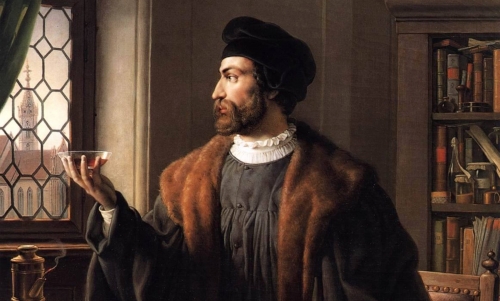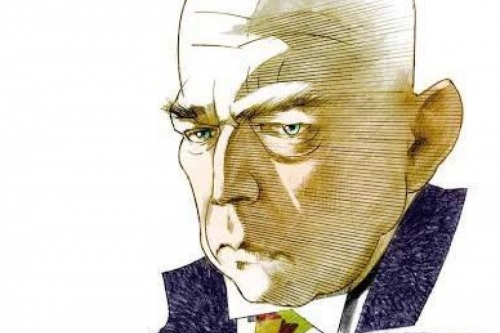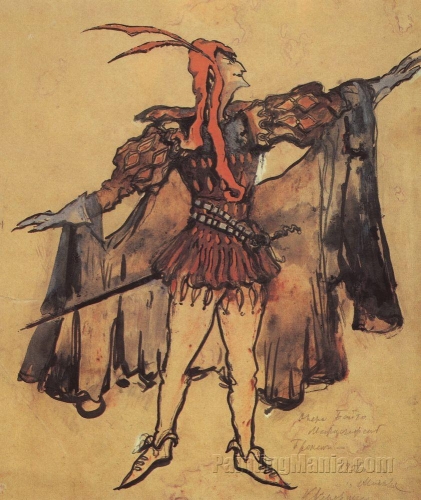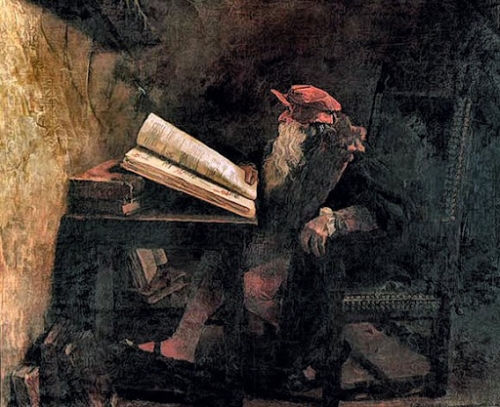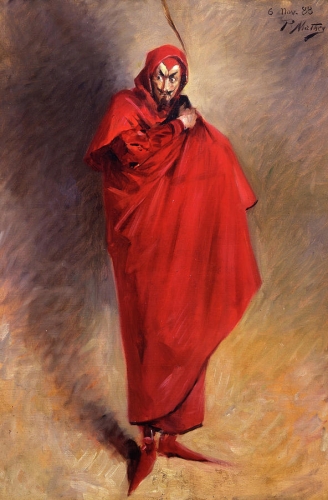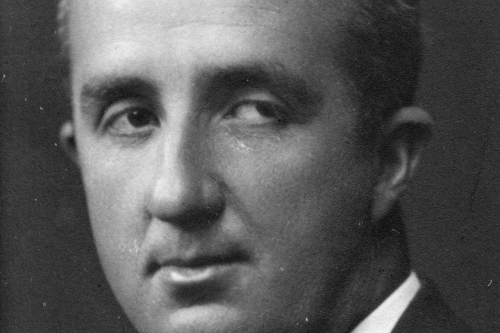
Pierre Daye, un esthète dans la tourmente
par Christophe Dolbeau
Lorsque le 28 février 1960, le très discret Pierre Daye s’est éteint à Buenos-Aires, très peu de Belges se souvenaient probablement de lui. Et pourtant ce Porteño d’adoption avait été l’un des journalistes européens les plus brillants de la première moitié du XXe siècle, ainsi qu’un protagoniste majeur de la vie politique bruxelloise d’avant-guerre. Grand reporter à la façon d’un Albert Londres, d’un Paul Morand ou d’un Henri Béraud, brillant causeur et plaisant conférencier, il avait également été député et avait même occupé des fonctions gouvernementales sous l’Occupation. Effacé de la mémoire collective comme des annales littéraires belges, ce personnage aux multiples facettes mérite amplement, 60 ans après sa disparition, de sortir du purgatoire.
Un globe-trotter
C’est dans une famille très bourgeoise de Schaerbeek, l’une des communes de Bruxelles, que Pierre Daye vient au monde le 24 juin 1892. Scolarisé chez les pères jésuites du Collège Saint-Michel, il se voit offrir, dès l’enfance, la possibilité de faire plusieurs beaux voyages. À une époque où l’on circule bien moins qu’aujourd’hui, le jeune Pierre découvre Venise (août 1901), la Bretagne et les pistes de ski de Kandersteg (1904). Il assiste même à une audience du Pape Saint Pie X. À 17 ans, il passe des vacances à Tanger (1909) puis intègre l’Institut Saint-Louis où il va suivre deux années de droit. Appelé ensuite sous les drapeaux, il se trouve donc fin prêt, en juillet 1914, pour répondre à la mobilisation générale. Le jeune homme prend part aux batailles de Namur, d’Anvers et de l’Yser, puis son goût pour l’exotisme le conduit à se porter volontaire pour rejoindre, en Afrique, les troupes du général Charles Tombeur (1867-1947). Ces unités (la Force publique congolaise) se battent contre le célèbre général allemand Paul Emil von Lettow-Vorbeck (1870-1964). Mitrailleur, Pierre Daye participe à la prise de Tabora (19 septembre 1916), le principal fait d’armes des bataillons belges. Il consacrera plus tard un livre à cette épopée tropicale (1). Promu officier mais sévèrement atteint par la malaria, il est alors rapatrié en Europe. Au terme de sa convalescence, le conflit n’est pas achevé, ce qui lui vaut d’effectuer encore une dernière mission, nettement moins périlleuse celle-là : assurer, à Washington, la promotion de la Belgique, en qualité d’attaché militaire adjoint. C’est à ce titre qu’il est reçu, en décembre 1918, par le président cubain García Menocal (1866-1941). De son séjour américain, il tirera matière à un livre, Sam ou le voyage dans l’optimiste Amérique, qui paraîtra en 1922.
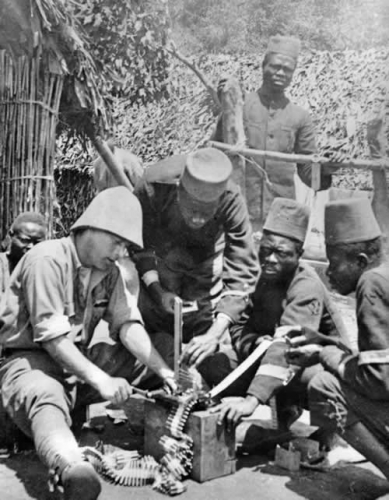
Pierre Daye, officier de la "Force publique" congolaise.
Rendu à la vie civile en 1919, Pierre Daye s’intéresse dès lors aux joutes politiques. Membre de la Ligue de la Renaissance nationale, où il côtoie Pierre Nothomb (2), l’aviateur Edmond Thieffry (3) et le peintre Delville (4), il en est candidat suppléant lors des élections de novembre 1919. On le trouve ensuite au Comité de politique nationale, un groupe qui milite, sous la houlette de Pierre Nothomb, pour « la plus grande Belgique », et il collabore à l’hebdomadaire La Politique (1921). Très sédentaire, cette activité n’est toutefois pas à même de le retenir bien longtemps car, au fond, sa véritable passion, ce sont les voyages. Dès 1922, il embarque donc sur l’Élisabethville et repart pour l’Afrique : durant plusieurs mois, il sillonne le Congo, en voiture, en train, à pied ou en « typoï » (chaise à porteurs), et navigue sur le lac Tanganyika. Puis, avant de rentrer en métropole, il fait un crochet par l’Union sud-africaine où il s’entretient avec le Premier ministre Jan Smuts.
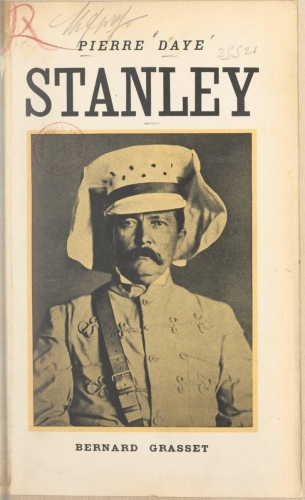 Embauché comme reporter par le grand quotidien Le Soir, il va désormais multiplier les expéditions les plus lointaines et les entrevues exclusives. En une quinzaine d’années, ses pérégrinations vont l’emmener aux quatre coins de l’univers et lui permettre de rencontrer un nombre incroyable de personnalités de premier plan. Après le Congo (où il retournera plusieurs fois), Pierre Daye visite ainsi le Maroc, où il s’entretient avec le sultan Moulay Youssef (1881-1927), les Balkans, où il est reçu par le Premier ministre bulgare Alexandre Tsankov (1879-1959), et l’Argentine, où il se rend, en 1925, en faisant le subrécargue sur un modeste cargo. Après Buenos-Aires, où il se lie avec l’écrivain nationaliste Leopoldo Lugones (1874-1938), il traverse la Cordillière des Andes et découvre le Chili, puis se rend en Uruguay et au Brésil. En 1926, il est à Moscou, approche Léon Trotsky, Leonid Krassine (5) et Maxime Litvinov (6), puis passe par la Pologne et s’y entretient avec Sikorski (7), avant de regagner Bruxelles pour y faire rapport au roi Albert Ier. D’autres expéditions le conduisent en Angola, en Nubie mais aussi au Maroc espagnol, où il rencontre le général Primo de Rivera, et en Asie qu’il visite en qualité de chargé de mission. Après une escale à Ceylan, il passe par les Indes britanniques, la Malaisie, Sumatra, le Japon, la Chine et la Mandchourie. Dans l’Empire du Milieu, il va voir les tombes des Mings, rencontre Pou-yi (8) et obtient une entrevue avec le président Tchang Tso-lin (9). D’une curiosité insatiable, Pierre Daye effectue ensuite un tour du monde par les îles, périple original qui le conduit au Cap Vert, aux Antilles, à Panama, à Tahiti, aux îles Fidji, aux Nouvelles-Hébrides, en Nouvelle-Calédonie, en Australie et à Java. Il va sans dire que toutes ces étapes donnent naissance à autant d’articles ou de livres captivants (10). Notre impénitent voyageur connaît également bien Constantinople et le Moyen-Orient. Passé par la Syrie, la Palestine et Jérusalem, il séjourne assez longuement en Égypte (1931), ce qui lui permet de visiter Memphis (avec le peintre Herman Richir), Thèbes, Abou Simbel et le temple d’Edfou.
Embauché comme reporter par le grand quotidien Le Soir, il va désormais multiplier les expéditions les plus lointaines et les entrevues exclusives. En une quinzaine d’années, ses pérégrinations vont l’emmener aux quatre coins de l’univers et lui permettre de rencontrer un nombre incroyable de personnalités de premier plan. Après le Congo (où il retournera plusieurs fois), Pierre Daye visite ainsi le Maroc, où il s’entretient avec le sultan Moulay Youssef (1881-1927), les Balkans, où il est reçu par le Premier ministre bulgare Alexandre Tsankov (1879-1959), et l’Argentine, où il se rend, en 1925, en faisant le subrécargue sur un modeste cargo. Après Buenos-Aires, où il se lie avec l’écrivain nationaliste Leopoldo Lugones (1874-1938), il traverse la Cordillière des Andes et découvre le Chili, puis se rend en Uruguay et au Brésil. En 1926, il est à Moscou, approche Léon Trotsky, Leonid Krassine (5) et Maxime Litvinov (6), puis passe par la Pologne et s’y entretient avec Sikorski (7), avant de regagner Bruxelles pour y faire rapport au roi Albert Ier. D’autres expéditions le conduisent en Angola, en Nubie mais aussi au Maroc espagnol, où il rencontre le général Primo de Rivera, et en Asie qu’il visite en qualité de chargé de mission. Après une escale à Ceylan, il passe par les Indes britanniques, la Malaisie, Sumatra, le Japon, la Chine et la Mandchourie. Dans l’Empire du Milieu, il va voir les tombes des Mings, rencontre Pou-yi (8) et obtient une entrevue avec le président Tchang Tso-lin (9). D’une curiosité insatiable, Pierre Daye effectue ensuite un tour du monde par les îles, périple original qui le conduit au Cap Vert, aux Antilles, à Panama, à Tahiti, aux îles Fidji, aux Nouvelles-Hébrides, en Nouvelle-Calédonie, en Australie et à Java. Il va sans dire que toutes ces étapes donnent naissance à autant d’articles ou de livres captivants (10). Notre impénitent voyageur connaît également bien Constantinople et le Moyen-Orient. Passé par la Syrie, la Palestine et Jérusalem, il séjourne assez longuement en Égypte (1931), ce qui lui permet de visiter Memphis (avec le peintre Herman Richir), Thèbes, Abou Simbel et le temple d’Edfou.
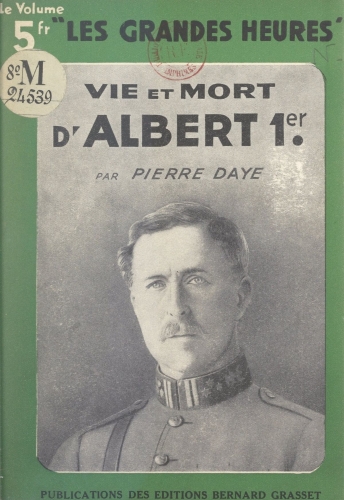 Ajoutons encore à la liste de ses voyages mémorables, la traversée de la Sibérie par 30° au-dessous de zéro, et un séjour en Perse qui lui offre l’occasion de converser avec Reza Chah Pahlavi. Son goût affirmé pour les contrées lointaines ne l’empêche pas d’apprécier aussi les découvertes européennes. Angleterre, Portugal, Italie, Autriche, Hongrie et pays scandinaves n’ont guère de secrets pour lui ; en août 1932, il est même en Lituanie, à Nida, où l’a invité Thomas Mann, tandis qu’en 1935, il visite les Pays-Bas et l’Allemagne en compagnie de Pierre Gaxotte. À Berlin, les deux hommes auront l’occasion d’échanger quelques propos avec Ribbentrop et Otto Abetz. Aventurier dans l’âme, Pierre Daye ne se contente pas de flâner nonchalamment mais il n’hésite pas, le cas échéant, à se rendre sur le théâtre de certains conflits : on le verra par exemple, en pleine guerre civile espagnole, faire la tournée des lignes de front avec Gaxotte et José Félix de Lequerica (11).
Ajoutons encore à la liste de ses voyages mémorables, la traversée de la Sibérie par 30° au-dessous de zéro, et un séjour en Perse qui lui offre l’occasion de converser avec Reza Chah Pahlavi. Son goût affirmé pour les contrées lointaines ne l’empêche pas d’apprécier aussi les découvertes européennes. Angleterre, Portugal, Italie, Autriche, Hongrie et pays scandinaves n’ont guère de secrets pour lui ; en août 1932, il est même en Lituanie, à Nida, où l’a invité Thomas Mann, tandis qu’en 1935, il visite les Pays-Bas et l’Allemagne en compagnie de Pierre Gaxotte. À Berlin, les deux hommes auront l’occasion d’échanger quelques propos avec Ribbentrop et Otto Abetz. Aventurier dans l’âme, Pierre Daye ne se contente pas de flâner nonchalamment mais il n’hésite pas, le cas échéant, à se rendre sur le théâtre de certains conflits : on le verra par exemple, en pleine guerre civile espagnole, faire la tournée des lignes de front avec Gaxotte et José Félix de Lequerica (11).
Un homme du monde
Chroniqueur réputé et homme du monde, Pierre Daye est également un habitué des dîners en ville où ses commensaux sont généralement des personnes de qualité. On l’apercevra ainsi à la table du maréchal Joffre ou à celle de Raymond Poincaré. Ami de Pierre Gaxotte (qui le fera bientôt entrer à Je suis partout), il est également lié au poète Éric de Haulleville, à Pierre Drieu la Rochelle, Maurice Mæterlinck et Georges Remi (Hergé). Sa popularité de journaliste et ses talents de causeur en font par ailleurs l’un des hôtes les plus réguliers des salons à la mode de la capitale belge. Membre assidu du très chic Cercle Gaulois, que fréquentent André Tardieu, Paul Claudel ou Pierre Benoit, il est aussi l’un des convives attitrés des dîners que donne Isabelle Errera (Goldschmidt), des soirées de prestige qu’organise Madame Jules Destrée, ou encore des réunions qu’orchestre la belle Lucienne Didier (Bauwens). Très éclectiques, ces rendez-vous accueillent aussi bien des notables de gauche, comme Henri De Man (12) et Paul-Henri Spaak (13), que des intellectuels de droite, comme Louis Carette (le futur Félicien Marceau), Brasillach, Montherlant et Fabre-Luce, ou des penseurs indépendants, comme Emmanuel Mounier (14). Dans les années 1930, il n’est pas excessif de dire que Daye est un homme arrivé. Un peu sarcastique, Jean-Léo le présente ainsi : « Grand bourgeois catholique, un peu précieux, toujours habillé avec recherche (sauf quand il pratique le nudisme), il affectionne les cravates club et ne fume que des ‘Abdalla’ à bout doré » (15). « Gentleman globe-trotter », précise-t-il encore, « habitué des sleepings, des paquebots, des palaces et des restaurants quatre étoiles (…) il est un peu boudé par la bonne société qui lui reproche ‘des mœurs dissolues’ (L’expression, à une époque où l’on ne s’éclate pas encore dans les Gay pride, désigne son homosexualité que Marcel Antoine, dans ses caricatures, suggère en le représentant jouant du bilboquet » (16). Confirmant ce portrait, l’historien Jean-Michel Etienne ajoute que l’homme est sans conteste intelligent et bon connaisseur des milieux diplomatiques belges et étrangers (17).
Disons aussi que si Pierre Daye est effectivement familier de la haute société, il ne succombe jamais à ce miroir aux alouettes qu’il observe un peu comme une sorte d’entomologiste. Parlant des « gens du monde », voici d’ailleurs ce qu’il en dit : « … vains, souvent paresseux, certains ont pour excuse sinon leur fortune, tout au moins leur culture ou leur goût, qui sont parfois réels. Snobs, comme on dit, ils se nourrissent néanmoins d’idées toutes faites, à condition qu’elles soient à la mode (…) On trouve chez eux, souvent, de l’élégance extérieure, du brillant, du charme, ce que l’on a appelé la douceur de vivre, et parfois du comique involontaire. C’est pourquoi je les ai beaucoup fréquentés, et ils m’ont beaucoup amusé. À condition de les juger pour ce qu’ils sont et de ne rien leur demander, les gens du monde apparaissent d’un utile et agréable commerce pour un célibataire qui se pique d’être en même temps un observateur professionnel » (18)
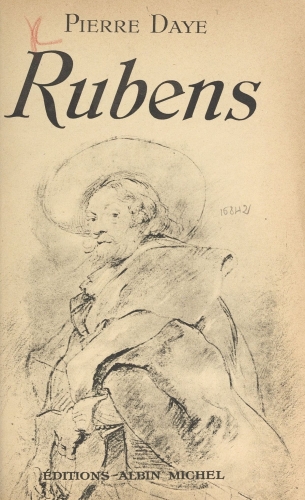 Au demeurant, il serait injuste et inexact de ne voir en Pierre Daye qu’un voyageur nanti et un mondain frivole : il s’agit aussi et surtout d’un écrivain talentueux dont les nombreux livres se vendent très bien. Auteur de multiples récits de voyage (19), il a également consacré plusieurs ouvrages aux souverains belges (20), ainsi que plusieurs essais à l’Afrique (21). Dans la première partie de sa vie, il a, en revanche, peu abordé la politique dans ses livres, et lorsqu’il l’a fait, ce fut plutôt sous l’angle de la politique étrangère (22). Il s’est par ailleurs peu intéressé à la fiction, sinon sous la forme de quelques nouvelles et contes. L’un de ceux-ci, Daïnah, la métisse (1932), sera même adapté au cinéma par Jean Grémillon (avec Charles Vanel dans l’un des rôles principaux).
Au demeurant, il serait injuste et inexact de ne voir en Pierre Daye qu’un voyageur nanti et un mondain frivole : il s’agit aussi et surtout d’un écrivain talentueux dont les nombreux livres se vendent très bien. Auteur de multiples récits de voyage (19), il a également consacré plusieurs ouvrages aux souverains belges (20), ainsi que plusieurs essais à l’Afrique (21). Dans la première partie de sa vie, il a, en revanche, peu abordé la politique dans ses livres, et lorsqu’il l’a fait, ce fut plutôt sous l’angle de la politique étrangère (22). Il s’est par ailleurs peu intéressé à la fiction, sinon sous la forme de quelques nouvelles et contes. L’un de ceux-ci, Daïnah, la métisse (1932), sera même adapté au cinéma par Jean Grémillon (avec Charles Vanel dans l’un des rôles principaux).
Député rexiste
Dans les années 1930, la politique, qu’il avait autrefois délaissée au profit des voyages, l’attire de nouveau. Secrétaire du socialiste Jules Destrée, Daye se refuse toutefois à rallier le Parti Ouvrier Belge (POB). En fait, il se range parmi les conservateurs « éclairés » : membre (depuis 1926) de l’Union paneuropéenne, il se montre sensible aux questions sociales, mais à la façon des catholiques, et reste très fidèle au roi comme à l’unité nationale. Partisan de la colonisation et hostile à une émancipation rapide du Congo, il n’est cependant absolument pas raciste et ne témoigne d’aucune hostilité de principe à l’égard des Noirs. Dès 1921 et dans un article consacré au mouvement « pan-nègre » (23), il souligne qu’ « il serait vain de croire que la suprématie de la race blanche pourra se maintenir intacte », proclame que « les préjugés de race sont absurdes » et s’affirme partisan « des généreuses idées de collaboration des races ». À propos des Africains, il déclare : « Nous sommes les premiers à vouloir que le sort de la race noire soit amélioré ; que là où des abus existent, ils soient redressés ; que l’on s’occupe de l’éducation, de la formation intellectuelle et – par après – de la liberté des nègres. Mais il faut procéder avec ordre ». Car, ajoute-t-il, « il nous faut veiller à ce qu’au nom de principes sentimentaux, on n’aille pas saper notre autorité en Afrique ». Si nous insistons quelque peu sur ces opinions, disons paternalistes, de Pierre Daye, c’est afin de mieux souligner toute l’absurdité qu’il y a à le qualifier de « nazi » comme d’aucuns le feront un jour…
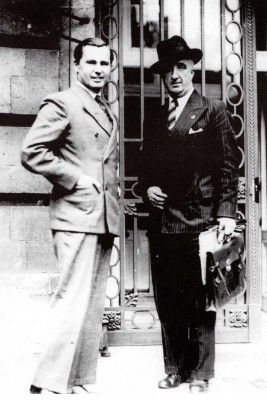 Désireux de descendre dans l’arène pour y défendre ses idées catholiques, sociales et nationales, Pierre Daye découvre en 1935 le nouveau phénomène politique qu’est Léon Degrelle. Le 24 janvier, il le voit, pour la première fois, à Louvain où le jeune orateur l’impressionne beaucoup. « J’attendais depuis plusieurs années », racontera-t-il, « que se manifestât dans mon pays un effet de ce grand mouvement européen dont j’avais découvert en tant de nations les signes tangibles » (24). Séduit, l’écrivain n’est pas long à rejoindre les rangs de Rex où il siège d’emblée au Conseil politique (mais pas au Bureau exécutif). Aux élections du 24 mai 1936, le mouvement, qui a le vent en poupe, obtient du premier coup 33 élus (21 députés et 12 sénateurs). « Nous étions partis, nous pouvons bien le dire », se souvient-il, « sans aucun moyen ; nous n’avions pas d’argent, aucune expérience, très peu d’hommes, pas de journaux. Mais nous avions la foi. Et la jeunesse aussi… » (25). Et le 27 mai, dans les colonnes du Pays réel, le nouveau député bruxellois se montre plus laudatif encore, affirmant entre autres que « Léon Degrelle est devenu l’interprète de tout ce qui, dans la nation, est jeune, vivant, audacieux, tourné vers l’avenir » (26). L’Assemblée que découvre Pierre Daye n’a rien de bien attrayant : selon lui, « les trucs, les combinaisons, l’intérêt personnel, la stérilité, la suffisance, la vulgarité, tels étaient quelques-uns des traits que révélait l’examen de l’institution parlementaire » (27). Il semble néanmoins tout à fait décidé à jouer le jeu et à faire sérieusement son travail de député. Placé à la tête du groupe parlementaire, il s’efforce donc, en premier lieu, de discipliner ses collègues rexistes qui font souvent preuve d’une nonchalance et d’un amateurisme consternants. Auteur d’un projet de loi réduisant la durée du service militaire, il s’exprime aussi au sein de la Commission des Colonies et de celle des Affaires Étrangères où il plaide fougueusement pour l’Espagne nationaliste. Assez proche du chef, il est souvent associé aux grandes manœuvres de ce dernier. En septembre 1936, par exemple, il est aux côtés de Degrelle lorsque celui-ci est reçu par Hitler (invité par Rudolf Hess, il profite du déplacement pour assister au 8e congrès de Nuremberg). C’est par ailleurs autour de la table de Pierre Daye que se nouent certains contacts discrets entre des gens comme Gustave Sap (28), Hendrik Borginon (29), Gérard Romsée (30), Joris van Severen (31), Charles-Albert d’Aspremont-Lynden (32), et Léon Degrelle. Plus tard, et au grand dam du Quai d’Orsay, il demandera la dénonciation de l’accord militaire franco-belge, ainsi que des accords de Locarno (33).
Désireux de descendre dans l’arène pour y défendre ses idées catholiques, sociales et nationales, Pierre Daye découvre en 1935 le nouveau phénomène politique qu’est Léon Degrelle. Le 24 janvier, il le voit, pour la première fois, à Louvain où le jeune orateur l’impressionne beaucoup. « J’attendais depuis plusieurs années », racontera-t-il, « que se manifestât dans mon pays un effet de ce grand mouvement européen dont j’avais découvert en tant de nations les signes tangibles » (24). Séduit, l’écrivain n’est pas long à rejoindre les rangs de Rex où il siège d’emblée au Conseil politique (mais pas au Bureau exécutif). Aux élections du 24 mai 1936, le mouvement, qui a le vent en poupe, obtient du premier coup 33 élus (21 députés et 12 sénateurs). « Nous étions partis, nous pouvons bien le dire », se souvient-il, « sans aucun moyen ; nous n’avions pas d’argent, aucune expérience, très peu d’hommes, pas de journaux. Mais nous avions la foi. Et la jeunesse aussi… » (25). Et le 27 mai, dans les colonnes du Pays réel, le nouveau député bruxellois se montre plus laudatif encore, affirmant entre autres que « Léon Degrelle est devenu l’interprète de tout ce qui, dans la nation, est jeune, vivant, audacieux, tourné vers l’avenir » (26). L’Assemblée que découvre Pierre Daye n’a rien de bien attrayant : selon lui, « les trucs, les combinaisons, l’intérêt personnel, la stérilité, la suffisance, la vulgarité, tels étaient quelques-uns des traits que révélait l’examen de l’institution parlementaire » (27). Il semble néanmoins tout à fait décidé à jouer le jeu et à faire sérieusement son travail de député. Placé à la tête du groupe parlementaire, il s’efforce donc, en premier lieu, de discipliner ses collègues rexistes qui font souvent preuve d’une nonchalance et d’un amateurisme consternants. Auteur d’un projet de loi réduisant la durée du service militaire, il s’exprime aussi au sein de la Commission des Colonies et de celle des Affaires Étrangères où il plaide fougueusement pour l’Espagne nationaliste. Assez proche du chef, il est souvent associé aux grandes manœuvres de ce dernier. En septembre 1936, par exemple, il est aux côtés de Degrelle lorsque celui-ci est reçu par Hitler (invité par Rudolf Hess, il profite du déplacement pour assister au 8e congrès de Nuremberg). C’est par ailleurs autour de la table de Pierre Daye que se nouent certains contacts discrets entre des gens comme Gustave Sap (28), Hendrik Borginon (29), Gérard Romsée (30), Joris van Severen (31), Charles-Albert d’Aspremont-Lynden (32), et Léon Degrelle. Plus tard, et au grand dam du Quai d’Orsay, il demandera la dénonciation de l’accord militaire franco-belge, ainsi que des accords de Locarno (33).
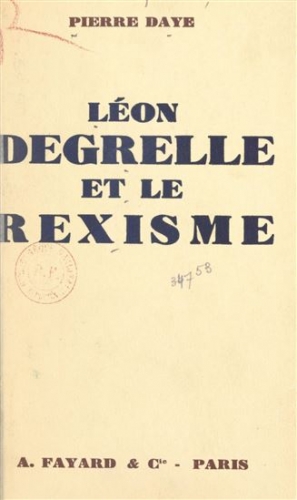 Dévoué mais exigeant, Pierre Daye va vite se lasser des carences profondes du groupe parlementaire rexiste dont il abandonne d’ailleurs la présidence dès juin 1937. Cela ne l’empêche cependant pas de continuer son travail à la Chambre. Dans le même temps, il poursuit son activité de chroniqueur et d’essayiste. En octobre 1936, il joue un rôle clef dans la parution d’un numéro spécial de Je suis partout entièrement consacré à Rex, avec une « Lettre aux Français » de Léon Degrelle et des articles de Serge Doring, Carlos Leruitte et Lucien Rebatet [La même année, Robert Brasillach fait paraître Léon Degrelle et l’avenir de Rex (Plon) et l’année suivante (3 novembre 1937), il dédiera toute une page de Je suis partout au mouvement belge]. Régulièrement présent dans les colonnes de l’hebdomadaire parisien, Pierre Daye signe également, en 1937, un livre sur Léon Degrelle et le rexisme (Fayard), suivi en 1938 d’une Petite histoire parlementaire belge. Malgré cet engagement sans faille, les erreurs répétées de Rex et de son chef finissent toutefois par user sa patience. Ce désenchantement le conduit même, en 1939, à refuser de se représenter aux élections et à quitter le mouvement. Le 10 mars, il prend donc définitivement congé du groupe parlementaire et se tourne dès lors vers le parti catholique où il a conservé nombre d’amis. Il s’en va, certes, mais demeure en excellents termes avec Degrelle, ce que la suite des événements ne va pas tarder à démontrer.
Dévoué mais exigeant, Pierre Daye va vite se lasser des carences profondes du groupe parlementaire rexiste dont il abandonne d’ailleurs la présidence dès juin 1937. Cela ne l’empêche cependant pas de continuer son travail à la Chambre. Dans le même temps, il poursuit son activité de chroniqueur et d’essayiste. En octobre 1936, il joue un rôle clef dans la parution d’un numéro spécial de Je suis partout entièrement consacré à Rex, avec une « Lettre aux Français » de Léon Degrelle et des articles de Serge Doring, Carlos Leruitte et Lucien Rebatet [La même année, Robert Brasillach fait paraître Léon Degrelle et l’avenir de Rex (Plon) et l’année suivante (3 novembre 1937), il dédiera toute une page de Je suis partout au mouvement belge]. Régulièrement présent dans les colonnes de l’hebdomadaire parisien, Pierre Daye signe également, en 1937, un livre sur Léon Degrelle et le rexisme (Fayard), suivi en 1938 d’une Petite histoire parlementaire belge. Malgré cet engagement sans faille, les erreurs répétées de Rex et de son chef finissent toutefois par user sa patience. Ce désenchantement le conduit même, en 1939, à refuser de se représenter aux élections et à quitter le mouvement. Le 10 mars, il prend donc définitivement congé du groupe parlementaire et se tourne dès lors vers le parti catholique où il a conservé nombre d’amis. Il s’en va, certes, mais demeure en excellents termes avec Degrelle, ce que la suite des événements ne va pas tarder à démontrer.
La catastrophe de 1940
À nouveau libre de ses initiatives et très hostile à l’idée d’un nouveau conflit avec l’Allemagne, Pierre Daye s’associe, le 23 septembre 1939, au manifeste des intellectuels (34) « pour la neutralité belge, contre l’éternisation de la guerre européenne et pour la défense des valeurs de l’esprit ». Le texte paraît le 29 septembre dans la Revue catholique des idées et des faits, puis dans Cassandre, le Pays réel, les Cahiers franco-allemands, et ses treize signataires se voient aussitôt interdire l’accès au territoire français. En décembre, Daye rejoint Robert Poulet, Hergé, Gaston Derijcke (Claude Elsen) et Raymond De Becker, au nouvel hebdomadaire L’Ouest qui se veut le prolongement du manifeste. La France, la Grande-Bretagne et l’Allemagne étant entrées en guerre le 3 septembre, la situation devient dès lors chaotique en Belgique où partis politiques et ministres ne parviennent pas à faire des choix clairs et consensuels.
Et puis survient soudain le cataclysme, avec l’attaque allemande du 10 mai 1940 et la débandade quasi immédiate du gouvernement belge. Avant de filer vers Paris, Poitiers, Limoges ou Vichy, les autorités ont tout de même fait appréhender tous ceux qu’elles soupçonnent – à tort le plus souvent – d’appartenir à la cinquième colonne. Averti de l’arrestation de nombre de ses amis mais épargné par la première rafle, Pierre Daye juge dès lors prudent de s’éloigner au plus vite de Bruxelles. Accompagné de son neveu, Jacques Lesigne, il part donc, le 12 mai, pour La Panne, dans le but de trouver asile en France. Refoulé car il ne possède pas les visas nécessaires, il parvient cependant, le 14 mai, à franchir la frontière à Poperinghe et à filer vers Eu. Après une étape de cinq jours à Lisieux, il reprend la route, le 20 mai, traverse Nantes et atteint La Rochelle où son ami Pierre Bonardi (35) lui offre le vivre et le couvert. Le 24 mai, il pousse encore jusqu’à la périphérie de Bordeaux, laisse son neveu à Libourne, puis rebrousse chemin et regagne La Rochelle où les Bonardi le dirigent vers l’île de Ré où ils possèdent un moulin.
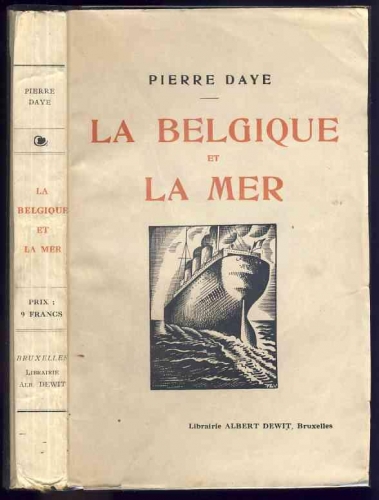 Daye va donc séjourner plusieurs semaines à Saint-Clément-des-Baleines. Loin des combats, il fait de la bicyclette, se balade avec Henri Béraud et aperçoit de temps en temps Suzy Solidor ou le peintre Paul Colin. Cette paisible villégiature s’achève toutefois vers la fin juin car avec l’armistice, le journaliste souhaite désormais rentrer chez lui. Le 8 juillet 1940, il remonte donc sur Paris, s’y arrête le temps de voir Jean Chiappe, puis regagne Bruxelles. Informé du massacre d’Abbeville (36) et du décès de Léon Degrelle, le journaliste ne tarde pas à réapparaître à Paris où l’ambassadeur Abetz, une vieille connaissance, lui apprend incidemment que Degrelle n’est absolument pas mort, mais probablement interné dans un camp du sud de la France. En dépit des divergences politiques qui ont pu opposer les deux hommes, Daye estime alors de son devoir de se porter au secours du chef de Rex et part aussitôt à sa recherche. Accompagné de Jacques Crokaert et Carl Doutreligne, il file à Vichy, rencontre Adrien Marquet mais aussi plusieurs ministres belges en déréliction… L’administration française n’ayant pas mis longtemps à localiser Degrelle qui se trouve dans l’Ariège, au camp du Vernet, le trio de sauveteurs (« mes trois mousquetaires » dira Degrelle dans La cohue de 40) s’empresse de reprendre la route. Quelques heures plus tard, ils sont à Carcassonne où ils retrouvent enfin Léon Degrelle, « sale, amaigri, méconnaissable » (37), ainsi que l’ex-député rexiste Gustave Wyns.
Daye va donc séjourner plusieurs semaines à Saint-Clément-des-Baleines. Loin des combats, il fait de la bicyclette, se balade avec Henri Béraud et aperçoit de temps en temps Suzy Solidor ou le peintre Paul Colin. Cette paisible villégiature s’achève toutefois vers la fin juin car avec l’armistice, le journaliste souhaite désormais rentrer chez lui. Le 8 juillet 1940, il remonte donc sur Paris, s’y arrête le temps de voir Jean Chiappe, puis regagne Bruxelles. Informé du massacre d’Abbeville (36) et du décès de Léon Degrelle, le journaliste ne tarde pas à réapparaître à Paris où l’ambassadeur Abetz, une vieille connaissance, lui apprend incidemment que Degrelle n’est absolument pas mort, mais probablement interné dans un camp du sud de la France. En dépit des divergences politiques qui ont pu opposer les deux hommes, Daye estime alors de son devoir de se porter au secours du chef de Rex et part aussitôt à sa recherche. Accompagné de Jacques Crokaert et Carl Doutreligne, il file à Vichy, rencontre Adrien Marquet mais aussi plusieurs ministres belges en déréliction… L’administration française n’ayant pas mis longtemps à localiser Degrelle qui se trouve dans l’Ariège, au camp du Vernet, le trio de sauveteurs (« mes trois mousquetaires » dira Degrelle dans La cohue de 40) s’empresse de reprendre la route. Quelques heures plus tard, ils sont à Carcassonne où ils retrouvent enfin Léon Degrelle, « sale, amaigri, méconnaissable » (37), ainsi que l’ex-député rexiste Gustave Wyns.
Au cœur des intrigues
La petite troupe ne s’attarde pas dans l’Aude et remonte aussitôt vers Paris où une brève escale permet à Degrelle de remercier Abetz et de s’entretenir avec Fernand de Brinon. De retour à Bruxelles le 30 août, Pierre Daye reçoit bientôt la visite du comte Robert Capelle auquel il relate la triste épopée de Degrelle. À cette occasion, le secrétaire du roi lui fait part de la position circonspecte et réservée du souverain, et lui conseille de collaborer à la presse. « Le patriotisme », énonce-t-il, « commande que les patriotes s’emparent des journaux, au lieu de les laisser à d’autres » (38). Là-dessus, Daye effectue un nouveau séjour à Paris, sa terre d’élection. Le 7 août 1940, il présente Degrelle à Pierre Laval, puis déjeune avec Bertrand de Jouvenel, et dîne un soir avec Abetz, Degrelle et Henri de Man. Le 12 août, enfin, il est chez le comte de Beaumont où il passe la soirée en compagnie de Pierre Drieu la Rochelle, avant de regagner Bruxelles.
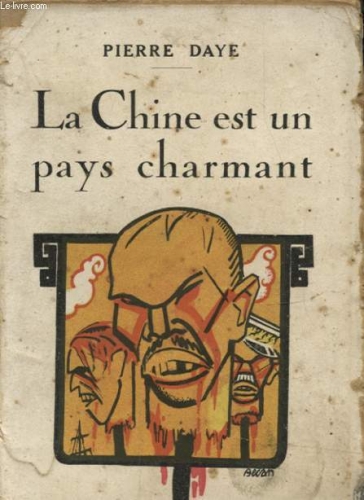 Loin d’être le pestiféré qu’il deviendra bientôt, Pierre Daye conserve en cette époque troublée de nombreuses relations mondaines : il organise, chez lui, une rencontre entre le comte Capelle et le chef de Rex, dîne avec les frères Heymans (dont l’un, Corneille, est prix Nobel) et séjourne au Zoute, chez le banquier Wauters. Invité chez le vicomte Jacques Duvignon, ancien ambassadeur à Berlin, il revoit également Mme Destrée et Robert Poulet, tandis que lors d’un enième séjour à Paris, il croise Alphonse de Chateaubriant (qui l’accueille dans les locaux de La Gerbe), Bernard Grasset, l’historien Pierre Bessand-Massenet et Stanislas de la Rochefoucauld. Si, en dépit des circonstances, Pierre Daye est quelqu’un qui demeure attaché aux petits plaisirs de la vie et aux relations sociales, il serait erroné de ne voir en lui qu’un second couteau falot et superficiel. En fait, il sert de passerelle entre beaucoup d’acteurs importants du jeu politico-diplomatique et maintient notamment d’étroits contacts avec les proches du roi. En relation avec les secrétaires du souverain, il voit aussi, très régulièrement, les anciens ministres Maurice Lippens et Henri De Man, ainsi que le général Van Overstræten, aide-de-camp de Léopold III. Pour le palais royal, Daye est donc une précieuse source de renseignements : « Je servis bien souvent d’informateur au souverain », écrit-il, « et le bloc-notes en main, le comte Capelle prenait des indications ‘pour sa Majesté’ durant la plupart de nos entretiens » (39). Il facilite par ailleurs certains contacts improbables comme cette entrevue, chez lui, le 22 mai 1943, entre Capelle et l’abbé Louis Fierens, l’aumônier (non rexiste) de la Légion Wallonie… Aucun reproche, explicite ou implicite, ne lui ayant jamais été exprimé, le journaliste s’étonnera plus tard des accusations de félonie formulées à son encontre : « Pouvais-je n’être pas convaincu », demande-t-il dans ses mémoires, « après tous mes rapports plus ou moins directs avec lui (le roi), par l’intermédiaire de son entourage, que ma conduite était approuvée ? Ou que tout au moins, elle n’était pas blamée ? » (40). Et pour être encore plus clair, il ajoute : « Si des ‘collaborationnistes’ sincères se trompaient, Léopold III aurait dû les avertir, ou les faire avertir, même au risque de déplaire aux Allemands » (41).
Loin d’être le pestiféré qu’il deviendra bientôt, Pierre Daye conserve en cette époque troublée de nombreuses relations mondaines : il organise, chez lui, une rencontre entre le comte Capelle et le chef de Rex, dîne avec les frères Heymans (dont l’un, Corneille, est prix Nobel) et séjourne au Zoute, chez le banquier Wauters. Invité chez le vicomte Jacques Duvignon, ancien ambassadeur à Berlin, il revoit également Mme Destrée et Robert Poulet, tandis que lors d’un enième séjour à Paris, il croise Alphonse de Chateaubriant (qui l’accueille dans les locaux de La Gerbe), Bernard Grasset, l’historien Pierre Bessand-Massenet et Stanislas de la Rochefoucauld. Si, en dépit des circonstances, Pierre Daye est quelqu’un qui demeure attaché aux petits plaisirs de la vie et aux relations sociales, il serait erroné de ne voir en lui qu’un second couteau falot et superficiel. En fait, il sert de passerelle entre beaucoup d’acteurs importants du jeu politico-diplomatique et maintient notamment d’étroits contacts avec les proches du roi. En relation avec les secrétaires du souverain, il voit aussi, très régulièrement, les anciens ministres Maurice Lippens et Henri De Man, ainsi que le général Van Overstræten, aide-de-camp de Léopold III. Pour le palais royal, Daye est donc une précieuse source de renseignements : « Je servis bien souvent d’informateur au souverain », écrit-il, « et le bloc-notes en main, le comte Capelle prenait des indications ‘pour sa Majesté’ durant la plupart de nos entretiens » (39). Il facilite par ailleurs certains contacts improbables comme cette entrevue, chez lui, le 22 mai 1943, entre Capelle et l’abbé Louis Fierens, l’aumônier (non rexiste) de la Légion Wallonie… Aucun reproche, explicite ou implicite, ne lui ayant jamais été exprimé, le journaliste s’étonnera plus tard des accusations de félonie formulées à son encontre : « Pouvais-je n’être pas convaincu », demande-t-il dans ses mémoires, « après tous mes rapports plus ou moins directs avec lui (le roi), par l’intermédiaire de son entourage, que ma conduite était approuvée ? Ou que tout au moins, elle n’était pas blamée ? » (40). Et pour être encore plus clair, il ajoute : « Si des ‘collaborationnistes’ sincères se trompaient, Léopold III aurait dû les avertir, ou les faire avertir, même au risque de déplaire aux Allemands » (41).
Engagé mais avec raison
Il faut dire que conformément aux conseils de Capelle, Pierre Daye s’engage assez nettement dans la « politique de présence » en rejoignant, à l’automne 1940, la rédaction du Nouveau Journal que lance Paul Colin, son ancien condisciple de l’Institut Saint-Louis. Déjà patron de l’hebdomadaire Cassandre, ce dernier est, selon Jean-Léo, un véritable « Frégoli polygraphe, merveilleusement à l’aise une plume à la main » (42). Rescapé du camp du Vernet, il a réuni autour de lui une équipe brillante où figurent entre autres Robert Poulet, le rédacteur en chef, Nicolas Barthélémy, Guido Eeckels, Paul Herten, Joseph Jumeau (alias Pierre Hubermont) et Paul Werrie (43). Son quotidien revendique « un esprit nouveau » et veut « montrer aux Belges que leur pays doit réclamer et prendre sa place dans l’économie continentale à l’érection de laquelle le Reich allemand – c’est un fait – consacre aujourd’hui une grande partie de son effort » (44). Partisan d’une collaboration digne et relativement modérée, il s’agit néanmoins, aux yeux des résistants et des Belges de Londres, d’un journal « emboché ».
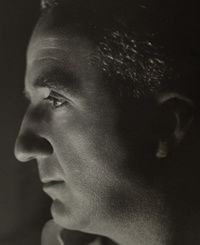 Chargé de la rubrique de politique étrangère, Pierre Daye en sera l’un des principaux chroniqueurs jusqu’en avril 1943. Le Nouveau Journal n’est pas le seul organe de presse à accueillir sa prose puisque l’on trouve également sa signature dans Junges Europa, Das Neue Europa, Europäische Revue, Signal, Actu, le Petit Parisien, Je suis partout, et qu’il s’exprime de temps à autres au micro de Radio-Bruxelles. Quoique très dense, cette activité journalistique ne l’empêche pas de publier aussi quelques nouveaux livres. En 1941, il fait ainsi paraître un essai politique, Guerre et révolution, lettre d’un Belge à un ami français, suivi d’un Rubens, puis de Par le monde qui change, un ouvrage où il évoque quelques-uns des pays qu’il a visités, décerne au passage quelques compliments au Reich pour avoir encouragé la jeunesse et amélioré la race, et décrit Adolf Hitler comme « un homme simple, très différend des hobereaux allemands d’autrefois » (45). Si l’homme de lettres ne fait pas mystère de ses sympathies, il s’abstient toutefois de franchir certaines limites : il garde notamment ses distances avec la Légion Wallonie et fait même publiquement savoir qu’il n’est jamais intervenu en sa faveur auprès du palais royal. Il admire, dit-il, le courage des volontaires mais ne comprend pas vraiment leur démarche. Très attaché à l’unité et à l’intégrité de la Belgique comme à la personne du roi, il prend grand soin de ne jamais cautionner une autre ligne que celle-là. Hostile à la persécution des Juifs comme à tout démembrement du royaume, Pierre Daye considère globalement les affaires politiques d’un œil sévère : « Trop de gens aux dents longues, trop de bonshommes intéressés. Trop de tripotages. Trop de fortunes aussi gigantesques que rapides » (46). Désireux de voir la Belgique se réorganiser sur un schéma centralisateur, monarchique et corporatif, il regroupe autour de lui un « Bureau politique », auquel prennent part ses amis Gustave Wyns et Jacques Crokaert, puis s’associe, en mai 1941, à la tentative de créer un Parti des Provinces Romanes. Ce dernier doit soutenir l’Ordre Nouveau européen, protéger la race et favoriser la fondation d’un État autoritaire, corporatif et chrétien (47). Le projet fera long feu car le 5 août 1941, les autorités allemandes y opposent leur veto. Autre geste politique de Pierre Daye : le 1er février 1943, il adhère à la Société Européenne des Écrivains (48) et plus précisément à l’une de ses deux sections belges, la Communauté Culturelle Wallonne (49). Cet engagement sans détour ne fait cependant pas de lui un fanatique ou un ultra, et c’est assez souvent, il faut le dire, qu’il intervient en faveur de certains Israélites ou de résistants (dont le communiste Albert Marteaux et le socialiste Victor Larock).
Chargé de la rubrique de politique étrangère, Pierre Daye en sera l’un des principaux chroniqueurs jusqu’en avril 1943. Le Nouveau Journal n’est pas le seul organe de presse à accueillir sa prose puisque l’on trouve également sa signature dans Junges Europa, Das Neue Europa, Europäische Revue, Signal, Actu, le Petit Parisien, Je suis partout, et qu’il s’exprime de temps à autres au micro de Radio-Bruxelles. Quoique très dense, cette activité journalistique ne l’empêche pas de publier aussi quelques nouveaux livres. En 1941, il fait ainsi paraître un essai politique, Guerre et révolution, lettre d’un Belge à un ami français, suivi d’un Rubens, puis de Par le monde qui change, un ouvrage où il évoque quelques-uns des pays qu’il a visités, décerne au passage quelques compliments au Reich pour avoir encouragé la jeunesse et amélioré la race, et décrit Adolf Hitler comme « un homme simple, très différend des hobereaux allemands d’autrefois » (45). Si l’homme de lettres ne fait pas mystère de ses sympathies, il s’abstient toutefois de franchir certaines limites : il garde notamment ses distances avec la Légion Wallonie et fait même publiquement savoir qu’il n’est jamais intervenu en sa faveur auprès du palais royal. Il admire, dit-il, le courage des volontaires mais ne comprend pas vraiment leur démarche. Très attaché à l’unité et à l’intégrité de la Belgique comme à la personne du roi, il prend grand soin de ne jamais cautionner une autre ligne que celle-là. Hostile à la persécution des Juifs comme à tout démembrement du royaume, Pierre Daye considère globalement les affaires politiques d’un œil sévère : « Trop de gens aux dents longues, trop de bonshommes intéressés. Trop de tripotages. Trop de fortunes aussi gigantesques que rapides » (46). Désireux de voir la Belgique se réorganiser sur un schéma centralisateur, monarchique et corporatif, il regroupe autour de lui un « Bureau politique », auquel prennent part ses amis Gustave Wyns et Jacques Crokaert, puis s’associe, en mai 1941, à la tentative de créer un Parti des Provinces Romanes. Ce dernier doit soutenir l’Ordre Nouveau européen, protéger la race et favoriser la fondation d’un État autoritaire, corporatif et chrétien (47). Le projet fera long feu car le 5 août 1941, les autorités allemandes y opposent leur veto. Autre geste politique de Pierre Daye : le 1er février 1943, il adhère à la Société Européenne des Écrivains (48) et plus précisément à l’une de ses deux sections belges, la Communauté Culturelle Wallonne (49). Cet engagement sans détour ne fait cependant pas de lui un fanatique ou un ultra, et c’est assez souvent, il faut le dire, qu’il intervient en faveur de certains Israélites ou de résistants (dont le communiste Albert Marteaux et le socialiste Victor Larock).
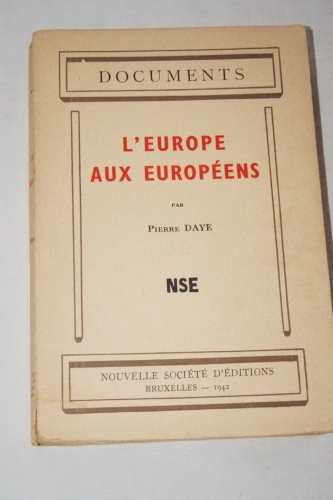 La guerre n’a pas émoussé le goût pour les voyages de Pierre Daye qui continue, dans la mesure où les événements le permettent, à se déplacer en Europe. Début 1942, il est par exemple au Portugal, puis en août en Hongrie, et séjourne, en fin d’année, à Rome. Dans la ville éternelle, il renoue avec de vieux amis, comme la duchesse de Villarosa ou le sénateur Aldobrandini Rangoni, tous très anglophiles, et s’entretient, le 10 janvier 1943, avec le prince Umberto. Quatre jours auparavant, il a pu être reçu par le Souverain Pontife, ce qui revêt pour lui une importance toute particulière. Grâce à un proche du Pape, le père jésuite Tacchi-Venturi, il a en effet obtenu de voir brièvement Sa Sainteté Pie XII qui l’a interrogé sur la situation belge et lui a donné sa bénédiction. « Ce qui m’avait le plus ému durant cette entrevue », rapporte-t-il, « c’est la grande allure du Saint-Père, son air de seigneur, la beauté de son visage ascétique et blême, avec ses yeux d’un noir brillant, sa longue bouche volontaire, son nez en bec d’aigle, la noblesse de ses gestes » (50). Peu de temps après cette promenade italienne, en février-mars 1943, Pierre Daye se rend à Madrid. N’étant inféodé à aucune faction politique, il profite de ce passage dans un pays non-belligérant pour adresser, de son propre chef, un courrier à Paul van Zeeland : « Il faut souhaiter », lui écrit-il, « que des éléments provenant des deux clans entre lesquels se divise aujourd’hui la Belgique, celui des “gens de Londres“ et celui de ceux que vous appelez, je crois, les “collaborationnistes“ (je suis pour ma part convaincu que tous deux comptent des patriotes sincères) puissent bientôt, à l’issue des hostilités, se comprendre et collaborer, autour du Roi, dans l’intérêt même de notre pays » (51). Par le biais de l’armateur Pierre Grisar, il envoie une missive du même genre à Hubert Pierlot, le chef du gouvernement belge en exil. Faut-il préciser qu’il n’obtiendra aucune réponse…
La guerre n’a pas émoussé le goût pour les voyages de Pierre Daye qui continue, dans la mesure où les événements le permettent, à se déplacer en Europe. Début 1942, il est par exemple au Portugal, puis en août en Hongrie, et séjourne, en fin d’année, à Rome. Dans la ville éternelle, il renoue avec de vieux amis, comme la duchesse de Villarosa ou le sénateur Aldobrandini Rangoni, tous très anglophiles, et s’entretient, le 10 janvier 1943, avec le prince Umberto. Quatre jours auparavant, il a pu être reçu par le Souverain Pontife, ce qui revêt pour lui une importance toute particulière. Grâce à un proche du Pape, le père jésuite Tacchi-Venturi, il a en effet obtenu de voir brièvement Sa Sainteté Pie XII qui l’a interrogé sur la situation belge et lui a donné sa bénédiction. « Ce qui m’avait le plus ému durant cette entrevue », rapporte-t-il, « c’est la grande allure du Saint-Père, son air de seigneur, la beauté de son visage ascétique et blême, avec ses yeux d’un noir brillant, sa longue bouche volontaire, son nez en bec d’aigle, la noblesse de ses gestes » (50). Peu de temps après cette promenade italienne, en février-mars 1943, Pierre Daye se rend à Madrid. N’étant inféodé à aucune faction politique, il profite de ce passage dans un pays non-belligérant pour adresser, de son propre chef, un courrier à Paul van Zeeland : « Il faut souhaiter », lui écrit-il, « que des éléments provenant des deux clans entre lesquels se divise aujourd’hui la Belgique, celui des “gens de Londres“ et celui de ceux que vous appelez, je crois, les “collaborationnistes“ (je suis pour ma part convaincu que tous deux comptent des patriotes sincères) puissent bientôt, à l’issue des hostilités, se comprendre et collaborer, autour du Roi, dans l’intérêt même de notre pays » (51). Par le biais de l’armateur Pierre Grisar, il envoie une missive du même genre à Hubert Pierlot, le chef du gouvernement belge en exil. Faut-il préciser qu’il n’obtiendra aucune réponse…
Face à l’orage
La destination préférée de Pierre Daye reste la France où le Belge a ses habitudes depuis des lustres et où il compte de nombreux amis. À Paris, il rencontre bien sûr les gens de Je suis partout : Lucien Rebatet (« bouillant, grinçant, belliqueux, rageur »), Brasillach, Lesca (« serein, définitif et magnifique »), Georges Blond, Pierre-Antoine Cousteau, Claude Jeantet et Alain Laubreaux (« féroce, débordant d’esprit, d’érudition théâtrale »). À La Gerbe, il rend visite à Alphonse de Chateaubriant qu’il invitera bientôt à Bruxelles. Toujours friand de distractions, il retrouve aussi son complice Carl Doutreligne et dîne parfois avec lui chez Maxim’s où les deux compères coudoient Cécile Sorel et Maurice Chevalier, mais aussi Fernand de Brinon, Alice Cocéa, Serge Lifar et l’ambassadeur Scapini. Sans parler de quelques Belges comme les barons Jean Empain et de Becker-Remy… Doué pour les croquis, Pierre Daye en parsème les articles qu’il donne alors au Nouveau Journal et au Petit Parisien. On y voit défiler Fernand de Brinon, « la taille moyenne, le profil aquilin, la voix un peu haute », Pierre Laval, « l’œil plein d’ironie » et presque « asiatique », Jean Chiappe, avec « ses souliers vernis à tiges de drap mastic et ses hauts talons, son melon un peu penché sur l’oreille, sa canne à bague d’or », ou encore Robert Brasillach, « le regard toujours ingénu derrière ses grosses lunettes à monture d’écaille ». De cette galerie, le chroniqueur n’omet pas le maréchal, « figure ferme, au teint mat et sain », ni Jacques Doriot, « grand, de visage plus martelé que sur les photos, agile, quoique puissant (…), l’œil très noir derrière les verres ronds, le geste sobre » (52).
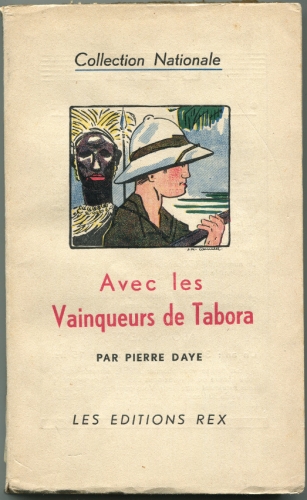 Présent dans les gazettes, Pierre Daye l’est tout autant aux devantures des librairies : en 1942, il fait paraître deux essais politiques (L ‘Europe aux Européens et Trente-deux mois chez les députés), puis en 1943, un texte sur l’Afrique (Problèmes congolais), et en 1944, un recueil de contes (D’ombre et de lumière). À compter de 1943, son engagement se concrétise aussi par son accession à un poste officiel dans l’administration belge. Sur recommandation du Flamand Gérard Romsée, il est en effet nommé, le 25 juin 1943, au poste un peu inattendu de … commissaire général à l’Éducation Physique et aux Sports. En soi, il s’agit d’une fonction peu compromettante et qui fournit à son titulaire d’excellentes justifications pour voyager. Reste qu’elle fait de Pierre Daye un fonctionnaire officiel de la collaboration, ce qui peut se révéler extrêmement dangereux. De fait, loin d’aller vers l’apaisement qu’il souhaitait, la situation se dégrade et les rivalités belges se muent désormais en sanglants règlements de compte. « Les hitlériens de nationalité belge [sont] plus abjects encore que leurs maîtres allemands », proclame un journal clandestin communiste. « Cette vermine immonde doit être écrasée (…) Les Partisans belges se sont juré de liquider ces bêtes puantes » (53) L’année 1942 est ponctuée d’au moins 67 attentats et l’année 1943 connaît une recrudescence vertigineuse des actes violents, au point que le chef de l’administration allemande, Eggert Reeder, parle carrément d’une vague de meurtres ou Mordwelle. « Dans la rue et les campagnes, surtout à partir de 1943 », écrit une historienne belge, « règne une atmosphère de guerre civile : rexistes et nationalistes flamands, ainsi que les membres de leurs familles, sont abattus, sans autre forme de procès, sans distinction d’âge ou de sexe » (54).
Présent dans les gazettes, Pierre Daye l’est tout autant aux devantures des librairies : en 1942, il fait paraître deux essais politiques (L ‘Europe aux Européens et Trente-deux mois chez les députés), puis en 1943, un texte sur l’Afrique (Problèmes congolais), et en 1944, un recueil de contes (D’ombre et de lumière). À compter de 1943, son engagement se concrétise aussi par son accession à un poste officiel dans l’administration belge. Sur recommandation du Flamand Gérard Romsée, il est en effet nommé, le 25 juin 1943, au poste un peu inattendu de … commissaire général à l’Éducation Physique et aux Sports. En soi, il s’agit d’une fonction peu compromettante et qui fournit à son titulaire d’excellentes justifications pour voyager. Reste qu’elle fait de Pierre Daye un fonctionnaire officiel de la collaboration, ce qui peut se révéler extrêmement dangereux. De fait, loin d’aller vers l’apaisement qu’il souhaitait, la situation se dégrade et les rivalités belges se muent désormais en sanglants règlements de compte. « Les hitlériens de nationalité belge [sont] plus abjects encore que leurs maîtres allemands », proclame un journal clandestin communiste. « Cette vermine immonde doit être écrasée (…) Les Partisans belges se sont juré de liquider ces bêtes puantes » (53) L’année 1942 est ponctuée d’au moins 67 attentats et l’année 1943 connaît une recrudescence vertigineuse des actes violents, au point que le chef de l’administration allemande, Eggert Reeder, parle carrément d’une vague de meurtres ou Mordwelle. « Dans la rue et les campagnes, surtout à partir de 1943 », écrit une historienne belge, « règne une atmosphère de guerre civile : rexistes et nationalistes flamands, ainsi que les membres de leurs familles, sont abattus, sans autre forme de procès, sans distinction d’âge ou de sexe » (54).
Le 14 avril 1943, Paul Colin, le patron et l’ami de Pierre Daye, est abattu dans sa librairie. L’un de ses employés, Gaston Bekeman, tombe sous les balles du même assassin. Le meurtrier, Arnaud Fraiteur, un étudiant de 22 ans (55), et ses deux complices, André Bertulot et Maurice Raskin, seront condamnés à mort et pendus. « Paul Colin », écrit Pierre Daye, « n’était pas seulement le premier critique d’art de Belgique (…) l’auteur de tant d’essais littéraires, artistiques, politiques, l’historien profond des ducs de Bourgogne, l’éditeur, le directeur du Nouveau Journal et de Cassandre, le chroniqueur et le pamphlétaire, le fondateur et le président de l’Association des journalistes belges, mais un amateur éclairé, un homme de goût et surtout un être terriblement intelligent, un des plus intelligents que j’ai rencontrés dans cette partie agitée de ma carrière » (56) « Il était détesté, naturellement », ajoute-t-il, « car il haïssait la médiocrité et ne se privait pas de le montrer, avec une verve, un éclat terribles. Il avait la dent dure et adorait se faire des ennemis » (57).
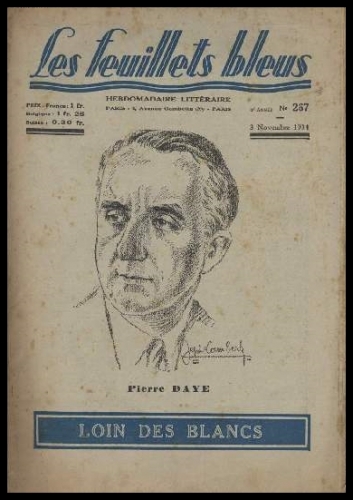 Profondément choqué par le déferlement de violence auquel il assiste, Pierre Daye en juge sévèrement les inspirateurs : « Il fallait », constate-t-il amèrement, « par la provocation, empoisonner une atmosphère trop paisible, donc trop favorable à l’occupant. Il fallait susciter des vengeances, allumer l’esprit de représailles » (58). Et confronté à cet engrenage fatal (59), il en décrit tristement le mécanisme : « De braves gens, mûs uniquement par le sentiment patriotique, ne se doutaient point du vrai rôle qu’on leur faisait ainsi jouer. Et des canailles trouvaient, en se glissant parmi eux, le moyen de commettre les plus bas crimes (…) Se sentant sans protection, d’autres braves gens, de l’autre idéologie, se dirent alors qu’il fallait se défendre soi-même ; non pas se venger, mais si l’on voulait vivre, répondre à la terreur par la terreur » (60).
Profondément choqué par le déferlement de violence auquel il assiste, Pierre Daye en juge sévèrement les inspirateurs : « Il fallait », constate-t-il amèrement, « par la provocation, empoisonner une atmosphère trop paisible, donc trop favorable à l’occupant. Il fallait susciter des vengeances, allumer l’esprit de représailles » (58). Et confronté à cet engrenage fatal (59), il en décrit tristement le mécanisme : « De braves gens, mûs uniquement par le sentiment patriotique, ne se doutaient point du vrai rôle qu’on leur faisait ainsi jouer. Et des canailles trouvaient, en se glissant parmi eux, le moyen de commettre les plus bas crimes (…) Se sentant sans protection, d’autres braves gens, de l’autre idéologie, se dirent alors qu’il fallait se défendre soi-même ; non pas se venger, mais si l’on voulait vivre, répondre à la terreur par la terreur » (60).
Sa charge administrative facilitant les déplacements, Pierre Daye ne se prive pas de revenir en France autant qu’il le souhaite. Le 29 novembre 1943, il est à Vichy où il déjeune avec Pierre Laval, « la mèche napoléonienne sur la lippe fatiguée (…) Ironique, sans illusion, finaud » (61). Le soir, il dîne au Chantecler avec Stanislas de la Rochefoucauld, l’ambassadeur Gaston Bergery (« toujours l’air d’un jeune père jésuite, sec, précis et désabusé, strictement vêtu de drap sombre ») et son épouse, Bettina Jones, ancienne égérie de Schiaparelli. Au retour, le Belge s’arrête bien sûr à Paris où il rend visite à Drieu, avenue de Breteuil. « Il m’effraye », note-t-il, « par sa lucidité triste : la guerre, la décadence des possédants, la lourdeur des Allemands, l’incompréhension des femmes, le préoccupent. Son scepticisme me désespère et me séduit à la fois » (62). De retour chez lui, avenue de Tervueren, à Etterbeek, Pierre Daye n’est pas rasséréné par l’atmosphère ambiante. Les attentats se multiplient et les positions des uns et des autres se crispent jusqu’à l’absurde. Même les nuits ne laissent désormais plus aucun répit : « Qui n’a pas connu », raconte-t-il, « l’angoisse causée par des centaines d’avions passant sur les têtes, tandis que roulait à travers les nuages un bruit sourd, dominant tous les autres, et la sensation de la mort qui pouvait vous atteindre à chaque seconde, alors que l’on se sentait accablé d’impuissance, hors de toute possibilité de fuite ou de recours quelconque, ne sait pas ce que furent pour les nerfs ces heures démoralisantes » (63).
Loin des épurateurs
Dans ces conditions, et compte tenu de l’avenir immédiat de la Belgique tel qu’il l’anticipe, Daye songe de plus en plus à mettre quelque distance entre les futurs libérateurs du royaume et lui-même. En mai 1944, l’occasion s’offre à lui d’effectuer une tournée officielle en Espagne en qualité de commissaire aux sports, déplacement qui possède l’immense avantage de le mettre à l’abri des pistoleros du Front de l’Indépendance, comme des bombes de la RAF et de l’US Air Force. Le 19 mai, le quotidien madrilène ABC rapporte que le Belge a donné une conférence de presse dans la capitale ibérique, et quant à l’intéressé lui-même, il signale qu’il passe ensuite quelques jours à Barcelone afin de s’entretenir avec le général Moscardo (1878-1956), délégué national aux sports. Peu pressé de rentrer en Belgique, Pierre Daye se trouve encore à Madrid le 6 juin lorsque tombe la nouvelle du débarquement allié en Normandie. Ses supérieurs le pressent de rentrer au pays, mais l’écrivain n’en a cure : « J’étais venu librement comme les autres fois », commente-t-il. « Nul ne m’avait donné d’ordres, et je ne me sentais pas d’humeur à commencer à en recevoir » (64). D’ailleurs, un retour impliquerait de traverser une France en pleine insurrection et comme il le souligne : « Je possédais les meilleures raisons du monde pour ne pas tomber entre les mains d’excités pris de folie sanguinaire » (65). À cette époque commence donc pour Pierre Daye une seconde existence, celle d’un émigré politique. Elle va durer un peu plus de quinze ans.
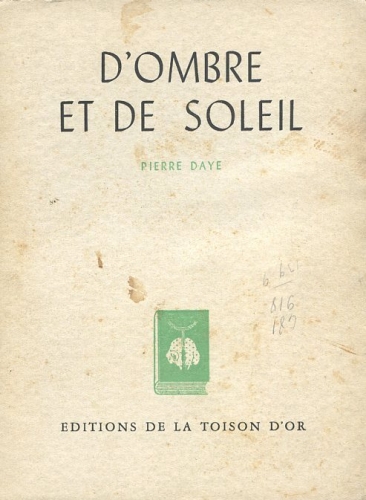 Les premiers temps d’exil ne sont pas trop durs car l’expatrié possède encore quelques relations : il est reçu chez le phalangiste Eugenio d’Ors (66) ou chez le général Eugenio Espinosa de los Monteros, ancien ambassadeur à Berlin, et dîne même parfois avec Walter Starkie (67), le directeur de l’Institut Britannique de Madrid. Plus tard, il verra de temps en temps François Piétri et l’académicien Abel Bonnard. Quelles que soient les difficultés qu’il rencontre et la peine qu’il éprouve, cet exil lui épargne à tout le moins un sort funeste. L’épuration belge se veut en effet particulièrement vindicative puisque, si l’on en croit Paul Sérant, un certain Marcel Houtman exige par exemple que soient exécutés tous les Belges ayant combattu sur le front de l’Est, tous les écrivains et journalistes de la collaboration et tous les fonctionnaires ayant servi les desseins de l’occupant ! (68) Les intellectuels ne peuvent donc guère espérer de mansuétude. Le poète René Baert a été sommairement abattu au coin d’un bois, quelque part en Allemagne, plusieurs journalistes sont condamnés à la peine capitale et fusillés (Paul Herten, José Sreel, Jules Lhoste, Victor Meulenyser, Charles Nisolles, Paul Lespagnard), d’autres échappent de très peu au poteau (Robert Poulet, Paul Jamin), et quelques-uns, comme Pierre Hubermont et Gabriel Figeys, écopent de lourdes peines de détention. Le peintre Marc Eemans est frappé d’une peine de huit ans de prison, tandis que le dramaturge Michel de Ghelderode se fait copieusement insulter et chasser de son emploi. Beaucoup ne retrouveront un peu de tranquillité qu’à l’étranger : Simenon, Hergé et Henri de Man en Suisse, Paul Werrie en Espagne puis en France, Raymond de Becker (condamné à mort puis à la détention perpétuelle), Claude Elsen (condamné à mort par contumace) et Louis Carette (condamné par contumace à 15 ans de travaux forcés) en France. Certains feront malgré tout, hors de Belgique, de brillantes carrières : émigré à Paris, Oscar Van Godtsenhoven, alias Jan Van Dorp, y remportera un prix (1948) pour son Flamand des vagues ; Louis Carette, alias Félicien Marceau, sera élu à l’Académie française (1975), tandis que Jean Libert et Gaston Vandenpanhuyse vendront des milliers de livres sous les noms d’emprunt de Paul Kenny et Jean-Gaston Vandel. « La répression contre les intellectuels », note Elsa Van Brusseghem-Loorne, « surtout en Wallonie (69), prendra (…) une tournure dramatique et particulièrement cruelle, comme si le pouvoir, détenu par des classes en déclin, voulait éliminer par tous les moyens ceux qui, par leurs efforts, étaient la preuve vivante de son infériorité culturelle » (70)…
Les premiers temps d’exil ne sont pas trop durs car l’expatrié possède encore quelques relations : il est reçu chez le phalangiste Eugenio d’Ors (66) ou chez le général Eugenio Espinosa de los Monteros, ancien ambassadeur à Berlin, et dîne même parfois avec Walter Starkie (67), le directeur de l’Institut Britannique de Madrid. Plus tard, il verra de temps en temps François Piétri et l’académicien Abel Bonnard. Quelles que soient les difficultés qu’il rencontre et la peine qu’il éprouve, cet exil lui épargne à tout le moins un sort funeste. L’épuration belge se veut en effet particulièrement vindicative puisque, si l’on en croit Paul Sérant, un certain Marcel Houtman exige par exemple que soient exécutés tous les Belges ayant combattu sur le front de l’Est, tous les écrivains et journalistes de la collaboration et tous les fonctionnaires ayant servi les desseins de l’occupant ! (68) Les intellectuels ne peuvent donc guère espérer de mansuétude. Le poète René Baert a été sommairement abattu au coin d’un bois, quelque part en Allemagne, plusieurs journalistes sont condamnés à la peine capitale et fusillés (Paul Herten, José Sreel, Jules Lhoste, Victor Meulenyser, Charles Nisolles, Paul Lespagnard), d’autres échappent de très peu au poteau (Robert Poulet, Paul Jamin), et quelques-uns, comme Pierre Hubermont et Gabriel Figeys, écopent de lourdes peines de détention. Le peintre Marc Eemans est frappé d’une peine de huit ans de prison, tandis que le dramaturge Michel de Ghelderode se fait copieusement insulter et chasser de son emploi. Beaucoup ne retrouveront un peu de tranquillité qu’à l’étranger : Simenon, Hergé et Henri de Man en Suisse, Paul Werrie en Espagne puis en France, Raymond de Becker (condamné à mort puis à la détention perpétuelle), Claude Elsen (condamné à mort par contumace) et Louis Carette (condamné par contumace à 15 ans de travaux forcés) en France. Certains feront malgré tout, hors de Belgique, de brillantes carrières : émigré à Paris, Oscar Van Godtsenhoven, alias Jan Van Dorp, y remportera un prix (1948) pour son Flamand des vagues ; Louis Carette, alias Félicien Marceau, sera élu à l’Académie française (1975), tandis que Jean Libert et Gaston Vandenpanhuyse vendront des milliers de livres sous les noms d’emprunt de Paul Kenny et Jean-Gaston Vandel. « La répression contre les intellectuels », note Elsa Van Brusseghem-Loorne, « surtout en Wallonie (69), prendra (…) une tournure dramatique et particulièrement cruelle, comme si le pouvoir, détenu par des classes en déclin, voulait éliminer par tous les moyens ceux qui, par leurs efforts, étaient la preuve vivante de son infériorité culturelle » (70)…
Au pays de Martin Fierro
Faute d’avoir pu épingler Pierre Daye à leur tableau de chasse, les nouvelles autorités belges se penchent néanmoins sur son cas, et la 4e Chambre du Conseil de Guerre n’éprouve aucun scrupule à le condamner par contumace, le 18 décembre 1946, à la peine de mort. Des pressions sont exercées sur l’Espagne qui ne peut décemment, sous le nez des Alliés, offrir l’hospitalité à tous les proscrits d’Europe et se voit donc contrainte d’effectuer des choix. Si le Caudillo a accordé l’asile politique à Léon Degrelle, Jean Bichelone ou Abel Bonnard, il n’a pas gardé Pierre Laval qui a fini devant un peloton d’exécution… Malgré le soutien de quelques dignitaires franquistes, comme José Félix de Lequerica, Manuel Aznar et José María de Areilza, Pierre Daye fait lui aussi partie des gens que l’on incite vivement à quitter l’Espagne. Muni d’un passeport espagnol libellé au nom de Pedro Adán, l’ancien commissaire aux sports s’envole donc pour Buenos Aires où il arrive le 21 mai 1947. En Argentine, le nouveau venu n’est pas livré à lui-même car plusieurs amis et connaissances l’ont précédé et sont là pour l’accueillir. Au nombre de ces fidèles, citons Charles Lesca (71), alias Carlos Levray ou Pedro Vignau, ancien directeur de Je suis partout, Georges Guilbaud (72), alias Jorge Degay, et Robert Pincemin (73), alias Rives ; dans le comité d’accueil figure également Mario Octavio Amadeo (74), l’un des proches conseillers du Président Perón. À peu près à la même époque, Buenos Aires voit aussi arriver Jean-Jules Lecomte, alias Jean Degraaf Verhegen, ancien bourgmestre rexiste de Chimay ; plus tard, en 1949, débarquera encore Henri Collard-Bovy, un avocat bruxellois d’un certain renom. Avisée de l’arrivée de Pierre Daye, Bruxelles se manifeste aussitôt auprès du gouvernement argentin et réclame son extradition (17 juin 1947). Cette demande ayant été rejetée, l’écrivain est alors tout simplement déchu de sa nationalité. À compter du 24 décembre 1947, l’ancien combattant de 1914-18, vétéran de Tabora et ex-député, n’est donc plus citoyen belge, il est apatride.
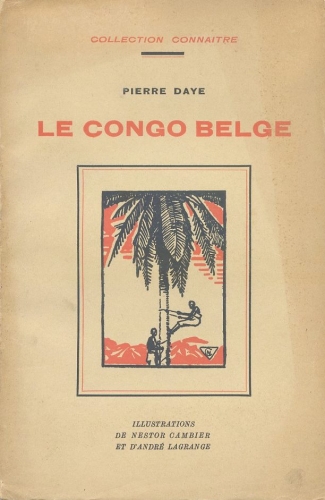 Âgé de 55 ans et plutôt combatif, l’homme est cependant loin d’avoir dit son dernier mot. Le 29 juin 1948, il prend part, avec quelques autres expatriés (75), à la création de la Société Argentine pour l’Accueil des Européens ou Sociedad Argentina para la Recepción de Europeos (SARE). Jouissant de la discrète protection de l’anthropologue Santiago Peralta, patron des services d’immigration, et bénéficiant des encouragements du cardinal Santiago Luis Copello (1880-1967), cette société s’efforce d’aider les « maudits » qui continuent d’affluer sur les rives du Rio de la Plata. Pierre Daye reprend aussi son métier de journaliste et participe au lancement de plusieurs publications dont Hebdo (1947), Europe-Argentine (1948), Argentina 49, Paroles françaises et Nouvelles d’Argentine. Naturalisé argentin en 1949, il collabore également aux revues Criterio et Itinerarium, à El Economista, le journal que fonde l’ancien Premier ministre yougoslave Milan Stojadinović (1888-1961), ainsi qu’à Dinámica Social, le mensuel que lance, en 1952, l’ancien hiérarque fasciste Carló Scorza (alias Camillo Sirtori)-(76). Organe officiel du Centre d’Études Économiques et Sociales, cette revue regroupe de nombreuses plumes de talent dont celles du philosophe roumain Georges Uscatescu, d’Ante Pavelić (alias A. S. Mrzlodolski), du père Juan Ramon Sepich, de Julio Irazusta, ou encore de Jean Pleyber, André Thérive, Jacques de Mahieu et Jacques Ploncard (alias Jacques de Sainte-Marie). Pierre Daye ne délaisse pas non plus le terrain politique où il parvient, avec son entregent habituel, à rester en bons termes à la fois avec les traditionalistes catholiques et les péronistes. Durant l’été 1949, il a quelques contacts avec le Centre des Forces Nationalistes, mais s’intéresse aussi à la Troisième Position de Juan Perón. Avec Radu Ghenea, Georges Guilbaud, René Lagrou (77) et Victor de la Serna, il signe d’ailleurs à ce sujet une note qui sera remise au chef de l’État. En septembre 1950, l’écrivain a le plaisir de renouer avec le ministre belge Marcel Henri Jaspar (1901-1982) qui est de passage dans le cône sud. Autre contact important, Sir Oswald Mosley, qu’il rencontre en novembre 1950, lors de la visite que l’ancien chef de la British Union of Fascists fait en Argentine (78). Venu s’entretenir avec Hans Ulrich Rudel, l’Anglais sera reçu par Juan Perón. Installé à Buenos Aires, dans le quartier de Palermo, et nommé professeur à l’Université de La Plata (sur recommandation de son ami le ministre des Affaires Étrangères Hipólito Jesús Paz), Pierre Daye entretient d’autre part une abondante correspondance.
Âgé de 55 ans et plutôt combatif, l’homme est cependant loin d’avoir dit son dernier mot. Le 29 juin 1948, il prend part, avec quelques autres expatriés (75), à la création de la Société Argentine pour l’Accueil des Européens ou Sociedad Argentina para la Recepción de Europeos (SARE). Jouissant de la discrète protection de l’anthropologue Santiago Peralta, patron des services d’immigration, et bénéficiant des encouragements du cardinal Santiago Luis Copello (1880-1967), cette société s’efforce d’aider les « maudits » qui continuent d’affluer sur les rives du Rio de la Plata. Pierre Daye reprend aussi son métier de journaliste et participe au lancement de plusieurs publications dont Hebdo (1947), Europe-Argentine (1948), Argentina 49, Paroles françaises et Nouvelles d’Argentine. Naturalisé argentin en 1949, il collabore également aux revues Criterio et Itinerarium, à El Economista, le journal que fonde l’ancien Premier ministre yougoslave Milan Stojadinović (1888-1961), ainsi qu’à Dinámica Social, le mensuel que lance, en 1952, l’ancien hiérarque fasciste Carló Scorza (alias Camillo Sirtori)-(76). Organe officiel du Centre d’Études Économiques et Sociales, cette revue regroupe de nombreuses plumes de talent dont celles du philosophe roumain Georges Uscatescu, d’Ante Pavelić (alias A. S. Mrzlodolski), du père Juan Ramon Sepich, de Julio Irazusta, ou encore de Jean Pleyber, André Thérive, Jacques de Mahieu et Jacques Ploncard (alias Jacques de Sainte-Marie). Pierre Daye ne délaisse pas non plus le terrain politique où il parvient, avec son entregent habituel, à rester en bons termes à la fois avec les traditionalistes catholiques et les péronistes. Durant l’été 1949, il a quelques contacts avec le Centre des Forces Nationalistes, mais s’intéresse aussi à la Troisième Position de Juan Perón. Avec Radu Ghenea, Georges Guilbaud, René Lagrou (77) et Victor de la Serna, il signe d’ailleurs à ce sujet une note qui sera remise au chef de l’État. En septembre 1950, l’écrivain a le plaisir de renouer avec le ministre belge Marcel Henri Jaspar (1901-1982) qui est de passage dans le cône sud. Autre contact important, Sir Oswald Mosley, qu’il rencontre en novembre 1950, lors de la visite que l’ancien chef de la British Union of Fascists fait en Argentine (78). Venu s’entretenir avec Hans Ulrich Rudel, l’Anglais sera reçu par Juan Perón. Installé à Buenos Aires, dans le quartier de Palermo, et nommé professeur à l’Université de La Plata (sur recommandation de son ami le ministre des Affaires Étrangères Hipólito Jesús Paz), Pierre Daye entretient d’autre part une abondante correspondance.
On sait notamment qu’il a de fréquents échanges épistolaires avec des gens comme Jean Azéma, Maurice Bardèche, Henri de Man, Georges Remi (Hergé), Christian du Jonchay (alias Della Torre), le père Omer Englebert, Simon Arbellot, Henri Poulain ou l’éditeur genevois Constant Bourquin. Au plan des relations sociales, il est probable qu’il rencontre assez souvent quelques collègues d’autrefois comme Henri Lèbre (alias Enrique Winter), un ancien du Cri du Peuple, Henri Janières, vétéran de Paris-Soir (et futur correspondant local du Monde) et Pierre Villette-Dorsay, ancien chroniqueur parlementaire à Je suis partout et rescapé de Radio-Patrie (79), qui tous résident dans la capitale fédérale. Il possède également d’excellents amis argentins, comme Juan Carlos Goyeneche (1913-1982), l’attaché de presse de la présidence de la République. En août 1951, il assiste sans doute, à la cathédrale de Buenos Aires, à la messe qui est célébrée, devant des milliers de fidèles, pour le repos de l’âme du maréchal Pétain, et fin 1952 à celle qui est dite pour Charles Maurras. Séparé de son lectorat habituel et résidant dans un pays hispanophone, Pierre Daye ne publie quasiment plus de livres : seul paraîtra, en 1952, un essai politique, El suicidio de la burguesía (Le suicide de la bourgeoisie). Cela ne l’empêche bien évidemment pas d’écrire et il laissera à la postérité de nombreux inédits. Parmi ceux-ci et outre divers essais (Le voyageur de la guerre, 1940-1945 ; Panorama espagnol ; En Argentine ; Pris aux autres), son long exil lui permet de rédiger d’imposants mémoires. Intitulés D’un monde à l’autre et ne comptant pas moins de 63 chapitres ou 1600 pages dactylographiées, ces mémoires sont, hélas, encore inédits et dorment toujours dans les bibliothèques bruxelloises…
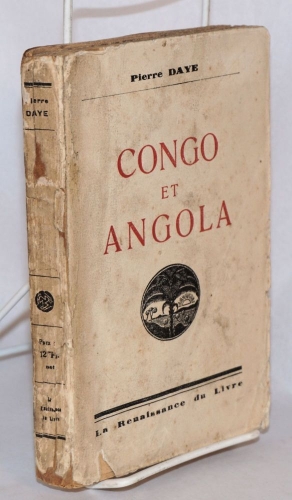 La chute de Juan Perón, en septembre 1955, n’entraîne pas d’inconvénients majeurs pour Pierre Daye qui n’est pas vraiment un acteur de la vie politique locale. Tenu pour proche du péronisme, il se retrouve néanmoins marginalisé et éloigné des nouveaux cercles dirigeants. Plus que le changement de régime, c’est plutôt l’isolement et l’oubli qui le menacent désormais. Le temps fait lentement son œuvre et la plupart des Belges l’ont d’ores et déjà oublié. Pas mal d’émigrés ont regagné l’Europe, on lui demande de moins en moins d’articles et la solitude le guette. C’est dans ce contexte un peu maussade que le 20 février 1960, à un peu moins de 68 ans, une hémorragie cérébrale vient brutalement mettre un terme à son existence. Cultivé, discret et fort modéré, on se demande encore ce que cet homme avait bien pu faire pour que la Belgique d’après-guerre lui témoigne d’une vindicte aussi tenace. Se pourrait-il tout simplement que l’on ait jugé, en haut lieu, qu’il en savait beaucoup trop long sur les arcanes (et les drôles de combines) de l’Occupation et qu’il fallait le discréditer à jamais ?
La chute de Juan Perón, en septembre 1955, n’entraîne pas d’inconvénients majeurs pour Pierre Daye qui n’est pas vraiment un acteur de la vie politique locale. Tenu pour proche du péronisme, il se retrouve néanmoins marginalisé et éloigné des nouveaux cercles dirigeants. Plus que le changement de régime, c’est plutôt l’isolement et l’oubli qui le menacent désormais. Le temps fait lentement son œuvre et la plupart des Belges l’ont d’ores et déjà oublié. Pas mal d’émigrés ont regagné l’Europe, on lui demande de moins en moins d’articles et la solitude le guette. C’est dans ce contexte un peu maussade que le 20 février 1960, à un peu moins de 68 ans, une hémorragie cérébrale vient brutalement mettre un terme à son existence. Cultivé, discret et fort modéré, on se demande encore ce que cet homme avait bien pu faire pour que la Belgique d’après-guerre lui témoigne d’une vindicte aussi tenace. Se pourrait-il tout simplement que l’on ait jugé, en haut lieu, qu’il en savait beaucoup trop long sur les arcanes (et les drôles de combines) de l’Occupation et qu’il fallait le discréditer à jamais ?
Christophe Dolbeau
———————————————
(1) Avec les vainqueurs de Tabora, Paris, Perrin et Cie, 1918.
(2) Le baron Pierre Nothomb (1887-1966) fut avocat mais surtout écrivain et homme politique. Leader des nationalistes belges, il sera plus tard sénateur du Parti catholique puis du Parti social-chrétien. Voy. Lionel Baland, Pierre Nothomb, Qui suis-je, Grez-sur-Loing, Pardès, 2019.
(3) Edmond Thieffry (1892-1929) était un as de l’aviation belge. En 1925, il accomplit l’exploit de rallier Léopoldville (Kinshasa) depuis Bruxelles, à bord d’un avion Handley Page W8.
(4) Jean Delville (1867-1953) était un poète et un peintre symboliste. Il enseigna son art à l’Académie royale des beaux-arts de Bruxelles entre 1907 et 1937.
(5) L’ingénieur Leonid Krassine (1870-1926) était un dirigeant bolchevik qui fut commissaire du peuple au commerce extérieur, puis ambassadeur soviétique à Paris et Londres.
(6) Fils de banquier, Maxime Litvinov ou Meir Henoch Wallach-Finkelstein (1876-1951) fut commissaire du peuple aux Affaires Étrangères et ambassadeur soviétique à Londres, puis auprès de la SDN.
(7) Le général Wladyslaw Sikorski (1881-1943) avait été, en 1920, l’un des artisans de la défaite des bolcheviks devant Varsovie. Il sera successivement chef d’état-major, Président du Conseil et ministre des affaires militaires.
(8) Pou-yi (1906-1967) fut le dernier empereur de Chine. Destitué en 1912 puis réfugié à Tianjin, il sera placé par les Japonais à la tête du « Grand État mandchou de Chine » ou Mandchoukouo (1932).
(9) Seigneur de guerre et généralissime, Tchang Tso-lin (1875-1928) sera brièvement président de la République de Chine (juin 1927-juin 1928) après avoir été longtemps le maître de la Mandchourie.
(10) Par exemple Le Maroc s’éveille (1924), Moscou dans le souffle de l’Asie (1926), La Chine est un pays charmant (1927), Le Japon et son destin (1928), La clef anglaise (1929), Beaux jours du Pacifique (1931) et Aspects du monde (1934).
(11) José Félix de Lequerica (1891-1963) fut maire de Bilbao (1938-39), puis ambassadeur d’Espagne en France, ministre des Affaires Étrangères (1944-45) et ambassadeur aux Etats-Unis (1951-54).
(12) Président du Parti Ouvrier Belge, Henri de Man (1885-1953) sera ministre des Travaux publics (1934-35) et ministre des Finances (1936-38). Condamné en 1946 à 20 ans de détention et dix millions d’amende pour avoir « servi les desseins de l’ennemi », il finira ses jours en Suisse (écrasé par un train sur une voie de chemin de fer où sa voiture s’était immobilisée).
(13) Militant socialiste, Paul-Henri Spaak (1899-1972) sera ministre des Transports et des PTT, ministre des Affaires Étrangères et Premier ministre. Il est considéré comme l’un des « pères de l’Europe ».
(14) Voy. Bernard Delcord, « À propos de quelques ‘chapelles’ politico-littéraires en Belgique (1919-1945 », Cahiers d’Histoire de la IIe Guerre mondiale, Bruxelles, Centre de Recherches et d’Études historiques de la IIe Guerre mondiale, n° 10, octobre 1986, p. 165-168.
(15) Voy. Jean-Léo, La Collaboration au quotidien – Paul Colin et le Nouveau Journal 1940-1944, Bruxelles, Racine, 2002, p. 107.
(16) Ibid, p. 109.
(17) Voy. Jean-Michel Etienne, Le mouvement rexiste jusqu’en 1940, Paris, Armand Colin, 1968, p. 73.
(18) Voy. Le Dossier du Mois, n° 12 (décembre 1963), Bruxelles, Editions du Ponant, p. 35 – extrait du chapitre XLVII des mémoires de Pierre Daye.
(19) Voy. supra, note 10.
(20) À savoir La politique coloniale de Léopold II (1918), Léopold II (1934), Vie et mort d’Albert Ier (1934), La jeunesse et l’avènement de Léopold III (1934).
(21) Par exemple Les conquêtes africaines des Belges (1918), L’Empire colonial belge (1923), Le Congo belge (1927), Congo et Angola (1929), Stanley (1936), Livingstone retrouvé par Stanley (1936),
(22) Voy. En Espagne, sous la Dictature (1925), La Belgique et la mer (1926), La Belgique maritime (1930) et L’Europe en morceaux (1932).
(23) « Le mouvement pan-nègre », Le Flambeau, 4e année, n° 7, juillet 1921, pp. 360-375 (consultable en ligne).
(24) Pierre Daye, Léon Degrelle et le rexisme, Paris, Fayard, 1937, p. 10.
(25) Le Dossier du Mois, n° 12, p. 2 – chapitre XLII des mémoires de Pierre Daye.
(26) Voy. Jean-Michel Etienne, op.cit., p. 36.
(27) Le Dossier du Mois, n° 12, p. 4 – chapitre XXXV des mémoires de Pierre Daye.
(28) Le Flamand Gustave Sap (1886-1940) était le propriétaire du journal catholique De Standaard. Député du Parti catholique, il sera ministre des Travaux publics, de l’Agriculture et du Commerce (1932-34), ministre des Finances (1934), puis de l’Économie et du Commerce (1939-40). Ses sympathies pour la droite et le rexisme entraîneront son exclusion du Parti catholique…
(29) L’avocat Hendrik Borginon (1890-1985) était l’un des dirigeants du parti nationaliste flamand VNV.
(30) Député du Parti catholique populaire flamand, Gérard Romsée (1901-1975) fut ensuite l’une des figures de proue du parti nationaliste flamand VNV. En avril 1941, il sera nommé secrétaire général à l’Intérieur et la Santé, ce qui lui vaudra d’être condamné à mort puis à la réclusion perpétuelle en 1945.
(31) Nationaliste flamand, Joris van Severen (1894-1940) fut le fondateur du mouvement solidariste thiois Verdinaso. Arrêté en 1940 sur soupçon (totalement infondé) d’appartenance à la 5e colonne, il sera sommairement abattu par des militaires français, le 20 mai, à Abbeville.
(32) Charles-Albert d’Aspremont-Lynden (1888-1967) était un sénateur du Parti catholique. Il sera ministre de l’Agriculture en 1939-40 et ministre sans portefeuille dans le gouvernement belge en exil à Londres (1940-44).
(33) « On ne comprit pas », écrit Pierre Daye, « ou plutôt on ne voulut pas comprendre, qu’en politique, les sentiments et le réalisme sont deux choses et que si mon affection pour la culture et pour le peuple de France n’a jamais varié, je ne pouvais pas rester aveugle devant la folie de sa politique guerrière… » – Le Dossier du Mois, n° 12, p. 8 – chapitre XXXV des mémoires de Pierre Daye.
(34) Voy. Bernard Delcord, op. cit., pp. 177-179.
(35) Autonomiste corse, Pierre Bonardi (1887-1964) était un journaliste et un écrivain. Longtemps proche du Parti radical-socialiste et de la Ligue contre l’antisémitisme (LICA), il adhèra ensuite au PPF et soutint Pierre Laval durant l’Occupation.
(36) Le 20 mai 1940, 21 personnes arrêtées en Belgique et soupçonnées d’appartenir à la 5e colonne sont assassinées sans jugement, à Abbeville, par une compagnie de l’armée française aux ordres du capitaine Marcel Dingeon et du lieutenant René Caron. Disparaissent (entre autres) dans ce massacre le leader flamand Joris Van Severen et son adjoint Jan Ryckoort, le rexiste René Wery, le hockeyeur canadien Robert Bell, deux communistes et deux Juifs. Léon Degrelle échappe de justesse à la mort. Voy. Léon Degrelle, La guerre en prison, in Relectures Léon Degrelle, Lyon, Irminsul Éditions, s.d. ; Carlos Vlaeminck, Dossier Abbeville, Louvain, Davidsfonds, 1977.
(37) Le Dossier du Mois, n° 12, p. 15 – chapitre XLII des mémoires de Pierre Daye.
(38) Ibid, p. 16 – chapitre XLII des mémoires de Pierre Daye.
(39) Ibid, p. 22 – chapitre XLV des mémoires de Pierre Daye.
(40) Ibid, p. 24 – chapitre XLV des mémoires de Pierre Daye.
(41) Ibid, p. 24 – chapitre XLV des mémoires de Pierre Daye.
(42) Voy. Jean-Léo, op.cit., p. 28.
(43) Ibid, pp. 41-48.
(44) Voy. Jean-Léo, op. cit., p. 56.
(45) cité par Roland Roudil, Jean-François Durand et Guillaume Bridet, in Le reportage colonial, Pondicherry, Kailash, 2016, p. 462.
(46) Le Choc du Mois, n° 12, p. 36 – chapitre XLVII des mémoires de Pierre Daye.
(47) Voy. Bernard Delcord, op. cit., p. 183.
(48) Voy. C. Dolbeau, « Weimar 1941-1942 : la Société Européenne des Écrivains », Tabou, vol. 25, Saint-Genis-Laval, Akribeia, 2019, 160-183.
(49) Voy. Bernard Delcord, op. cit., p. 182.
(50) Le Dossier du Mois, n° 12, p. 27 – chapitre XLVI des mémoires de Pierre Daye.
(51) Ibid, p. 27-28 – chapitre XLVI des mémoires de Pierre Daye.
(52) Ibid, pp. 31-32 – chapitre XLVII des mémoires de Pierre Daye.
(53) Voy. Jacques Willequet, La Belgique sous la botte, Paris, Éditions universitaires, 1986, p. 279.
(54) Voy. Elsa Van Brusseghem-Loorne, « La libération et l’épuration en Belgique », Le Crapouillot, n° 120 (juillet-août 1994), p. 62.
(55) petit-cousin de Robert Poulet (1893-1989), le rédacteur en chef du Nouveau Journal.
(56) Le Dossier du Mois, n° 12, pp. 28-29 – chapitre XLVI des mémoires de Pierre Daye.
(57) Ibid, p. 29 – chapitre XLVI des mémoires de Pierre Daye.
(58) Ibid, p. 35 – chapitre XLVII des mémoires de Pierre Daye.
(59) Les Partisans communistes se vantent d’avoir « exécuté » 962 soldats ennemis et 1137 collaborateurs (voy. J. Willequet, op. cit., p. 300) et l’on parle de 700 rexistes assassinés. En face, des commandos ripostent, en abattant le banquier Alexandre Galopin et l’ancien gouverneur François Bovesse ou en massacrant 27 otages à Courcelles-Charleroi.
(60) Le Dossier du Mois, n° 12, p. 35 – chapitre XLVII des mémoires de Pierre Daye.
(61) Ibid, p. 34 – chapitre XLVII des mémoires de Pierre Daye.
(62) Ibid, p. 34 – chapitre XLVII des mémoires de Pierre Daye.
(63) Ibid, p. 36 – chapitre XLVII des mémoires de Pierre Daye.
(64) Ibid, p. 36 – chapitre XLIX des mémoires de Pierre Daye.
(65) Ibid, p. 36 – chapitre XLIX des mémoires de Pierre Daye.
(66) Célèbre écrivain et critique d’art catalan, Eugenio d’Ors i Rovira (1881-1954) fut ministre des Beaux-Arts du gouvernement nationaliste durant la Guerre Civile. Membre de l’Association des amis de l’Allemagne, il siégeait aussi à l’Académie royale espagnole.
(67) Universitaire et musicien, Walter Starkie (1894-1976) était un grand spécialiste de la culture rom. Il avait appartenu, dans les années 1920, au Centre International d’Études sur le Fascisme (CINEF) avec Giovanni Gentile, James S. Barnes et Herman de Vries de Heekelingen.
(68) Voy. Paul Sérant, Les vaincus de la Libération, Paris, Robert Laffont, 1964, p. 136.
(69) Il ne faut toutefois pas sous-estimer les effets de la répression du côté flamand, avec notamment l’exécution d’Auguste Borms et Karel de Feyter, la condamnation à mort puis à la détention perpétuelle de Ward Hermans, Johannes Timmermans, Gérard Romsée et Josephus Van De Wiele, la condamnation à mort de Jozef François, la condamnation à mort par contumace du père Cyriel Verschaeve, de Wies Moens, Hendrik Elias, Frans Daels et Edgar Delvo, la peine de 20 ans de détention infligée à Hendrik Borginon (avec une amende de 10 millions), celle de 12 ans de prison infligée à Jules Callewaert ou celle de 10 ans infligée à Filip de Pillecijn – Voy. Franz W. Seidler, Die Kollaboration 1939-1945, Munich-Berlin, Herbig, 1999.
(70) Elsa Van Brusseghem-Loorne, op. cit., p. 62.
(71) Charles Lesca (1887-1948) était né en Argentine et s’appelait en fait Carlos Hipólito Saralegui Lesca. Ami personnel de Charles Maurras, il succéda à Robert Brasillach à la direction de Je suis partout, ce qui lui valut, en mai 1947, d’être condamné à mort par contumace. Voy. Dominique Venner, Histoire de la Collaboration, Paris, Pygmalion, 2000, p. 620-621 ; Philippe Randa, Dictionnaire commenté de la Collaboration française, Paris, Jean Picollec, 1987, pp. 560-562.
(72) Ancien fort des Halles mais aussi docteur en droit, Georges Guilbaud (1914) était un ex-communiste qui avait rejoint le PPF de Jacques Doriot. Directeur du journal L’Écho de la France, il fut également plénipotentiaire français auprès de la République Sociale Italienne. Voy. Dominique Venner, op. cit., p. 600.
(73) Ancien ingénieur de l’École Centrale, Robert Pincemin avait dirigé la Milice française dans les départements de l’Ariège et de la Haute-Garonne. Il fondera en Argentine une branche locale de la Cité catholique et publiera plusieurs ouvrages de politique et d’économie.
(74) Philosophe et diplomate, Mario Octavio Amadeo (1911-1983) était l’un des fondateurs de l’Action catholique en Argentine. Proche un temps de Juan Perón, il s’en écartera par la suite et sera brièvement ministre des Affaires Étrangères en 1955. Chef de la délégation argentine aux Nations Unies, il en présidera même le Conseil de Sécurité en 1959.
(75) En l’occurrence le Roumain Radu Ghenea (1907-1973), ex-ambassadeur de Roumanie à Madrid et ancien avocat de Corneliu Zelea Codreanu, Ferdinand Durčansky (1906-1974), ancien ministre slovaque de l’Intérieur et des Affaires Étrangères, Mgr Ferenc Luttor (1886-1953), protonotaire apostolique hongrois, Eugenio Morreale, ex-ambassadeur d’Italie à Madrid, et Robert Pincemin (voy. note 73).
(76) Plusieurs fois élu député, Carló Scorza (1897-1988) fut, en 1943, le dernier secrétaire du Parti national fasciste.
(77) L’avocat flamand René Lagrou (1904-1969) fut le premier chef de l’Algemeene-SS Vlaanderen puis il rejoignit la Waffen-SS en qualité de correspondant de guerre et obtint le grade de Sturmbannführer dans la division Langemarck.
(78) Il voyage alors sous l’amusant pseudonyme de Harry Morley.
(79) Voy. C. Dolbeau, « Des Français chez Perón », Écrits de Paris, n° 727, janvier 2010, 47-53.
——————————————————
Bibliographie
– Le Dossier du Mois, n° 12 (décembre 1963), Bruxelles, Éditions du Ponant (« Les Mémoires de Pierre Daye »).
– Elsa Van Brusseghem-Loorne, « La libération et l’épuration en Belgique », Le Crapouillot, n° 120 (juillet-août 1994), 61-63.
– Pierre Daye, Léon Degrelle et le rexisme, Paris, Fayard, 1937.
– Pierre Daye, « Le mouvement pan-nègre », Le Flambeau, 4e année, n° 7, juillet 1921, 360-375.
– Léon Degrelle, La cohue de 40, Lausanne, Robert Crauzaz, 1949.
– Léon Degrelle, La guerre en prison, in Relectures Léon Degrelle, Lyon, Irminsul Éditions, s.d.
– Paul Sérant, Les vaincus de la Libération, Paris, Robert Laffont, 1964.
– Jean-Michel Etienne, Le mouvement rexiste jusqu’en 1940, Paris, Armand Colin, 1968.
– Jacques Willequet, La Belgique sous la botte. Résistances et collaborations 1940-1945, Paris, Éditions universitaires, 1986.
– Bernard Delcord, « À propos de quelques ‘chapelles’ politico-littéraires en Belgique (1919-1945) », Cahiers d’Histoire de la IIe Guerre mondiale, Bruxelles, Centre de recherches et d’études historiques de la IIe Guerre mondiale, n° 10, octobre 1986, 153-205.
– Bernard Delcord et José Gotovitch, Papiers Pierre Daye, Inventaires 22, Bruxelles, Centre de recherches et d’études historiques de la IIe Guerre mondiale, 1989.
– Jean-Léo, La collaboration au quotidien – Paul Colin et le Nouveau Journal 1940-1944, Bruxelles, Racine, 2002.
– Louis Fierens, 39-45 Carnets de Guerre – Prêtre chez les SS, Waterloo, Éditions Jourdan, 2012.
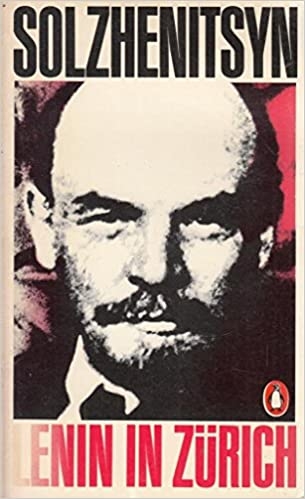 In 1975, Aleksandr Solzhenitsyn excised the several Lenin chapters from his massive and unfinished Red Wheel epic and compiled them into one volume entitled Lenin in Zürich. At the time, only one of these chapters had been published — in Knot I of the Red Wheel, known as August 1914 — while the remaining chapters would still have to languish in the author’s desk drawer for decades before appearing as part of The Red Wheel proper (November 1916 and March 1917, specifically). In order to save time and make an impression on his contemporaries, many of whom in the West still harbored misplaced sympathies for Lenin, Solzhenitsyn decided to share with the world his eye-opening and unforgettable treatment of the Soviet Revolutionary.
In 1975, Aleksandr Solzhenitsyn excised the several Lenin chapters from his massive and unfinished Red Wheel epic and compiled them into one volume entitled Lenin in Zürich. At the time, only one of these chapters had been published — in Knot I of the Red Wheel, known as August 1914 — while the remaining chapters would still have to languish in the author’s desk drawer for decades before appearing as part of The Red Wheel proper (November 1916 and March 1917, specifically). In order to save time and make an impression on his contemporaries, many of whom in the West still harbored misplaced sympathies for Lenin, Solzhenitsyn decided to share with the world his eye-opening and unforgettable treatment of the Soviet Revolutionary.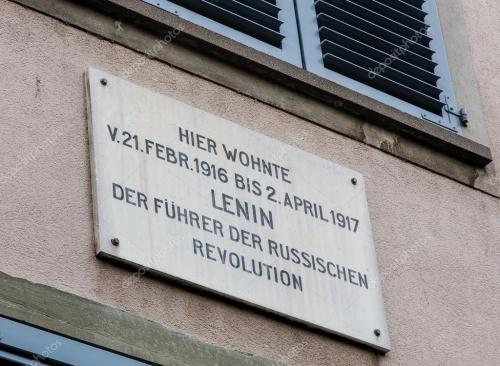
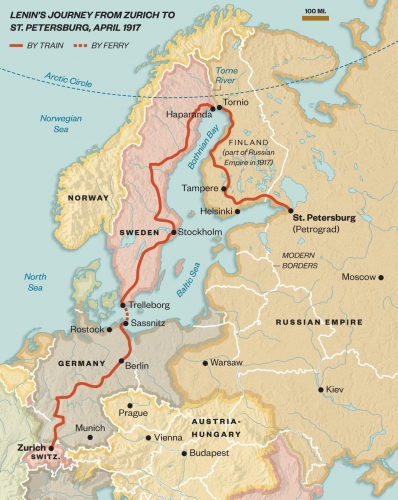
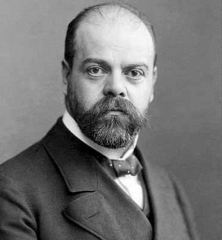 A man known as Parvus appears foremost among the Jews in Lenin in Zürich. Born Izrail Lazarevich Gelfand, he comes across, at least to Lenin, as an enigmatic and somewhat unscrupulous capitalist and millionaire who, for some reason, dedicates his life to socialist causes. Either this, or he wishes to destroy Russia while exhibiting a suspicious allegiance to Germany. Parvus, along with his protégé Leon Trotsky, had tried and failed to overthrow the Tsar in 1905, and now offers a new plan: With his deep contacts in the German government, he will arrange for the Bolsheviks’ to travel through Germany in order to re-enter Russia where they can foment revolution against a weakened Tsar. This would serve not only Lenin but Parvus’ German friends as well by knocking Russia out of the war. Suspicious of Parvus’ outsider status, and especially of his tolerance of Lenin’s detested Mensheviks, Lenin at first refuses. However, he cannot shake his respect and fascination for this mysterious benefactor.
A man known as Parvus appears foremost among the Jews in Lenin in Zürich. Born Izrail Lazarevich Gelfand, he comes across, at least to Lenin, as an enigmatic and somewhat unscrupulous capitalist and millionaire who, for some reason, dedicates his life to socialist causes. Either this, or he wishes to destroy Russia while exhibiting a suspicious allegiance to Germany. Parvus, along with his protégé Leon Trotsky, had tried and failed to overthrow the Tsar in 1905, and now offers a new plan: With his deep contacts in the German government, he will arrange for the Bolsheviks’ to travel through Germany in order to re-enter Russia where they can foment revolution against a weakened Tsar. This would serve not only Lenin but Parvus’ German friends as well by knocking Russia out of the war. Suspicious of Parvus’ outsider status, and especially of his tolerance of Lenin’s detested Mensheviks, Lenin at first refuses. However, he cannot shake his respect and fascination for this mysterious benefactor.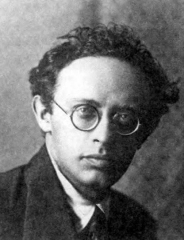 Another Jew who figures prominently in Lenin in Zürich is Radek (born Karl Berngardovich Sobelsohn). Lenin has tremendous respect for Radek as a writer and propagandist — that Radek had become one of the Soviet Union’s most prominent journalists years after Lenin’s death certainly justifies Lenin’s esteem. In all, he is clever and resourceful and the only person to whom Lenin would voluntarily surrender his pen. After the February Revolution in Russia, as Lenin prepares for travel back to his home country according to Parvus’ plan, Radek contrives ingenious solutions to formidable logistical problems that threaten to sink the enterprise. This makes Lenin, for one of the few times in the book, truly happy.
Another Jew who figures prominently in Lenin in Zürich is Radek (born Karl Berngardovich Sobelsohn). Lenin has tremendous respect for Radek as a writer and propagandist — that Radek had become one of the Soviet Union’s most prominent journalists years after Lenin’s death certainly justifies Lenin’s esteem. In all, he is clever and resourceful and the only person to whom Lenin would voluntarily surrender his pen. After the February Revolution in Russia, as Lenin prepares for travel back to his home country according to Parvus’ plan, Radek contrives ingenious solutions to formidable logistical problems that threaten to sink the enterprise. This makes Lenin, for one of the few times in the book, truly happy.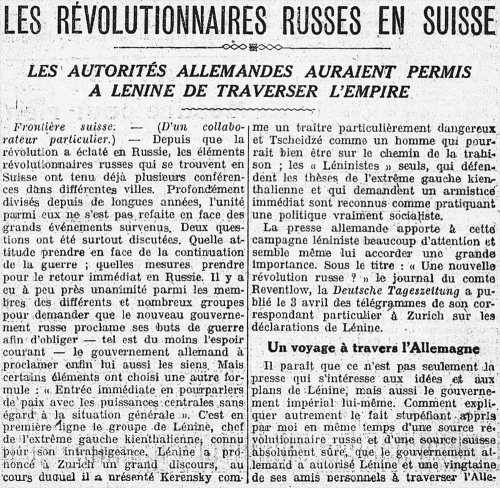
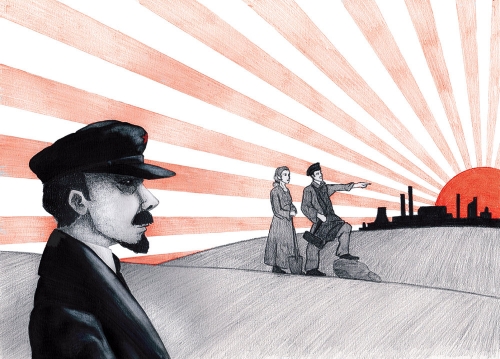



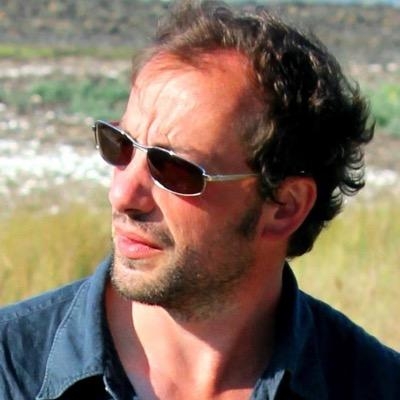
 Vous aurez peut-être remarqué que tous les idiots de France et de Navarre, et Dieu sait comme ils sont nombreux, nous répètent en boucle que, demain, rien ne sera plus jamais comme avant, alors bien évidemment que, demain, ce sera encore pire qu’hier : plus de pollution, plus de consommation, plus de saccage, puisqu’il faudra en somme reprendre, en mettant les bouchées doubles, là où cette regrettable pandémie nous a stoppés net. Au rebours de ces pseudo-analyses, c’est la société occidentale techno-marchande dans son ensemble qui depuis bien des lustres est passée en mode de confinement, et même qu’elle est résolument, de plus en plus implacablement confinée. Pour le dire sur les brisées de Carl Schmitt commenté par Giorgio Agamben, l’état d’exception est devenu la norme : flicage à tous les niveaux, dans les rues et sur les autoroutes virtuelles, prépondérance des discours des « sachants » au détriment des « apprenants » voire des ignorants que nous sommes tous plus ou moins devenus, démonstration quotidienne bien que décomplexée et même parfaitement méprisante de l’incompétence criminelle de nos gouvernements et relais étatiques, individus infantilisés par l’obligation de respecter protocoles sanitaires et gestes barrières, dématérialisation accentuée, triomphe de la novlangue managériale étendue à toutes les sphères de la société et, d’abord, au monde de la santé au sens le plus large, pandémie de la non-parole journalistique s’alimentant de ses propres discours bien davantage que de la réalité, etc..
Vous aurez peut-être remarqué que tous les idiots de France et de Navarre, et Dieu sait comme ils sont nombreux, nous répètent en boucle que, demain, rien ne sera plus jamais comme avant, alors bien évidemment que, demain, ce sera encore pire qu’hier : plus de pollution, plus de consommation, plus de saccage, puisqu’il faudra en somme reprendre, en mettant les bouchées doubles, là où cette regrettable pandémie nous a stoppés net. Au rebours de ces pseudo-analyses, c’est la société occidentale techno-marchande dans son ensemble qui depuis bien des lustres est passée en mode de confinement, et même qu’elle est résolument, de plus en plus implacablement confinée. Pour le dire sur les brisées de Carl Schmitt commenté par Giorgio Agamben, l’état d’exception est devenu la norme : flicage à tous les niveaux, dans les rues et sur les autoroutes virtuelles, prépondérance des discours des « sachants » au détriment des « apprenants » voire des ignorants que nous sommes tous plus ou moins devenus, démonstration quotidienne bien que décomplexée et même parfaitement méprisante de l’incompétence criminelle de nos gouvernements et relais étatiques, individus infantilisés par l’obligation de respecter protocoles sanitaires et gestes barrières, dématérialisation accentuée, triomphe de la novlangue managériale étendue à toutes les sphères de la société et, d’abord, au monde de la santé au sens le plus large, pandémie de la non-parole journalistique s’alimentant de ses propres discours bien davantage que de la réalité, etc..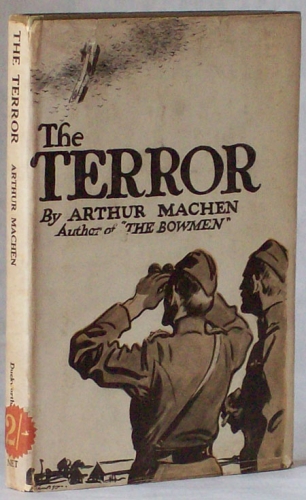 Non, la période dite de confinement n’a rien de vraiment très original, avouons-le même si, comme je l’ai dit, elle a pu faire figure, aussi étrange que fragile, d’un courte, trop courte parenthèse ayant ralenti l’avancée inexorable de la Machine, et permettre à la nature, durant un battement de sa paupière en plexiglass, de se rappeler à notre bon souvenir, sans l’aspect tragique et vengeur qu’illustre Arthur Machen dans une remarquable nouvelle intitulée La Terreur.
Non, la période dite de confinement n’a rien de vraiment très original, avouons-le même si, comme je l’ai dit, elle a pu faire figure, aussi étrange que fragile, d’un courte, trop courte parenthèse ayant ralenti l’avancée inexorable de la Machine, et permettre à la nature, durant un battement de sa paupière en plexiglass, de se rappeler à notre bon souvenir, sans l’aspect tragique et vengeur qu’illustre Arthur Machen dans une remarquable nouvelle intitulée La Terreur.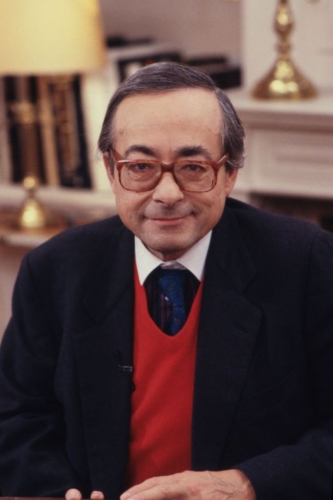
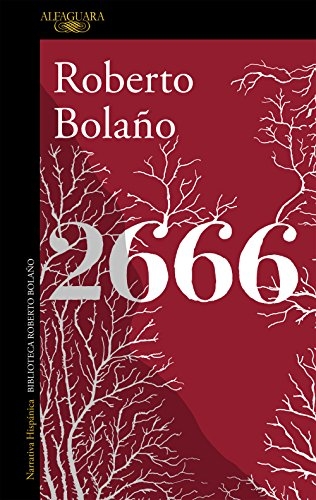 Roberto Bolaño n’a eu de cesse de s’interroger sur cette question aussi fameuse que délicate, répondant de multiples façons dans presque chacune de ses œuvres, jusqu’à l’œuvre au noir que fut 2666. Résumons l’ensemble de ces réponses apportées par le biais d’ingénieuses figurations littéraires du Mal en affirmant que, pour le grand écrivain chilien comme pour d’autres romanciers, la plus grande œuvre d’art jamais ne saurait se bâtir sur des pleurs et des grincements de dents, encore moins sur du sang.
Roberto Bolaño n’a eu de cesse de s’interroger sur cette question aussi fameuse que délicate, répondant de multiples façons dans presque chacune de ses œuvres, jusqu’à l’œuvre au noir que fut 2666. Résumons l’ensemble de ces réponses apportées par le biais d’ingénieuses figurations littéraires du Mal en affirmant que, pour le grand écrivain chilien comme pour d’autres romanciers, la plus grande œuvre d’art jamais ne saurait se bâtir sur des pleurs et des grincements de dents, encore moins sur du sang.
 del.icio.us
del.icio.us
 Digg
Digg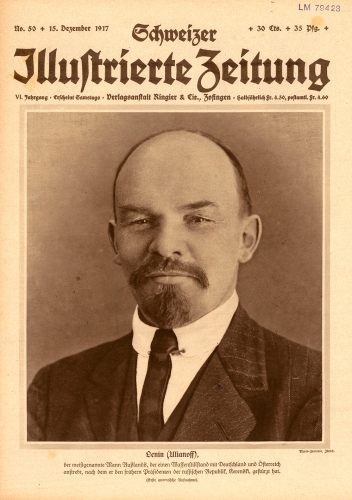
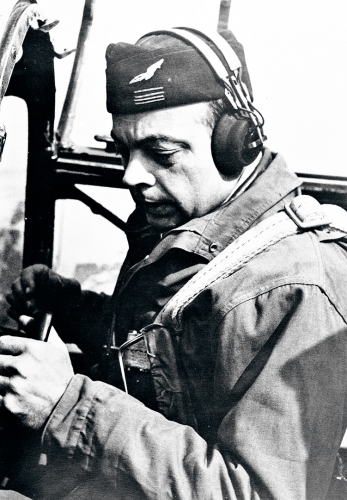
 Il est par comparaison aisé d'évoquer une victoire, toujours une occasion d'affirmer son moi et de se hisser sur le pavois. On ne peut à ce sujet qu'opposer une épopée au récit d'une défaite dans la mesure où son caractère grandiloquent va à l'encontre de tout désir de lucidité. L'épopée vise au grandissement, voire à une exagération tendant à la valorisation de tout un peuple. Mais il peut exister un autre type de narration, propre des vieilles civilisations ayant acquis une profonde expérience de l'âme humaine, qui donne toute la mesure de celle-ci quand elle est confrontée à l'épreuve. C'est une vieille idée, l'être qui reçoit un coup de bâton connaît un état affectif lui donnant subitement une plus grande conscience de lui-même.
Il est par comparaison aisé d'évoquer une victoire, toujours une occasion d'affirmer son moi et de se hisser sur le pavois. On ne peut à ce sujet qu'opposer une épopée au récit d'une défaite dans la mesure où son caractère grandiloquent va à l'encontre de tout désir de lucidité. L'épopée vise au grandissement, voire à une exagération tendant à la valorisation de tout un peuple. Mais il peut exister un autre type de narration, propre des vieilles civilisations ayant acquis une profonde expérience de l'âme humaine, qui donne toute la mesure de celle-ci quand elle est confrontée à l'épreuve. C'est une vieille idée, l'être qui reçoit un coup de bâton connaît un état affectif lui donnant subitement une plus grande conscience de lui-même. 
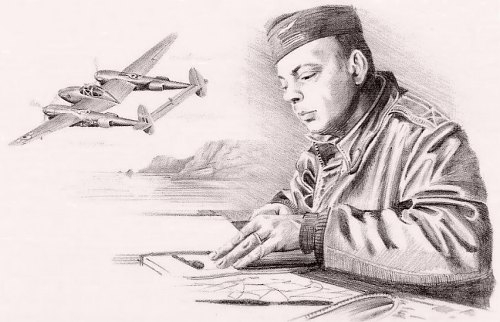
 L'égalité, si elle s'applique aux droits de chacun, se doit aussi de concerner leurs devoirs, ce qu'a oublié la Révolution française et qu'avait enseigné le christianisme. Or, ceux-ci diffèrent entre les personnes, comme l'évoque le mythe des pierres dont parle Saint-Exupéry. Toutes les pierres constituant la cathédrale ont une importance qui varie selon leur place dans l'édifice. Le libéralisme, qui veut disperser toutes les pierres, ne l'a pas compris ; encore moins le marxisme, lequel veut rassembler ces pierres pour en faire un tas informe où tous les éléments seront identiques et où l'individu sera écrasé par la masse. « Ce que je hais dans le marxisme, c'est le totalitarisme à quoi il conduit. L'homme y est défini comme producteur et consommateur, le problème essentiel étant celui de la distribution » [14] disait l'écrivain.
L'égalité, si elle s'applique aux droits de chacun, se doit aussi de concerner leurs devoirs, ce qu'a oublié la Révolution française et qu'avait enseigné le christianisme. Or, ceux-ci diffèrent entre les personnes, comme l'évoque le mythe des pierres dont parle Saint-Exupéry. Toutes les pierres constituant la cathédrale ont une importance qui varie selon leur place dans l'édifice. Le libéralisme, qui veut disperser toutes les pierres, ne l'a pas compris ; encore moins le marxisme, lequel veut rassembler ces pierres pour en faire un tas informe où tous les éléments seront identiques et où l'individu sera écrasé par la masse. « Ce que je hais dans le marxisme, c'est le totalitarisme à quoi il conduit. L'homme y est défini comme producteur et consommateur, le problème essentiel étant celui de la distribution » [14] disait l'écrivain. 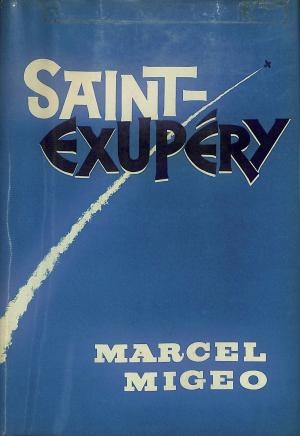 Marcel Migeo, Saint-Exupéry. Paris : Flammarion, 1958.
Marcel Migeo, Saint-Exupéry. Paris : Flammarion, 1958. 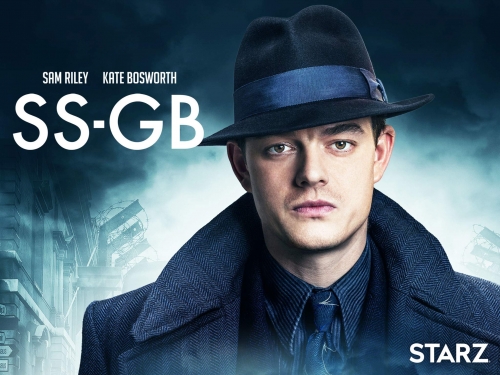
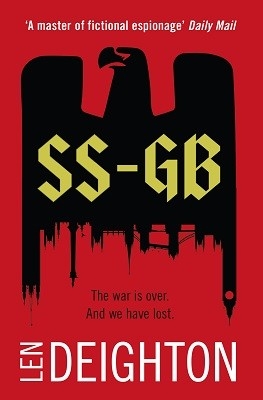 Historien de formation, l’auteur plonge le lecteur à la fin de l’année 1941 dans une Angleterre vaincue et occupée par l’Allemagne. Si le roi George VI est prisonnier dans la Tour de Londres, son épouse et leurs filles, la princesse héritière Elizabeth et sa sœur Margaret, vivent en exil en Nouvelle-Zélande. Winston Churchill est pendu haut et court. À l’instar de l’éphémère « France libre » de Charles de Gaulle qui « s’est promu général et [qui] a déclaré qu’il était la voix de la France. Ça n’a jamais abouti à rien (p. 174) », la « Grande-Bretagne libre » s’incarne depuis l’Amérique du Nord dans un certain contre-amiral Conolly. Cette résistance extérieure complète une résistance intérieure plus ou moins balbutiante.
Historien de formation, l’auteur plonge le lecteur à la fin de l’année 1941 dans une Angleterre vaincue et occupée par l’Allemagne. Si le roi George VI est prisonnier dans la Tour de Londres, son épouse et leurs filles, la princesse héritière Elizabeth et sa sœur Margaret, vivent en exil en Nouvelle-Zélande. Winston Churchill est pendu haut et court. À l’instar de l’éphémère « France libre » de Charles de Gaulle qui « s’est promu général et [qui] a déclaré qu’il était la voix de la France. Ça n’a jamais abouti à rien (p. 174) », la « Grande-Bretagne libre » s’incarne depuis l’Amérique du Nord dans un certain contre-amiral Conolly. Cette résistance extérieure complète une résistance intérieure plus ou moins balbutiante.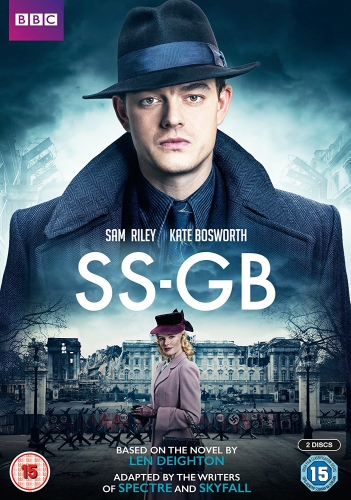
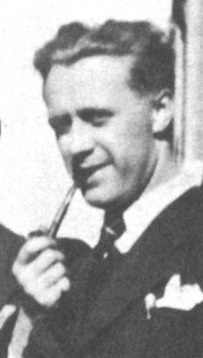
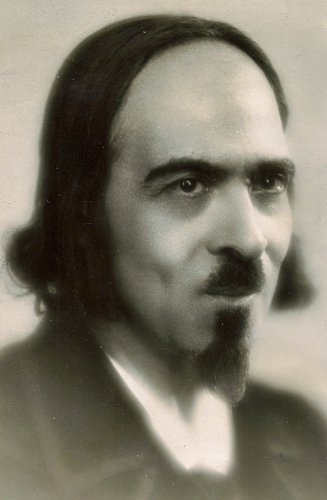
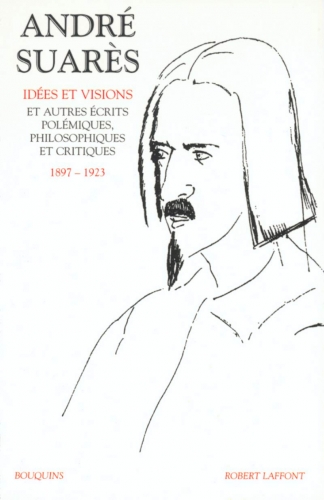 « Tout est voile en plein ciel. Rien n'est allégorie et tout est Symbole ». Là se précise la métaphysique d'André Suarès dont l'œuvre toute entière semble destinée à nous délivrer de la fadaise allégorique et à laisser resplendir en nous la beauté et la vérité du Symbole. Alors que l'allégorie s'abolit dans ce qu'elle allégorise, qu'elle n'est qu'une formulation provisoire, vouée à périr dans l'abstraction qu'elle désigne, le Symbole sauvegarde le visible dans l'invisible et l'invisible dans le visible. La part visible du Symbole est inséparable de sa part invisible; elle demeure dans le mystère ingénu de sa forme, de sa vocation; et de ne point s'étioler dans l'invisible auquel elle se rapporte, lorsque nous l'atteignons, elle acquiert, ici-bas, comme pour la première fois, la splendeur de la beauté dont elle est le nom et l'épiphanie.
« Tout est voile en plein ciel. Rien n'est allégorie et tout est Symbole ». Là se précise la métaphysique d'André Suarès dont l'œuvre toute entière semble destinée à nous délivrer de la fadaise allégorique et à laisser resplendir en nous la beauté et la vérité du Symbole. Alors que l'allégorie s'abolit dans ce qu'elle allégorise, qu'elle n'est qu'une formulation provisoire, vouée à périr dans l'abstraction qu'elle désigne, le Symbole sauvegarde le visible dans l'invisible et l'invisible dans le visible. La part visible du Symbole est inséparable de sa part invisible; elle demeure dans le mystère ingénu de sa forme, de sa vocation; et de ne point s'étioler dans l'invisible auquel elle se rapporte, lorsque nous l'atteignons, elle acquiert, ici-bas, comme pour la première fois, la splendeur de la beauté dont elle est le nom et l'épiphanie. 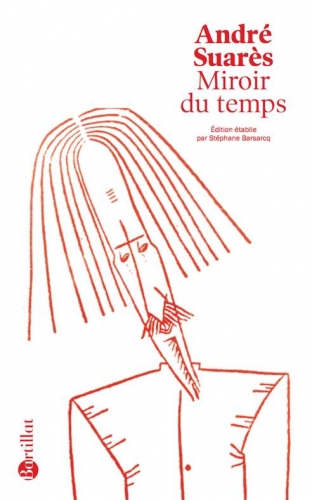 Les ultimes pages écrites par André Suarès, réunies sous le titre Le Paraclet (et que nous devons lire exactement, selon la formule consacrée, comme son « testament spirituel ») ressaisissent en un seul geste les préoccupations esthétiques, métaphysiques, religieuses et morales de l'auteur. Elles sont à la fois son Ecce homo et un viatique pour ses successeurs. Elles récapitulent non moins qu'elles annoncent. Le dernier mot est toujours un avant-dire.
Les ultimes pages écrites par André Suarès, réunies sous le titre Le Paraclet (et que nous devons lire exactement, selon la formule consacrée, comme son « testament spirituel ») ressaisissent en un seul geste les préoccupations esthétiques, métaphysiques, religieuses et morales de l'auteur. Elles sont à la fois son Ecce homo et un viatique pour ses successeurs. Elles récapitulent non moins qu'elles annoncent. Le dernier mot est toujours un avant-dire. 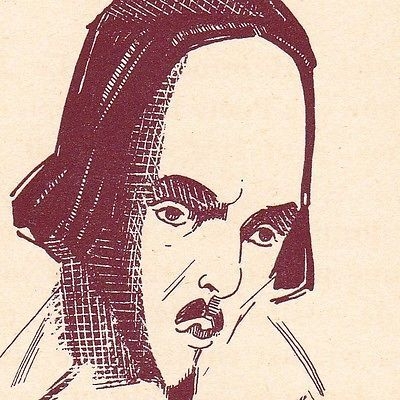 Ne nous leurrons pas davantage: l'Art sera paraclétique ou ne sera pas. Tout Art est sacré par définition, c'est-à-dire par provenance et par destination. L'Art profane fut une utopie fallacieuse qui finit comme nous la voyons: en calembredaines publicitaires. Le grand Art moderne fut une reconquête du sacré contre les bondieuseries et les saintsulpiceries « réalistes ». Le retour aux ibères et aux étrusques de Picasso, le catholicisme mystique de Cézanne (dont il conviendrait de relire les écrits), les subtiles épiphanies de Vuillard qui irisent et approfondissent le réel, qui dévoilent ce réel qui est vrai et cette vérité qui est réelle, offrent au regard ce qu'il faut bien considérer comme les étapes d'un cheminement, les moments d'un combat qui ne sauraient se résoudre en une théologie rationnelle. « Paraclet, Paraclet, Saint-Esprit, sois l'hôte: reçois et sois reçu ».
Ne nous leurrons pas davantage: l'Art sera paraclétique ou ne sera pas. Tout Art est sacré par définition, c'est-à-dire par provenance et par destination. L'Art profane fut une utopie fallacieuse qui finit comme nous la voyons: en calembredaines publicitaires. Le grand Art moderne fut une reconquête du sacré contre les bondieuseries et les saintsulpiceries « réalistes ». Le retour aux ibères et aux étrusques de Picasso, le catholicisme mystique de Cézanne (dont il conviendrait de relire les écrits), les subtiles épiphanies de Vuillard qui irisent et approfondissent le réel, qui dévoilent ce réel qui est vrai et cette vérité qui est réelle, offrent au regard ce qu'il faut bien considérer comme les étapes d'un cheminement, les moments d'un combat qui ne sauraient se résoudre en une théologie rationnelle. « Paraclet, Paraclet, Saint-Esprit, sois l'hôte: reçois et sois reçu ». 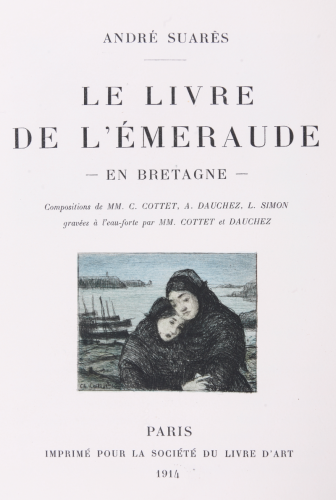 C'est assez pour comprendre que le Paraclet est à la fois au principe d'une Quête chevaleresque et d'une attente eschatologique. Toutefois cette attente ne sera point passive: elle ne sera pas ce consentement au destin que les matérialistes nomment déterminisme et que certains dévots veulent faire passer, en la profanant odieusement, pour un assentiment à la divine Providence. Pour André Suarès, le Règne n'advient que pour autant que nous le fassions advenir. L'attente n'est point soumise, elle est ardente: elle est cette attention ardente qui est le sens et la vertu même de la poésie, de l'acte d'être à l'impératif de celui qui crée dans le péril, dans l'attente extrême où tout se joue dans l'instant et à jamais: « A chaque pas, le coup de dé: le risque de tout perdre se joue contre une chance éternelle. Il ne s'agit pas de repos: la paix est dans la victoire, et l'on ne vainc que dans la lutte. Cette palme pousse sur l'arbre sacré de la connaissance. Le jardin de l'esprit est l'Eden, dont nul ne peut être chassé, s'il entre. Ouvre-le, Paraclet: c'est ton paradis. En proie à ton désir insatiable, l'homme en quête de son éternité, Paraclet, t'invoque: il t'appelle, entends sa voix et réponds-lui ».
C'est assez pour comprendre que le Paraclet est à la fois au principe d'une Quête chevaleresque et d'une attente eschatologique. Toutefois cette attente ne sera point passive: elle ne sera pas ce consentement au destin que les matérialistes nomment déterminisme et que certains dévots veulent faire passer, en la profanant odieusement, pour un assentiment à la divine Providence. Pour André Suarès, le Règne n'advient que pour autant que nous le fassions advenir. L'attente n'est point soumise, elle est ardente: elle est cette attention ardente qui est le sens et la vertu même de la poésie, de l'acte d'être à l'impératif de celui qui crée dans le péril, dans l'attente extrême où tout se joue dans l'instant et à jamais: « A chaque pas, le coup de dé: le risque de tout perdre se joue contre une chance éternelle. Il ne s'agit pas de repos: la paix est dans la victoire, et l'on ne vainc que dans la lutte. Cette palme pousse sur l'arbre sacré de la connaissance. Le jardin de l'esprit est l'Eden, dont nul ne peut être chassé, s'il entre. Ouvre-le, Paraclet: c'est ton paradis. En proie à ton désir insatiable, l'homme en quête de son éternité, Paraclet, t'invoque: il t'appelle, entends sa voix et réponds-lui ». Nulle âme ne fut moins servile que celle d'André Suarès, nulle n'aspira avec une telle ferveur, faite d'humilité et de colère, à l'amitié divine. D'où sa méfiance constante pour les religiosités légalitaires, les théologies rationnelles, et les dévotions grégaires. « Après le Père, le Fils; après le Fils, le Saint-Esprit: les grandeurs ne se distinguent pas, elles s'accomplissent. Le Troisième Règne n'est pas la confusion ni l'opposition des deux autres, mais leur révélation dans la conscience de l'homme. Et l'homme alors possédé par l'Esprit, doit entrer en possession. Les plus amants de Dieu, les plus spirituels et les plus mystiques sont les plus suspects d'hérésie. »
Nulle âme ne fut moins servile que celle d'André Suarès, nulle n'aspira avec une telle ferveur, faite d'humilité et de colère, à l'amitié divine. D'où sa méfiance constante pour les religiosités légalitaires, les théologies rationnelles, et les dévotions grégaires. « Après le Père, le Fils; après le Fils, le Saint-Esprit: les grandeurs ne se distinguent pas, elles s'accomplissent. Le Troisième Règne n'est pas la confusion ni l'opposition des deux autres, mais leur révélation dans la conscience de l'homme. Et l'homme alors possédé par l'Esprit, doit entrer en possession. Les plus amants de Dieu, les plus spirituels et les plus mystiques sont les plus suspects d'hérésie. »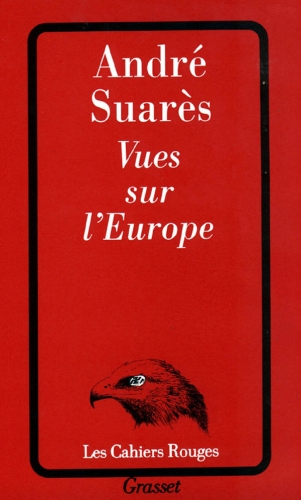 Ce monde est « en creux » du Paraclet. Il est le « non-être », l'ennui, l'informe, le malheur que l'on combat et ce combat est de chaque seconde car, en chaque seconde, se tient la promesse du Paraclet, du Tiers Règne, que nous faisons advenir. « Ce qui nous sépare de l'Esprit est le seul malheur qui compte: hélas, il surgit de toute part; tout lui est occasion de nous faire obstacle. Ce mal nous guette, il est partout. » L'attente paraclétique est ainsi, non point passivité, mais activité créatrice où les formes nouvelles renaissent des formes vaincues, où l'instrument même de l'Art en vient à modifier celui qui en use, dans une connaissance plus profonde du monde et de lui-même. « Connaître Dieu, c'est être et faire. Etre dans le faire, et faire dans être. Tel est le miracle: une connaissance si adéquate de l'objet qu'elle est l'objet même ». L'être est « acte d'être », le « faire », autrement dit la poésie, est l'être même. Il n'est point antérieur à l'être; il est sa puissance instauratrice, éternellement contemporaine de ce qu'elle instaure. L'Art métaphysique est ce site incandescent où l'être et le faire sont une seule et même réalité.
Ce monde est « en creux » du Paraclet. Il est le « non-être », l'ennui, l'informe, le malheur que l'on combat et ce combat est de chaque seconde car, en chaque seconde, se tient la promesse du Paraclet, du Tiers Règne, que nous faisons advenir. « Ce qui nous sépare de l'Esprit est le seul malheur qui compte: hélas, il surgit de toute part; tout lui est occasion de nous faire obstacle. Ce mal nous guette, il est partout. » L'attente paraclétique est ainsi, non point passivité, mais activité créatrice où les formes nouvelles renaissent des formes vaincues, où l'instrument même de l'Art en vient à modifier celui qui en use, dans une connaissance plus profonde du monde et de lui-même. « Connaître Dieu, c'est être et faire. Etre dans le faire, et faire dans être. Tel est le miracle: une connaissance si adéquate de l'objet qu'elle est l'objet même ». L'être est « acte d'être », le « faire », autrement dit la poésie, est l'être même. Il n'est point antérieur à l'être; il est sa puissance instauratrice, éternellement contemporaine de ce qu'elle instaure. L'Art métaphysique est ce site incandescent où l'être et le faire sont une seule et même réalité.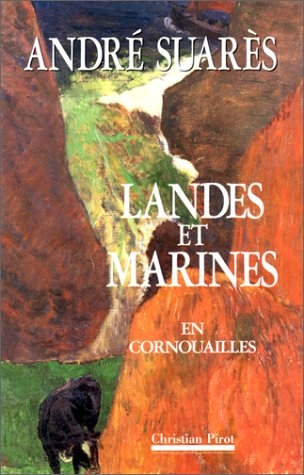 Nous empruntons cette citation, non plus à André Suarès, mais à ce roman initiatique ismaélien, commenté par Henry Corbin, auquel nous faisions allusion plus haut: « Savoir, c'est recevoir une information d'un autre. Comprendre, c'est voir soi-même de ses propres yeux. » Le Paraclet n'appartient point au dogme, il ne se récite point, il n'administre aucune conformité, il advient, il est le regard même, lorsque les yeux de chair se changent en yeux de feu. L'espace et le temps profanes sont alors frappés d'inconsistance, car le temps est devenu espace. Et ce qui se disait dans le secret des gnoses iraniennes entre en concordance avec l'attente de Caërdal et du Condottiere, ces deux figures suarésiennes. Il est ainsi permis de voir en André Suarès à la fois l'héritier et l'intercesseur, le continuateur et le recréateur de cet éternel combat entre le dogme oublieux de son propre sens, et le sens reconquis, la Parole Retrouvée par ses propres forces, par l'entremise d'un homme. « La vue du Paraclet est à moi. Tout ce qu'elle a de merveilleux est mien (...), je ne veux pas me laisser dépouiller d'une vaste espérance. Je ne laisse pas mon droit d'aînesse pour un plat de lentilles véreuses, bouillies dans un journal ». La révolte d'André Suarès est légitime, sa vision lui appartient, même si elle apparût à d'autres, et par-delà dix siècles le philosophe inconnu iranien lui donne raison: « C'est qu'en effet celui qui cherche le vrai sans connaître les portes de la recherche, celui-là sera d'autant plus prompt à accuser les autres d'erreur, et cela parce que les éclats du faux se manifestent par l'hypocrisie et l'accord des opinions, le conformisme ou de dogmatisme du groupe, tandis que les éclats du Vrai se manifestent par l'épreuve que l'on affronte et les passions que l'on déchaîne contre soi. »
Nous empruntons cette citation, non plus à André Suarès, mais à ce roman initiatique ismaélien, commenté par Henry Corbin, auquel nous faisions allusion plus haut: « Savoir, c'est recevoir une information d'un autre. Comprendre, c'est voir soi-même de ses propres yeux. » Le Paraclet n'appartient point au dogme, il ne se récite point, il n'administre aucune conformité, il advient, il est le regard même, lorsque les yeux de chair se changent en yeux de feu. L'espace et le temps profanes sont alors frappés d'inconsistance, car le temps est devenu espace. Et ce qui se disait dans le secret des gnoses iraniennes entre en concordance avec l'attente de Caërdal et du Condottiere, ces deux figures suarésiennes. Il est ainsi permis de voir en André Suarès à la fois l'héritier et l'intercesseur, le continuateur et le recréateur de cet éternel combat entre le dogme oublieux de son propre sens, et le sens reconquis, la Parole Retrouvée par ses propres forces, par l'entremise d'un homme. « La vue du Paraclet est à moi. Tout ce qu'elle a de merveilleux est mien (...), je ne veux pas me laisser dépouiller d'une vaste espérance. Je ne laisse pas mon droit d'aînesse pour un plat de lentilles véreuses, bouillies dans un journal ». La révolte d'André Suarès est légitime, sa vision lui appartient, même si elle apparût à d'autres, et par-delà dix siècles le philosophe inconnu iranien lui donne raison: « C'est qu'en effet celui qui cherche le vrai sans connaître les portes de la recherche, celui-là sera d'autant plus prompt à accuser les autres d'erreur, et cela parce que les éclats du faux se manifestent par l'hypocrisie et l'accord des opinions, le conformisme ou de dogmatisme du groupe, tandis que les éclats du Vrai se manifestent par l'épreuve que l'on affronte et les passions que l'on déchaîne contre soi. »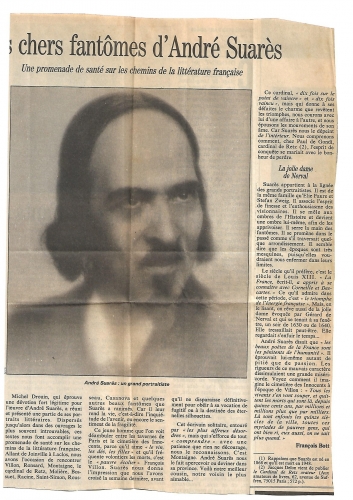
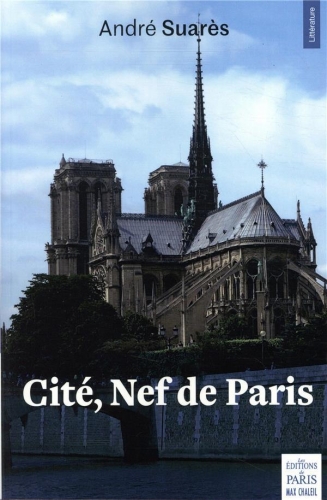 L'impératif divin, le « soit ! » illuminateur se prouve en faisant de chacun un « unique ». Qu'en ce monde toute chose fût dissemblable, qu'il n'y eût point un flocon de neige à l'exacte ressemblance de son voisin dans la nuit de Décembre, cela vaut bien toutes les démonstrations de l'existence de Dieu. Au demeurant, Dieu n'existe pas. C'est à trop croire en l'existence de Dieu que se gonflent les grenouilles de bénitier, que s'hypertrophie le Moi des fanatiques, ces bœufs attelés. Là où il faudrait se dépouiller, se dénuder, s'abolir, le fanatique se vêt, s'adorne, s'affirme. Il ne mesure nullement ce qu'il convient de restituer à César car il veut être César à la place de César. Le pouvoir l'enivre plus encore que la puissance, l'existence lui paraît plus adorable que l'être, surtout lorsque ce qui existe, il croit le posséder. Le fanatique est ainsi l'avers du progressiste. Là encore Suarès voit juste, avant tout le monde. Ce ne sont point des contraires qui se combattent, mais des semblables, autrement dit deux formes de grégarisme au sein de la même termitière, et l'on hésite franchement à trancher pour savoir laquelle est la pire. Le pire ne se mesure point. « Au fond de tous les fanatiques, grouille l'hydre: le plus hideux amour-propre. Ils font semblant de servir un Dieu; plus d'un le croit peut-être, tant les fanatiques ont de complaisance à eux-mêmes, tant ils sont étroits et obscurcis par leurs propres ténèbres. Mais ils ne respirent que l'orgueil d'être soi. Ils sont prêts à tous les attentats, à tous les crimes pour continuer de prévaloir. Et ils font parler Dieu, l'Etat, la gloire, ou quelque autre abjecte incarnation de l'Empire. Ils sont stupide à la racine; et d'autant plus forte est la racine en eux qu'ils sont plus stupides. Le propre du fanatisme, en attendant que Dieu parle, est de faire parler Dieu. Et, bien entendu, la plupart ils n'y croient pas: il leur suffit de confondre Dieu avec soi. Les plus scélérats y réunissent mieux que les autres. »
L'impératif divin, le « soit ! » illuminateur se prouve en faisant de chacun un « unique ». Qu'en ce monde toute chose fût dissemblable, qu'il n'y eût point un flocon de neige à l'exacte ressemblance de son voisin dans la nuit de Décembre, cela vaut bien toutes les démonstrations de l'existence de Dieu. Au demeurant, Dieu n'existe pas. C'est à trop croire en l'existence de Dieu que se gonflent les grenouilles de bénitier, que s'hypertrophie le Moi des fanatiques, ces bœufs attelés. Là où il faudrait se dépouiller, se dénuder, s'abolir, le fanatique se vêt, s'adorne, s'affirme. Il ne mesure nullement ce qu'il convient de restituer à César car il veut être César à la place de César. Le pouvoir l'enivre plus encore que la puissance, l'existence lui paraît plus adorable que l'être, surtout lorsque ce qui existe, il croit le posséder. Le fanatique est ainsi l'avers du progressiste. Là encore Suarès voit juste, avant tout le monde. Ce ne sont point des contraires qui se combattent, mais des semblables, autrement dit deux formes de grégarisme au sein de la même termitière, et l'on hésite franchement à trancher pour savoir laquelle est la pire. Le pire ne se mesure point. « Au fond de tous les fanatiques, grouille l'hydre: le plus hideux amour-propre. Ils font semblant de servir un Dieu; plus d'un le croit peut-être, tant les fanatiques ont de complaisance à eux-mêmes, tant ils sont étroits et obscurcis par leurs propres ténèbres. Mais ils ne respirent que l'orgueil d'être soi. Ils sont prêts à tous les attentats, à tous les crimes pour continuer de prévaloir. Et ils font parler Dieu, l'Etat, la gloire, ou quelque autre abjecte incarnation de l'Empire. Ils sont stupide à la racine; et d'autant plus forte est la racine en eux qu'ils sont plus stupides. Le propre du fanatisme, en attendant que Dieu parle, est de faire parler Dieu. Et, bien entendu, la plupart ils n'y croient pas: il leur suffit de confondre Dieu avec soi. Les plus scélérats y réunissent mieux que les autres. » 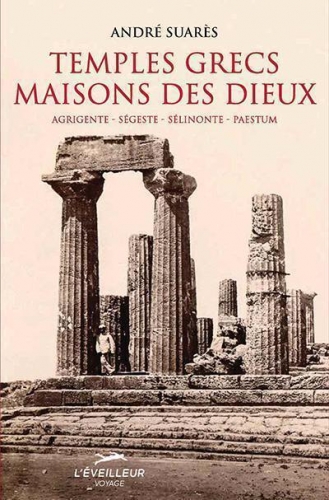 Métaphysique concrète, la prière est le « faire advenir », l'acte poétique accomplissant le pressentiment prophétique. « Non plus serviteur mais ami », comme le dit l'Evangile de Jean, l'homme de prière, selon la formule de Maître Eckhart, « ne trafique point avec Notre Seigneur » ni ne renonce aux ressources de la raison. Les œuvres sont des prières destinées à sauver ceux qui ne pas savent prier et ceux-là encore qui savent prier mais n'entendent point d'échos dans les nuées amassées au-dessus de leurs têtes. Ils se courbent alors et veulent convaincre autrui à vivre, comme eux, penchés: ce qu'ils nomment leur « prosélytisme ». L'inclination est forte, chez les dévots, à vouloir faire croire d'autres qu'eux-mêmes à ce dont ils croient si peu. Le fanatisme, dont on glose beaucoup ces derniers temps, n'est pas une intensification de la croyance, mais son épuisement. Les fanatiques ne vivent que dans une seule crainte: n'être pas assez nombreux, n'être pas assez agrégés dans leurs incertitudes. D'où leur girouettisme notoire. Mais ce n'est point le souffle de l'Esprit qui les oriente mais le typhon de l'Histoire humaine « pleine de bruits et de fureurs ». Ils veulent rassembler, marcher du même pas, chanter ou vociférer en chœur au bord des routes, ou, mieux encore, sur les écrans de télévision. Ils ignorent tout de la solitude du cœur, de l'esseulement de la pensée, de l'Un dont ils se targuent et qu'ils réduisent aux dimensions de leur Moi, voire de leurs petites affaires financières.
Métaphysique concrète, la prière est le « faire advenir », l'acte poétique accomplissant le pressentiment prophétique. « Non plus serviteur mais ami », comme le dit l'Evangile de Jean, l'homme de prière, selon la formule de Maître Eckhart, « ne trafique point avec Notre Seigneur » ni ne renonce aux ressources de la raison. Les œuvres sont des prières destinées à sauver ceux qui ne pas savent prier et ceux-là encore qui savent prier mais n'entendent point d'échos dans les nuées amassées au-dessus de leurs têtes. Ils se courbent alors et veulent convaincre autrui à vivre, comme eux, penchés: ce qu'ils nomment leur « prosélytisme ». L'inclination est forte, chez les dévots, à vouloir faire croire d'autres qu'eux-mêmes à ce dont ils croient si peu. Le fanatisme, dont on glose beaucoup ces derniers temps, n'est pas une intensification de la croyance, mais son épuisement. Les fanatiques ne vivent que dans une seule crainte: n'être pas assez nombreux, n'être pas assez agrégés dans leurs incertitudes. D'où leur girouettisme notoire. Mais ce n'est point le souffle de l'Esprit qui les oriente mais le typhon de l'Histoire humaine « pleine de bruits et de fureurs ». Ils veulent rassembler, marcher du même pas, chanter ou vociférer en chœur au bord des routes, ou, mieux encore, sur les écrans de télévision. Ils ignorent tout de la solitude du cœur, de l'esseulement de la pensée, de l'Un dont ils se targuent et qu'ils réduisent aux dimensions de leur Moi, voire de leurs petites affaires financières. 
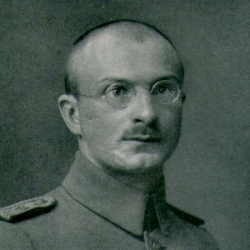 Celui qui émettait cette opinion, le faisait en toute honnêteté, et il n’a pas attendu bien longtemps pour démontrer, dans la zone russe de la Pologne, la véracité de ses dires, mais sa façon malhabile et emportée de proférer inopinément et souvent à contretemps de grandes phrases, lui valait souvent, en dépit de sa probité, de n’être que la cible d’innocentes plaisanteries.
Celui qui émettait cette opinion, le faisait en toute honnêteté, et il n’a pas attendu bien longtemps pour démontrer, dans la zone russe de la Pologne, la véracité de ses dires, mais sa façon malhabile et emportée de proférer inopinément et souvent à contretemps de grandes phrases, lui valait souvent, en dépit de sa probité, de n’être que la cible d’innocentes plaisanteries. 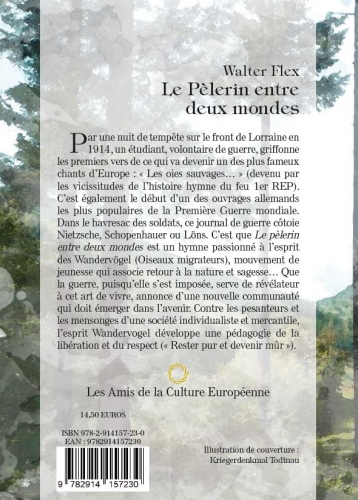


 Embauché comme reporter par le grand quotidien Le Soir, il va désormais multiplier les expéditions les plus lointaines et les entrevues exclusives. En une quinzaine d’années, ses pérégrinations vont l’emmener aux quatre coins de l’univers et lui permettre de rencontrer un nombre incroyable de personnalités de premier plan. Après le Congo (où il retournera plusieurs fois), Pierre Daye visite ainsi le Maroc, où il s’entretient avec le sultan Moulay Youssef (1881-1927), les Balkans, où il est reçu par le Premier ministre bulgare Alexandre Tsankov (1879-1959), et l’Argentine, où il se rend, en 1925, en faisant le subrécargue sur un modeste cargo. Après Buenos-Aires, où il se lie avec l’écrivain nationaliste Leopoldo Lugones (1874-1938), il traverse la Cordillière des Andes et découvre le Chili, puis se rend en Uruguay et au Brésil. En 1926, il est à Moscou, approche Léon Trotsky, Leonid Krassine (5) et Maxime Litvinov (6), puis passe par la Pologne et s’y entretient avec Sikorski (7), avant de regagner Bruxelles pour y faire rapport au roi Albert Ier. D’autres expéditions le conduisent en Angola, en Nubie mais aussi au Maroc espagnol, où il rencontre le général Primo de Rivera, et en Asie qu’il visite en qualité de chargé de mission. Après une escale à Ceylan, il passe par les Indes britanniques, la Malaisie, Sumatra, le Japon, la Chine et la Mandchourie. Dans l’Empire du Milieu, il va voir les tombes des Mings, rencontre Pou-yi (8) et obtient une entrevue avec le président Tchang Tso-lin (9). D’une curiosité insatiable, Pierre Daye effectue ensuite un tour du monde par les îles, périple original qui le conduit au Cap Vert, aux Antilles, à Panama, à Tahiti, aux îles Fidji, aux Nouvelles-Hébrides, en Nouvelle-Calédonie, en Australie et à Java. Il va sans dire que toutes ces étapes donnent naissance à autant d’articles ou de livres captivants (10). Notre impénitent voyageur connaît également bien Constantinople et le Moyen-Orient. Passé par la Syrie, la Palestine et Jérusalem, il séjourne assez longuement en Égypte (1931), ce qui lui permet de visiter Memphis (avec le peintre Herman Richir), Thèbes, Abou Simbel et le temple d’Edfou.
Embauché comme reporter par le grand quotidien Le Soir, il va désormais multiplier les expéditions les plus lointaines et les entrevues exclusives. En une quinzaine d’années, ses pérégrinations vont l’emmener aux quatre coins de l’univers et lui permettre de rencontrer un nombre incroyable de personnalités de premier plan. Après le Congo (où il retournera plusieurs fois), Pierre Daye visite ainsi le Maroc, où il s’entretient avec le sultan Moulay Youssef (1881-1927), les Balkans, où il est reçu par le Premier ministre bulgare Alexandre Tsankov (1879-1959), et l’Argentine, où il se rend, en 1925, en faisant le subrécargue sur un modeste cargo. Après Buenos-Aires, où il se lie avec l’écrivain nationaliste Leopoldo Lugones (1874-1938), il traverse la Cordillière des Andes et découvre le Chili, puis se rend en Uruguay et au Brésil. En 1926, il est à Moscou, approche Léon Trotsky, Leonid Krassine (5) et Maxime Litvinov (6), puis passe par la Pologne et s’y entretient avec Sikorski (7), avant de regagner Bruxelles pour y faire rapport au roi Albert Ier. D’autres expéditions le conduisent en Angola, en Nubie mais aussi au Maroc espagnol, où il rencontre le général Primo de Rivera, et en Asie qu’il visite en qualité de chargé de mission. Après une escale à Ceylan, il passe par les Indes britanniques, la Malaisie, Sumatra, le Japon, la Chine et la Mandchourie. Dans l’Empire du Milieu, il va voir les tombes des Mings, rencontre Pou-yi (8) et obtient une entrevue avec le président Tchang Tso-lin (9). D’une curiosité insatiable, Pierre Daye effectue ensuite un tour du monde par les îles, périple original qui le conduit au Cap Vert, aux Antilles, à Panama, à Tahiti, aux îles Fidji, aux Nouvelles-Hébrides, en Nouvelle-Calédonie, en Australie et à Java. Il va sans dire que toutes ces étapes donnent naissance à autant d’articles ou de livres captivants (10). Notre impénitent voyageur connaît également bien Constantinople et le Moyen-Orient. Passé par la Syrie, la Palestine et Jérusalem, il séjourne assez longuement en Égypte (1931), ce qui lui permet de visiter Memphis (avec le peintre Herman Richir), Thèbes, Abou Simbel et le temple d’Edfou.  Ajoutons encore à la liste de ses voyages mémorables, la traversée de la Sibérie par 30° au-dessous de zéro, et un séjour en Perse qui lui offre l’occasion de converser avec Reza Chah Pahlavi. Son goût affirmé pour les contrées lointaines ne l’empêche pas d’apprécier aussi les découvertes européennes. Angleterre, Portugal, Italie, Autriche, Hongrie et pays scandinaves n’ont guère de secrets pour lui ; en août 1932, il est même en Lituanie, à Nida, où l’a invité Thomas Mann, tandis qu’en 1935, il visite les Pays-Bas et l’Allemagne en compagnie de Pierre Gaxotte. À Berlin, les deux hommes auront l’occasion d’échanger quelques propos avec Ribbentrop et Otto Abetz. Aventurier dans l’âme, Pierre Daye ne se contente pas de flâner nonchalamment mais il n’hésite pas, le cas échéant, à se rendre sur le théâtre de certains conflits : on le verra par exemple, en pleine guerre civile espagnole, faire la tournée des lignes de front avec Gaxotte et José Félix de Lequerica (11).
Ajoutons encore à la liste de ses voyages mémorables, la traversée de la Sibérie par 30° au-dessous de zéro, et un séjour en Perse qui lui offre l’occasion de converser avec Reza Chah Pahlavi. Son goût affirmé pour les contrées lointaines ne l’empêche pas d’apprécier aussi les découvertes européennes. Angleterre, Portugal, Italie, Autriche, Hongrie et pays scandinaves n’ont guère de secrets pour lui ; en août 1932, il est même en Lituanie, à Nida, où l’a invité Thomas Mann, tandis qu’en 1935, il visite les Pays-Bas et l’Allemagne en compagnie de Pierre Gaxotte. À Berlin, les deux hommes auront l’occasion d’échanger quelques propos avec Ribbentrop et Otto Abetz. Aventurier dans l’âme, Pierre Daye ne se contente pas de flâner nonchalamment mais il n’hésite pas, le cas échéant, à se rendre sur le théâtre de certains conflits : on le verra par exemple, en pleine guerre civile espagnole, faire la tournée des lignes de front avec Gaxotte et José Félix de Lequerica (11). Au demeurant, il serait injuste et inexact de ne voir en Pierre Daye qu’un voyageur nanti et un mondain frivole : il s’agit aussi et surtout d’un écrivain talentueux dont les nombreux livres se vendent très bien. Auteur de multiples récits de voyage (19), il a également consacré plusieurs ouvrages aux souverains belges (20), ainsi que plusieurs essais à l’Afrique (21). Dans la première partie de sa vie, il a, en revanche, peu abordé la politique dans ses livres, et lorsqu’il l’a fait, ce fut plutôt sous l’angle de la politique étrangère (22). Il s’est par ailleurs peu intéressé à la fiction, sinon sous la forme de quelques nouvelles et contes. L’un de ceux-ci, Daïnah, la métisse (1932), sera même adapté au cinéma par Jean Grémillon (avec Charles Vanel dans l’un des rôles principaux).
Au demeurant, il serait injuste et inexact de ne voir en Pierre Daye qu’un voyageur nanti et un mondain frivole : il s’agit aussi et surtout d’un écrivain talentueux dont les nombreux livres se vendent très bien. Auteur de multiples récits de voyage (19), il a également consacré plusieurs ouvrages aux souverains belges (20), ainsi que plusieurs essais à l’Afrique (21). Dans la première partie de sa vie, il a, en revanche, peu abordé la politique dans ses livres, et lorsqu’il l’a fait, ce fut plutôt sous l’angle de la politique étrangère (22). Il s’est par ailleurs peu intéressé à la fiction, sinon sous la forme de quelques nouvelles et contes. L’un de ceux-ci, Daïnah, la métisse (1932), sera même adapté au cinéma par Jean Grémillon (avec Charles Vanel dans l’un des rôles principaux). Désireux de descendre dans l’arène pour y défendre ses idées catholiques, sociales et nationales, Pierre Daye découvre en 1935 le nouveau phénomène politique qu’est Léon Degrelle. Le 24 janvier, il le voit, pour la première fois, à Louvain où le jeune orateur l’impressionne beaucoup. « J’attendais depuis plusieurs années », racontera-t-il, « que se manifestât dans mon pays un effet de ce grand mouvement européen dont j’avais découvert en tant de nations les signes tangibles » (24). Séduit, l’écrivain n’est pas long à rejoindre les rangs de Rex où il siège d’emblée au Conseil politique (mais pas au Bureau exécutif). Aux élections du 24 mai 1936, le mouvement, qui a le vent en poupe, obtient du premier coup 33 élus (21 députés et 12 sénateurs). « Nous étions partis, nous pouvons bien le dire », se souvient-il, « sans aucun moyen ; nous n’avions pas d’argent, aucune expérience, très peu d’hommes, pas de journaux. Mais nous avions la foi. Et la jeunesse aussi… » (25). Et le 27 mai, dans les colonnes du Pays réel, le nouveau député bruxellois se montre plus laudatif encore, affirmant entre autres que « Léon Degrelle est devenu l’interprète de tout ce qui, dans la nation, est jeune, vivant, audacieux, tourné vers l’avenir » (26). L’Assemblée que découvre Pierre Daye n’a rien de bien attrayant : selon lui, « les trucs, les combinaisons, l’intérêt personnel, la stérilité, la suffisance, la vulgarité, tels étaient quelques-uns des traits que révélait l’examen de l’institution parlementaire » (27). Il semble néanmoins tout à fait décidé à jouer le jeu et à faire sérieusement son travail de député. Placé à la tête du groupe parlementaire, il s’efforce donc, en premier lieu, de discipliner ses collègues rexistes qui font souvent preuve d’une nonchalance et d’un amateurisme consternants. Auteur d’un projet de loi réduisant la durée du service militaire, il s’exprime aussi au sein de la Commission des Colonies et de celle des Affaires Étrangères où il plaide fougueusement pour l’Espagne nationaliste. Assez proche du chef, il est souvent associé aux grandes manœuvres de ce dernier. En septembre 1936, par exemple, il est aux côtés de Degrelle lorsque celui-ci est reçu par Hitler (invité par Rudolf Hess, il profite du déplacement pour assister au 8e congrès de Nuremberg). C’est par ailleurs autour de la table de Pierre Daye que se nouent certains contacts discrets entre des gens comme Gustave Sap (28), Hendrik Borginon (29), Gérard Romsée (30), Joris van Severen (31), Charles-Albert d’Aspremont-Lynden (32), et Léon Degrelle. Plus tard, et au grand dam du Quai d’Orsay, il demandera la dénonciation de l’accord militaire franco-belge, ainsi que des accords de Locarno (33).
Désireux de descendre dans l’arène pour y défendre ses idées catholiques, sociales et nationales, Pierre Daye découvre en 1935 le nouveau phénomène politique qu’est Léon Degrelle. Le 24 janvier, il le voit, pour la première fois, à Louvain où le jeune orateur l’impressionne beaucoup. « J’attendais depuis plusieurs années », racontera-t-il, « que se manifestât dans mon pays un effet de ce grand mouvement européen dont j’avais découvert en tant de nations les signes tangibles » (24). Séduit, l’écrivain n’est pas long à rejoindre les rangs de Rex où il siège d’emblée au Conseil politique (mais pas au Bureau exécutif). Aux élections du 24 mai 1936, le mouvement, qui a le vent en poupe, obtient du premier coup 33 élus (21 députés et 12 sénateurs). « Nous étions partis, nous pouvons bien le dire », se souvient-il, « sans aucun moyen ; nous n’avions pas d’argent, aucune expérience, très peu d’hommes, pas de journaux. Mais nous avions la foi. Et la jeunesse aussi… » (25). Et le 27 mai, dans les colonnes du Pays réel, le nouveau député bruxellois se montre plus laudatif encore, affirmant entre autres que « Léon Degrelle est devenu l’interprète de tout ce qui, dans la nation, est jeune, vivant, audacieux, tourné vers l’avenir » (26). L’Assemblée que découvre Pierre Daye n’a rien de bien attrayant : selon lui, « les trucs, les combinaisons, l’intérêt personnel, la stérilité, la suffisance, la vulgarité, tels étaient quelques-uns des traits que révélait l’examen de l’institution parlementaire » (27). Il semble néanmoins tout à fait décidé à jouer le jeu et à faire sérieusement son travail de député. Placé à la tête du groupe parlementaire, il s’efforce donc, en premier lieu, de discipliner ses collègues rexistes qui font souvent preuve d’une nonchalance et d’un amateurisme consternants. Auteur d’un projet de loi réduisant la durée du service militaire, il s’exprime aussi au sein de la Commission des Colonies et de celle des Affaires Étrangères où il plaide fougueusement pour l’Espagne nationaliste. Assez proche du chef, il est souvent associé aux grandes manœuvres de ce dernier. En septembre 1936, par exemple, il est aux côtés de Degrelle lorsque celui-ci est reçu par Hitler (invité par Rudolf Hess, il profite du déplacement pour assister au 8e congrès de Nuremberg). C’est par ailleurs autour de la table de Pierre Daye que se nouent certains contacts discrets entre des gens comme Gustave Sap (28), Hendrik Borginon (29), Gérard Romsée (30), Joris van Severen (31), Charles-Albert d’Aspremont-Lynden (32), et Léon Degrelle. Plus tard, et au grand dam du Quai d’Orsay, il demandera la dénonciation de l’accord militaire franco-belge, ainsi que des accords de Locarno (33). Dévoué mais exigeant, Pierre Daye va vite se lasser des carences profondes du groupe parlementaire rexiste dont il abandonne d’ailleurs la présidence dès juin 1937. Cela ne l’empêche cependant pas de continuer son travail à la Chambre. Dans le même temps, il poursuit son activité de chroniqueur et d’essayiste. En octobre 1936, il joue un rôle clef dans la parution d’un numéro spécial de Je suis partout entièrement consacré à Rex, avec une « Lettre aux Français » de Léon Degrelle et des articles de Serge Doring, Carlos Leruitte et Lucien Rebatet [La même année, Robert Brasillach fait paraître Léon Degrelle et l’avenir de Rex (Plon) et l’année suivante (3 novembre 1937), il dédiera toute une page de Je suis partout au mouvement belge]. Régulièrement présent dans les colonnes de l’hebdomadaire parisien, Pierre Daye signe également, en 1937, un livre sur Léon Degrelle et le rexisme (Fayard), suivi en 1938 d’une Petite histoire parlementaire belge. Malgré cet engagement sans faille, les erreurs répétées de Rex et de son chef finissent toutefois par user sa patience. Ce désenchantement le conduit même, en 1939, à refuser de se représenter aux élections et à quitter le mouvement. Le 10 mars, il prend donc définitivement congé du groupe parlementaire et se tourne dès lors vers le parti catholique où il a conservé nombre d’amis. Il s’en va, certes, mais demeure en excellents termes avec Degrelle, ce que la suite des événements ne va pas tarder à démontrer.
Dévoué mais exigeant, Pierre Daye va vite se lasser des carences profondes du groupe parlementaire rexiste dont il abandonne d’ailleurs la présidence dès juin 1937. Cela ne l’empêche cependant pas de continuer son travail à la Chambre. Dans le même temps, il poursuit son activité de chroniqueur et d’essayiste. En octobre 1936, il joue un rôle clef dans la parution d’un numéro spécial de Je suis partout entièrement consacré à Rex, avec une « Lettre aux Français » de Léon Degrelle et des articles de Serge Doring, Carlos Leruitte et Lucien Rebatet [La même année, Robert Brasillach fait paraître Léon Degrelle et l’avenir de Rex (Plon) et l’année suivante (3 novembre 1937), il dédiera toute une page de Je suis partout au mouvement belge]. Régulièrement présent dans les colonnes de l’hebdomadaire parisien, Pierre Daye signe également, en 1937, un livre sur Léon Degrelle et le rexisme (Fayard), suivi en 1938 d’une Petite histoire parlementaire belge. Malgré cet engagement sans faille, les erreurs répétées de Rex et de son chef finissent toutefois par user sa patience. Ce désenchantement le conduit même, en 1939, à refuser de se représenter aux élections et à quitter le mouvement. Le 10 mars, il prend donc définitivement congé du groupe parlementaire et se tourne dès lors vers le parti catholique où il a conservé nombre d’amis. Il s’en va, certes, mais demeure en excellents termes avec Degrelle, ce que la suite des événements ne va pas tarder à démontrer. Daye va donc séjourner plusieurs semaines à Saint-Clément-des-Baleines. Loin des combats, il fait de la bicyclette, se balade avec Henri Béraud et aperçoit de temps en temps Suzy Solidor ou le peintre Paul Colin. Cette paisible villégiature s’achève toutefois vers la fin juin car avec l’armistice, le journaliste souhaite désormais rentrer chez lui. Le 8 juillet 1940, il remonte donc sur Paris, s’y arrête le temps de voir Jean Chiappe, puis regagne Bruxelles. Informé du massacre d’Abbeville (36) et du décès de Léon Degrelle, le journaliste ne tarde pas à réapparaître à Paris où l’ambassadeur Abetz, une vieille connaissance, lui apprend incidemment que Degrelle n’est absolument pas mort, mais probablement interné dans un camp du sud de la France. En dépit des divergences politiques qui ont pu opposer les deux hommes, Daye estime alors de son devoir de se porter au secours du chef de Rex et part aussitôt à sa recherche. Accompagné de Jacques Crokaert et Carl Doutreligne, il file à Vichy, rencontre Adrien Marquet mais aussi plusieurs ministres belges en déréliction… L’administration française n’ayant pas mis longtemps à localiser Degrelle qui se trouve dans l’Ariège, au camp du Vernet, le trio de sauveteurs (« mes trois mousquetaires » dira Degrelle dans La cohue de 40) s’empresse de reprendre la route. Quelques heures plus tard, ils sont à Carcassonne où ils retrouvent enfin Léon Degrelle, « sale, amaigri, méconnaissable » (37), ainsi que l’ex-député rexiste Gustave Wyns.
Daye va donc séjourner plusieurs semaines à Saint-Clément-des-Baleines. Loin des combats, il fait de la bicyclette, se balade avec Henri Béraud et aperçoit de temps en temps Suzy Solidor ou le peintre Paul Colin. Cette paisible villégiature s’achève toutefois vers la fin juin car avec l’armistice, le journaliste souhaite désormais rentrer chez lui. Le 8 juillet 1940, il remonte donc sur Paris, s’y arrête le temps de voir Jean Chiappe, puis regagne Bruxelles. Informé du massacre d’Abbeville (36) et du décès de Léon Degrelle, le journaliste ne tarde pas à réapparaître à Paris où l’ambassadeur Abetz, une vieille connaissance, lui apprend incidemment que Degrelle n’est absolument pas mort, mais probablement interné dans un camp du sud de la France. En dépit des divergences politiques qui ont pu opposer les deux hommes, Daye estime alors de son devoir de se porter au secours du chef de Rex et part aussitôt à sa recherche. Accompagné de Jacques Crokaert et Carl Doutreligne, il file à Vichy, rencontre Adrien Marquet mais aussi plusieurs ministres belges en déréliction… L’administration française n’ayant pas mis longtemps à localiser Degrelle qui se trouve dans l’Ariège, au camp du Vernet, le trio de sauveteurs (« mes trois mousquetaires » dira Degrelle dans La cohue de 40) s’empresse de reprendre la route. Quelques heures plus tard, ils sont à Carcassonne où ils retrouvent enfin Léon Degrelle, « sale, amaigri, méconnaissable » (37), ainsi que l’ex-député rexiste Gustave Wyns. Loin d’être le pestiféré qu’il deviendra bientôt, Pierre Daye conserve en cette époque troublée de nombreuses relations mondaines : il organise, chez lui, une rencontre entre le comte Capelle et le chef de Rex, dîne avec les frères Heymans (dont l’un, Corneille, est prix Nobel) et séjourne au Zoute, chez le banquier Wauters. Invité chez le vicomte Jacques Duvignon, ancien ambassadeur à Berlin, il revoit également Mme Destrée et Robert Poulet, tandis que lors d’un enième séjour à Paris, il croise Alphonse de Chateaubriant (qui l’accueille dans les locaux de La Gerbe), Bernard Grasset, l’historien Pierre Bessand-Massenet et Stanislas de la Rochefoucauld. Si, en dépit des circonstances, Pierre Daye est quelqu’un qui demeure attaché aux petits plaisirs de la vie et aux relations sociales, il serait erroné de ne voir en lui qu’un second couteau falot et superficiel. En fait, il sert de passerelle entre beaucoup d’acteurs importants du jeu politico-diplomatique et maintient notamment d’étroits contacts avec les proches du roi. En relation avec les secrétaires du souverain, il voit aussi, très régulièrement, les anciens ministres Maurice Lippens et Henri De Man, ainsi que le général Van Overstræten, aide-de-camp de Léopold III. Pour le palais royal, Daye est donc une précieuse source de renseignements : « Je servis bien souvent d’informateur au souverain », écrit-il, « et le bloc-notes en main, le comte Capelle prenait des indications ‘pour sa Majesté’ durant la plupart de nos entretiens » (39). Il facilite par ailleurs certains contacts improbables comme cette entrevue, chez lui, le 22 mai 1943, entre Capelle et l’abbé Louis Fierens, l’aumônier (non rexiste) de la Légion Wallonie… Aucun reproche, explicite ou implicite, ne lui ayant jamais été exprimé, le journaliste s’étonnera plus tard des accusations de félonie formulées à son encontre : « Pouvais-je n’être pas convaincu », demande-t-il dans ses mémoires, « après tous mes rapports plus ou moins directs avec lui (le roi), par l’intermédiaire de son entourage, que ma conduite était approuvée ? Ou que tout au moins, elle n’était pas blamée ? » (40). Et pour être encore plus clair, il ajoute : « Si des ‘collaborationnistes’ sincères se trompaient, Léopold III aurait dû les avertir, ou les faire avertir, même au risque de déplaire aux Allemands » (41).
Loin d’être le pestiféré qu’il deviendra bientôt, Pierre Daye conserve en cette époque troublée de nombreuses relations mondaines : il organise, chez lui, une rencontre entre le comte Capelle et le chef de Rex, dîne avec les frères Heymans (dont l’un, Corneille, est prix Nobel) et séjourne au Zoute, chez le banquier Wauters. Invité chez le vicomte Jacques Duvignon, ancien ambassadeur à Berlin, il revoit également Mme Destrée et Robert Poulet, tandis que lors d’un enième séjour à Paris, il croise Alphonse de Chateaubriant (qui l’accueille dans les locaux de La Gerbe), Bernard Grasset, l’historien Pierre Bessand-Massenet et Stanislas de la Rochefoucauld. Si, en dépit des circonstances, Pierre Daye est quelqu’un qui demeure attaché aux petits plaisirs de la vie et aux relations sociales, il serait erroné de ne voir en lui qu’un second couteau falot et superficiel. En fait, il sert de passerelle entre beaucoup d’acteurs importants du jeu politico-diplomatique et maintient notamment d’étroits contacts avec les proches du roi. En relation avec les secrétaires du souverain, il voit aussi, très régulièrement, les anciens ministres Maurice Lippens et Henri De Man, ainsi que le général Van Overstræten, aide-de-camp de Léopold III. Pour le palais royal, Daye est donc une précieuse source de renseignements : « Je servis bien souvent d’informateur au souverain », écrit-il, « et le bloc-notes en main, le comte Capelle prenait des indications ‘pour sa Majesté’ durant la plupart de nos entretiens » (39). Il facilite par ailleurs certains contacts improbables comme cette entrevue, chez lui, le 22 mai 1943, entre Capelle et l’abbé Louis Fierens, l’aumônier (non rexiste) de la Légion Wallonie… Aucun reproche, explicite ou implicite, ne lui ayant jamais été exprimé, le journaliste s’étonnera plus tard des accusations de félonie formulées à son encontre : « Pouvais-je n’être pas convaincu », demande-t-il dans ses mémoires, « après tous mes rapports plus ou moins directs avec lui (le roi), par l’intermédiaire de son entourage, que ma conduite était approuvée ? Ou que tout au moins, elle n’était pas blamée ? » (40). Et pour être encore plus clair, il ajoute : « Si des ‘collaborationnistes’ sincères se trompaient, Léopold III aurait dû les avertir, ou les faire avertir, même au risque de déplaire aux Allemands » (41). Chargé de la rubrique de politique étrangère, Pierre Daye en sera l’un des principaux chroniqueurs jusqu’en avril 1943. Le Nouveau Journal n’est pas le seul organe de presse à accueillir sa prose puisque l’on trouve également sa signature dans Junges Europa, Das Neue Europa, Europäische Revue, Signal, Actu, le Petit Parisien, Je suis partout, et qu’il s’exprime de temps à autres au micro de Radio-Bruxelles. Quoique très dense, cette activité journalistique ne l’empêche pas de publier aussi quelques nouveaux livres. En 1941, il fait ainsi paraître un essai politique, Guerre et révolution, lettre d’un Belge à un ami français, suivi d’un Rubens, puis de Par le monde qui change, un ouvrage où il évoque quelques-uns des pays qu’il a visités, décerne au passage quelques compliments au Reich pour avoir encouragé la jeunesse et amélioré la race, et décrit Adolf Hitler comme « un homme simple, très différend des hobereaux allemands d’autrefois » (45). Si l’homme de lettres ne fait pas mystère de ses sympathies, il s’abstient toutefois de franchir certaines limites : il garde notamment ses distances avec la Légion Wallonie et fait même publiquement savoir qu’il n’est jamais intervenu en sa faveur auprès du palais royal. Il admire, dit-il, le courage des volontaires mais ne comprend pas vraiment leur démarche. Très attaché à l’unité et à l’intégrité de la Belgique comme à la personne du roi, il prend grand soin de ne jamais cautionner une autre ligne que celle-là. Hostile à la persécution des Juifs comme à tout démembrement du royaume, Pierre Daye considère globalement les affaires politiques d’un œil sévère : « Trop de gens aux dents longues, trop de bonshommes intéressés. Trop de tripotages. Trop de fortunes aussi gigantesques que rapides » (46). Désireux de voir la Belgique se réorganiser sur un schéma centralisateur, monarchique et corporatif, il regroupe autour de lui un « Bureau politique », auquel prennent part ses amis Gustave Wyns et Jacques Crokaert, puis s’associe, en mai 1941, à la tentative de créer un Parti des Provinces Romanes. Ce dernier doit soutenir l’Ordre Nouveau européen, protéger la race et favoriser la fondation d’un État autoritaire, corporatif et chrétien (47). Le projet fera long feu car le 5 août 1941, les autorités allemandes y opposent leur veto. Autre geste politique de Pierre Daye : le 1er février 1943, il adhère à la Société Européenne des Écrivains (48) et plus précisément à l’une de ses deux sections belges, la Communauté Culturelle Wallonne (49). Cet engagement sans détour ne fait cependant pas de lui un fanatique ou un ultra, et c’est assez souvent, il faut le dire, qu’il intervient en faveur de certains Israélites ou de résistants (dont le communiste Albert Marteaux et le socialiste Victor Larock).
Chargé de la rubrique de politique étrangère, Pierre Daye en sera l’un des principaux chroniqueurs jusqu’en avril 1943. Le Nouveau Journal n’est pas le seul organe de presse à accueillir sa prose puisque l’on trouve également sa signature dans Junges Europa, Das Neue Europa, Europäische Revue, Signal, Actu, le Petit Parisien, Je suis partout, et qu’il s’exprime de temps à autres au micro de Radio-Bruxelles. Quoique très dense, cette activité journalistique ne l’empêche pas de publier aussi quelques nouveaux livres. En 1941, il fait ainsi paraître un essai politique, Guerre et révolution, lettre d’un Belge à un ami français, suivi d’un Rubens, puis de Par le monde qui change, un ouvrage où il évoque quelques-uns des pays qu’il a visités, décerne au passage quelques compliments au Reich pour avoir encouragé la jeunesse et amélioré la race, et décrit Adolf Hitler comme « un homme simple, très différend des hobereaux allemands d’autrefois » (45). Si l’homme de lettres ne fait pas mystère de ses sympathies, il s’abstient toutefois de franchir certaines limites : il garde notamment ses distances avec la Légion Wallonie et fait même publiquement savoir qu’il n’est jamais intervenu en sa faveur auprès du palais royal. Il admire, dit-il, le courage des volontaires mais ne comprend pas vraiment leur démarche. Très attaché à l’unité et à l’intégrité de la Belgique comme à la personne du roi, il prend grand soin de ne jamais cautionner une autre ligne que celle-là. Hostile à la persécution des Juifs comme à tout démembrement du royaume, Pierre Daye considère globalement les affaires politiques d’un œil sévère : « Trop de gens aux dents longues, trop de bonshommes intéressés. Trop de tripotages. Trop de fortunes aussi gigantesques que rapides » (46). Désireux de voir la Belgique se réorganiser sur un schéma centralisateur, monarchique et corporatif, il regroupe autour de lui un « Bureau politique », auquel prennent part ses amis Gustave Wyns et Jacques Crokaert, puis s’associe, en mai 1941, à la tentative de créer un Parti des Provinces Romanes. Ce dernier doit soutenir l’Ordre Nouveau européen, protéger la race et favoriser la fondation d’un État autoritaire, corporatif et chrétien (47). Le projet fera long feu car le 5 août 1941, les autorités allemandes y opposent leur veto. Autre geste politique de Pierre Daye : le 1er février 1943, il adhère à la Société Européenne des Écrivains (48) et plus précisément à l’une de ses deux sections belges, la Communauté Culturelle Wallonne (49). Cet engagement sans détour ne fait cependant pas de lui un fanatique ou un ultra, et c’est assez souvent, il faut le dire, qu’il intervient en faveur de certains Israélites ou de résistants (dont le communiste Albert Marteaux et le socialiste Victor Larock). La guerre n’a pas émoussé le goût pour les voyages de Pierre Daye qui continue, dans la mesure où les événements le permettent, à se déplacer en Europe. Début 1942, il est par exemple au Portugal, puis en août en Hongrie, et séjourne, en fin d’année, à Rome. Dans la ville éternelle, il renoue avec de vieux amis, comme la duchesse de Villarosa ou le sénateur Aldobrandini Rangoni, tous très anglophiles, et s’entretient, le 10 janvier 1943, avec le prince Umberto. Quatre jours auparavant, il a pu être reçu par le Souverain Pontife, ce qui revêt pour lui une importance toute particulière. Grâce à un proche du Pape, le père jésuite Tacchi-Venturi, il a en effet obtenu de voir brièvement Sa Sainteté Pie XII qui l’a interrogé sur la situation belge et lui a donné sa bénédiction. « Ce qui m’avait le plus ému durant cette entrevue », rapporte-t-il, « c’est la grande allure du Saint-Père, son air de seigneur, la beauté de son visage ascétique et blême, avec ses yeux d’un noir brillant, sa longue bouche volontaire, son nez en bec d’aigle, la noblesse de ses gestes » (50). Peu de temps après cette promenade italienne, en février-mars 1943, Pierre Daye se rend à Madrid. N’étant inféodé à aucune faction politique, il profite de ce passage dans un pays non-belligérant pour adresser, de son propre chef, un courrier à Paul van Zeeland : « Il faut souhaiter », lui écrit-il, « que des éléments provenant des deux clans entre lesquels se divise aujourd’hui la Belgique, celui des “gens de Londres“ et celui de ceux que vous appelez, je crois, les “collaborationnistes“ (je suis pour ma part convaincu que tous deux comptent des patriotes sincères) puissent bientôt, à l’issue des hostilités, se comprendre et collaborer, autour du Roi, dans l’intérêt même de notre pays » (51). Par le biais de l’armateur Pierre Grisar, il envoie une missive du même genre à Hubert Pierlot, le chef du gouvernement belge en exil. Faut-il préciser qu’il n’obtiendra aucune réponse…
La guerre n’a pas émoussé le goût pour les voyages de Pierre Daye qui continue, dans la mesure où les événements le permettent, à se déplacer en Europe. Début 1942, il est par exemple au Portugal, puis en août en Hongrie, et séjourne, en fin d’année, à Rome. Dans la ville éternelle, il renoue avec de vieux amis, comme la duchesse de Villarosa ou le sénateur Aldobrandini Rangoni, tous très anglophiles, et s’entretient, le 10 janvier 1943, avec le prince Umberto. Quatre jours auparavant, il a pu être reçu par le Souverain Pontife, ce qui revêt pour lui une importance toute particulière. Grâce à un proche du Pape, le père jésuite Tacchi-Venturi, il a en effet obtenu de voir brièvement Sa Sainteté Pie XII qui l’a interrogé sur la situation belge et lui a donné sa bénédiction. « Ce qui m’avait le plus ému durant cette entrevue », rapporte-t-il, « c’est la grande allure du Saint-Père, son air de seigneur, la beauté de son visage ascétique et blême, avec ses yeux d’un noir brillant, sa longue bouche volontaire, son nez en bec d’aigle, la noblesse de ses gestes » (50). Peu de temps après cette promenade italienne, en février-mars 1943, Pierre Daye se rend à Madrid. N’étant inféodé à aucune faction politique, il profite de ce passage dans un pays non-belligérant pour adresser, de son propre chef, un courrier à Paul van Zeeland : « Il faut souhaiter », lui écrit-il, « que des éléments provenant des deux clans entre lesquels se divise aujourd’hui la Belgique, celui des “gens de Londres“ et celui de ceux que vous appelez, je crois, les “collaborationnistes“ (je suis pour ma part convaincu que tous deux comptent des patriotes sincères) puissent bientôt, à l’issue des hostilités, se comprendre et collaborer, autour du Roi, dans l’intérêt même de notre pays » (51). Par le biais de l’armateur Pierre Grisar, il envoie une missive du même genre à Hubert Pierlot, le chef du gouvernement belge en exil. Faut-il préciser qu’il n’obtiendra aucune réponse… Présent dans les gazettes, Pierre Daye l’est tout autant aux devantures des librairies : en 1942, il fait paraître deux essais politiques (L ‘Europe aux Européens et Trente-deux mois chez les députés), puis en 1943, un texte sur l’Afrique (Problèmes congolais), et en 1944, un recueil de contes (D’ombre et de lumière). À compter de 1943, son engagement se concrétise aussi par son accession à un poste officiel dans l’administration belge. Sur recommandation du Flamand Gérard Romsée, il est en effet nommé, le 25 juin 1943, au poste un peu inattendu de … commissaire général à l’Éducation Physique et aux Sports. En soi, il s’agit d’une fonction peu compromettante et qui fournit à son titulaire d’excellentes justifications pour voyager. Reste qu’elle fait de Pierre Daye un fonctionnaire officiel de la collaboration, ce qui peut se révéler extrêmement dangereux. De fait, loin d’aller vers l’apaisement qu’il souhaitait, la situation se dégrade et les rivalités belges se muent désormais en sanglants règlements de compte. « Les hitlériens de nationalité belge [sont] plus abjects encore que leurs maîtres allemands », proclame un journal clandestin communiste. « Cette vermine immonde doit être écrasée (…) Les Partisans belges se sont juré de liquider ces bêtes puantes » (53) L’année 1942 est ponctuée d’au moins 67 attentats et l’année 1943 connaît une recrudescence vertigineuse des actes violents, au point que le chef de l’administration allemande, Eggert Reeder, parle carrément d’une vague de meurtres ou Mordwelle. « Dans la rue et les campagnes, surtout à partir de 1943 », écrit une historienne belge, « règne une atmosphère de guerre civile : rexistes et nationalistes flamands, ainsi que les membres de leurs familles, sont abattus, sans autre forme de procès, sans distinction d’âge ou de sexe » (54).
Présent dans les gazettes, Pierre Daye l’est tout autant aux devantures des librairies : en 1942, il fait paraître deux essais politiques (L ‘Europe aux Européens et Trente-deux mois chez les députés), puis en 1943, un texte sur l’Afrique (Problèmes congolais), et en 1944, un recueil de contes (D’ombre et de lumière). À compter de 1943, son engagement se concrétise aussi par son accession à un poste officiel dans l’administration belge. Sur recommandation du Flamand Gérard Romsée, il est en effet nommé, le 25 juin 1943, au poste un peu inattendu de … commissaire général à l’Éducation Physique et aux Sports. En soi, il s’agit d’une fonction peu compromettante et qui fournit à son titulaire d’excellentes justifications pour voyager. Reste qu’elle fait de Pierre Daye un fonctionnaire officiel de la collaboration, ce qui peut se révéler extrêmement dangereux. De fait, loin d’aller vers l’apaisement qu’il souhaitait, la situation se dégrade et les rivalités belges se muent désormais en sanglants règlements de compte. « Les hitlériens de nationalité belge [sont] plus abjects encore que leurs maîtres allemands », proclame un journal clandestin communiste. « Cette vermine immonde doit être écrasée (…) Les Partisans belges se sont juré de liquider ces bêtes puantes » (53) L’année 1942 est ponctuée d’au moins 67 attentats et l’année 1943 connaît une recrudescence vertigineuse des actes violents, au point que le chef de l’administration allemande, Eggert Reeder, parle carrément d’une vague de meurtres ou Mordwelle. « Dans la rue et les campagnes, surtout à partir de 1943 », écrit une historienne belge, « règne une atmosphère de guerre civile : rexistes et nationalistes flamands, ainsi que les membres de leurs familles, sont abattus, sans autre forme de procès, sans distinction d’âge ou de sexe » (54). Profondément choqué par le déferlement de violence auquel il assiste, Pierre Daye en juge sévèrement les inspirateurs : « Il fallait », constate-t-il amèrement, « par la provocation, empoisonner une atmosphère trop paisible, donc trop favorable à l’occupant. Il fallait susciter des vengeances, allumer l’esprit de représailles » (58). Et confronté à cet engrenage fatal (59), il en décrit tristement le mécanisme : « De braves gens, mûs uniquement par le sentiment patriotique, ne se doutaient point du vrai rôle qu’on leur faisait ainsi jouer. Et des canailles trouvaient, en se glissant parmi eux, le moyen de commettre les plus bas crimes (…) Se sentant sans protection, d’autres braves gens, de l’autre idéologie, se dirent alors qu’il fallait se défendre soi-même ; non pas se venger, mais si l’on voulait vivre, répondre à la terreur par la terreur » (60).
Profondément choqué par le déferlement de violence auquel il assiste, Pierre Daye en juge sévèrement les inspirateurs : « Il fallait », constate-t-il amèrement, « par la provocation, empoisonner une atmosphère trop paisible, donc trop favorable à l’occupant. Il fallait susciter des vengeances, allumer l’esprit de représailles » (58). Et confronté à cet engrenage fatal (59), il en décrit tristement le mécanisme : « De braves gens, mûs uniquement par le sentiment patriotique, ne se doutaient point du vrai rôle qu’on leur faisait ainsi jouer. Et des canailles trouvaient, en se glissant parmi eux, le moyen de commettre les plus bas crimes (…) Se sentant sans protection, d’autres braves gens, de l’autre idéologie, se dirent alors qu’il fallait se défendre soi-même ; non pas se venger, mais si l’on voulait vivre, répondre à la terreur par la terreur » (60). Les premiers temps d’exil ne sont pas trop durs car l’expatrié possède encore quelques relations : il est reçu chez le phalangiste Eugenio d’Ors (66) ou chez le général Eugenio Espinosa de los Monteros, ancien ambassadeur à Berlin, et dîne même parfois avec Walter Starkie (67), le directeur de l’Institut Britannique de Madrid. Plus tard, il verra de temps en temps François Piétri et l’académicien Abel Bonnard. Quelles que soient les difficultés qu’il rencontre et la peine qu’il éprouve, cet exil lui épargne à tout le moins un sort funeste. L’épuration belge se veut en effet particulièrement vindicative puisque, si l’on en croit Paul Sérant, un certain Marcel Houtman exige par exemple que soient exécutés tous les Belges ayant combattu sur le front de l’Est, tous les écrivains et journalistes de la collaboration et tous les fonctionnaires ayant servi les desseins de l’occupant ! (68) Les intellectuels ne peuvent donc guère espérer de mansuétude. Le poète René Baert a été sommairement abattu au coin d’un bois, quelque part en Allemagne, plusieurs journalistes sont condamnés à la peine capitale et fusillés (Paul Herten, José Sreel, Jules Lhoste, Victor Meulenyser, Charles Nisolles, Paul Lespagnard), d’autres échappent de très peu au poteau (Robert Poulet, Paul Jamin), et quelques-uns, comme Pierre Hubermont et Gabriel Figeys, écopent de lourdes peines de détention. Le peintre Marc Eemans est frappé d’une peine de huit ans de prison, tandis que le dramaturge Michel de Ghelderode se fait copieusement insulter et chasser de son emploi. Beaucoup ne retrouveront un peu de tranquillité qu’à l’étranger : Simenon, Hergé et Henri de Man en Suisse, Paul Werrie en Espagne puis en France, Raymond de Becker (condamné à mort puis à la détention perpétuelle), Claude Elsen (condamné à mort par contumace) et Louis Carette (condamné par contumace à 15 ans de travaux forcés) en France. Certains feront malgré tout, hors de Belgique, de brillantes carrières : émigré à Paris, Oscar Van Godtsenhoven, alias Jan Van Dorp, y remportera un prix (1948) pour son Flamand des vagues ; Louis Carette, alias Félicien Marceau, sera élu à l’Académie française (1975), tandis que Jean Libert et Gaston Vandenpanhuyse vendront des milliers de livres sous les noms d’emprunt de Paul Kenny et Jean-Gaston Vandel. « La répression contre les intellectuels », note Elsa Van Brusseghem-Loorne, « surtout en Wallonie (69), prendra (…) une tournure dramatique et particulièrement cruelle, comme si le pouvoir, détenu par des classes en déclin, voulait éliminer par tous les moyens ceux qui, par leurs efforts, étaient la preuve vivante de son infériorité culturelle » (70)…
Les premiers temps d’exil ne sont pas trop durs car l’expatrié possède encore quelques relations : il est reçu chez le phalangiste Eugenio d’Ors (66) ou chez le général Eugenio Espinosa de los Monteros, ancien ambassadeur à Berlin, et dîne même parfois avec Walter Starkie (67), le directeur de l’Institut Britannique de Madrid. Plus tard, il verra de temps en temps François Piétri et l’académicien Abel Bonnard. Quelles que soient les difficultés qu’il rencontre et la peine qu’il éprouve, cet exil lui épargne à tout le moins un sort funeste. L’épuration belge se veut en effet particulièrement vindicative puisque, si l’on en croit Paul Sérant, un certain Marcel Houtman exige par exemple que soient exécutés tous les Belges ayant combattu sur le front de l’Est, tous les écrivains et journalistes de la collaboration et tous les fonctionnaires ayant servi les desseins de l’occupant ! (68) Les intellectuels ne peuvent donc guère espérer de mansuétude. Le poète René Baert a été sommairement abattu au coin d’un bois, quelque part en Allemagne, plusieurs journalistes sont condamnés à la peine capitale et fusillés (Paul Herten, José Sreel, Jules Lhoste, Victor Meulenyser, Charles Nisolles, Paul Lespagnard), d’autres échappent de très peu au poteau (Robert Poulet, Paul Jamin), et quelques-uns, comme Pierre Hubermont et Gabriel Figeys, écopent de lourdes peines de détention. Le peintre Marc Eemans est frappé d’une peine de huit ans de prison, tandis que le dramaturge Michel de Ghelderode se fait copieusement insulter et chasser de son emploi. Beaucoup ne retrouveront un peu de tranquillité qu’à l’étranger : Simenon, Hergé et Henri de Man en Suisse, Paul Werrie en Espagne puis en France, Raymond de Becker (condamné à mort puis à la détention perpétuelle), Claude Elsen (condamné à mort par contumace) et Louis Carette (condamné par contumace à 15 ans de travaux forcés) en France. Certains feront malgré tout, hors de Belgique, de brillantes carrières : émigré à Paris, Oscar Van Godtsenhoven, alias Jan Van Dorp, y remportera un prix (1948) pour son Flamand des vagues ; Louis Carette, alias Félicien Marceau, sera élu à l’Académie française (1975), tandis que Jean Libert et Gaston Vandenpanhuyse vendront des milliers de livres sous les noms d’emprunt de Paul Kenny et Jean-Gaston Vandel. « La répression contre les intellectuels », note Elsa Van Brusseghem-Loorne, « surtout en Wallonie (69), prendra (…) une tournure dramatique et particulièrement cruelle, comme si le pouvoir, détenu par des classes en déclin, voulait éliminer par tous les moyens ceux qui, par leurs efforts, étaient la preuve vivante de son infériorité culturelle » (70)… Âgé de 55 ans et plutôt combatif, l’homme est cependant loin d’avoir dit son dernier mot. Le 29 juin 1948, il prend part, avec quelques autres expatriés (75), à la création de la Société Argentine pour l’Accueil des Européens ou Sociedad Argentina para la Recepción de Europeos (SARE). Jouissant de la discrète protection de l’anthropologue Santiago Peralta, patron des services d’immigration, et bénéficiant des encouragements du cardinal Santiago Luis Copello (1880-1967), cette société s’efforce d’aider les « maudits » qui continuent d’affluer sur les rives du Rio de la Plata. Pierre Daye reprend aussi son métier de journaliste et participe au lancement de plusieurs publications dont Hebdo (1947), Europe-Argentine (1948), Argentina 49, Paroles françaises et Nouvelles d’Argentine. Naturalisé argentin en 1949, il collabore également aux revues Criterio et Itinerarium, à El Economista, le journal que fonde l’ancien Premier ministre yougoslave Milan Stojadinović (1888-1961), ainsi qu’à Dinámica Social, le mensuel que lance, en 1952, l’ancien hiérarque fasciste Carló Scorza (alias Camillo Sirtori)-(76). Organe officiel du Centre d’Études Économiques et Sociales, cette revue regroupe de nombreuses plumes de talent dont celles du philosophe roumain Georges Uscatescu, d’Ante Pavelić (alias A. S. Mrzlodolski), du père Juan Ramon Sepich, de Julio Irazusta, ou encore de Jean Pleyber, André Thérive, Jacques de Mahieu et Jacques Ploncard (alias Jacques de Sainte-Marie). Pierre Daye ne délaisse pas non plus le terrain politique où il parvient, avec son entregent habituel, à rester en bons termes à la fois avec les traditionalistes catholiques et les péronistes. Durant l’été 1949, il a quelques contacts avec le Centre des Forces Nationalistes, mais s’intéresse aussi à la Troisième Position de Juan Perón. Avec Radu Ghenea, Georges Guilbaud, René Lagrou (77) et Victor de la Serna, il signe d’ailleurs à ce sujet une note qui sera remise au chef de l’État. En septembre 1950, l’écrivain a le plaisir de renouer avec le ministre belge Marcel Henri Jaspar (1901-1982) qui est de passage dans le cône sud. Autre contact important, Sir Oswald Mosley, qu’il rencontre en novembre 1950, lors de la visite que l’ancien chef de la British Union of Fascists fait en Argentine (78). Venu s’entretenir avec Hans Ulrich Rudel, l’Anglais sera reçu par Juan Perón. Installé à Buenos Aires, dans le quartier de Palermo, et nommé professeur à l’Université de La Plata (sur recommandation de son ami le ministre des Affaires Étrangères Hipólito Jesús Paz), Pierre Daye entretient d’autre part une abondante correspondance.
Âgé de 55 ans et plutôt combatif, l’homme est cependant loin d’avoir dit son dernier mot. Le 29 juin 1948, il prend part, avec quelques autres expatriés (75), à la création de la Société Argentine pour l’Accueil des Européens ou Sociedad Argentina para la Recepción de Europeos (SARE). Jouissant de la discrète protection de l’anthropologue Santiago Peralta, patron des services d’immigration, et bénéficiant des encouragements du cardinal Santiago Luis Copello (1880-1967), cette société s’efforce d’aider les « maudits » qui continuent d’affluer sur les rives du Rio de la Plata. Pierre Daye reprend aussi son métier de journaliste et participe au lancement de plusieurs publications dont Hebdo (1947), Europe-Argentine (1948), Argentina 49, Paroles françaises et Nouvelles d’Argentine. Naturalisé argentin en 1949, il collabore également aux revues Criterio et Itinerarium, à El Economista, le journal que fonde l’ancien Premier ministre yougoslave Milan Stojadinović (1888-1961), ainsi qu’à Dinámica Social, le mensuel que lance, en 1952, l’ancien hiérarque fasciste Carló Scorza (alias Camillo Sirtori)-(76). Organe officiel du Centre d’Études Économiques et Sociales, cette revue regroupe de nombreuses plumes de talent dont celles du philosophe roumain Georges Uscatescu, d’Ante Pavelić (alias A. S. Mrzlodolski), du père Juan Ramon Sepich, de Julio Irazusta, ou encore de Jean Pleyber, André Thérive, Jacques de Mahieu et Jacques Ploncard (alias Jacques de Sainte-Marie). Pierre Daye ne délaisse pas non plus le terrain politique où il parvient, avec son entregent habituel, à rester en bons termes à la fois avec les traditionalistes catholiques et les péronistes. Durant l’été 1949, il a quelques contacts avec le Centre des Forces Nationalistes, mais s’intéresse aussi à la Troisième Position de Juan Perón. Avec Radu Ghenea, Georges Guilbaud, René Lagrou (77) et Victor de la Serna, il signe d’ailleurs à ce sujet une note qui sera remise au chef de l’État. En septembre 1950, l’écrivain a le plaisir de renouer avec le ministre belge Marcel Henri Jaspar (1901-1982) qui est de passage dans le cône sud. Autre contact important, Sir Oswald Mosley, qu’il rencontre en novembre 1950, lors de la visite que l’ancien chef de la British Union of Fascists fait en Argentine (78). Venu s’entretenir avec Hans Ulrich Rudel, l’Anglais sera reçu par Juan Perón. Installé à Buenos Aires, dans le quartier de Palermo, et nommé professeur à l’Université de La Plata (sur recommandation de son ami le ministre des Affaires Étrangères Hipólito Jesús Paz), Pierre Daye entretient d’autre part une abondante correspondance.  La chute de Juan Perón, en septembre 1955, n’entraîne pas d’inconvénients majeurs pour Pierre Daye qui n’est pas vraiment un acteur de la vie politique locale. Tenu pour proche du péronisme, il se retrouve néanmoins marginalisé et éloigné des nouveaux cercles dirigeants. Plus que le changement de régime, c’est plutôt l’isolement et l’oubli qui le menacent désormais. Le temps fait lentement son œuvre et la plupart des Belges l’ont d’ores et déjà oublié. Pas mal d’émigrés ont regagné l’Europe, on lui demande de moins en moins d’articles et la solitude le guette. C’est dans ce contexte un peu maussade que le 20 février 1960, à un peu moins de 68 ans, une hémorragie cérébrale vient brutalement mettre un terme à son existence. Cultivé, discret et fort modéré, on se demande encore ce que cet homme avait bien pu faire pour que la Belgique d’après-guerre lui témoigne d’une vindicte aussi tenace. Se pourrait-il tout simplement que l’on ait jugé, en haut lieu, qu’il en savait beaucoup trop long sur les arcanes (et les drôles de combines) de l’Occupation et qu’il fallait le discréditer à jamais ?
La chute de Juan Perón, en septembre 1955, n’entraîne pas d’inconvénients majeurs pour Pierre Daye qui n’est pas vraiment un acteur de la vie politique locale. Tenu pour proche du péronisme, il se retrouve néanmoins marginalisé et éloigné des nouveaux cercles dirigeants. Plus que le changement de régime, c’est plutôt l’isolement et l’oubli qui le menacent désormais. Le temps fait lentement son œuvre et la plupart des Belges l’ont d’ores et déjà oublié. Pas mal d’émigrés ont regagné l’Europe, on lui demande de moins en moins d’articles et la solitude le guette. C’est dans ce contexte un peu maussade que le 20 février 1960, à un peu moins de 68 ans, une hémorragie cérébrale vient brutalement mettre un terme à son existence. Cultivé, discret et fort modéré, on se demande encore ce que cet homme avait bien pu faire pour que la Belgique d’après-guerre lui témoigne d’une vindicte aussi tenace. Se pourrait-il tout simplement que l’on ait jugé, en haut lieu, qu’il en savait beaucoup trop long sur les arcanes (et les drôles de combines) de l’Occupation et qu’il fallait le discréditer à jamais ?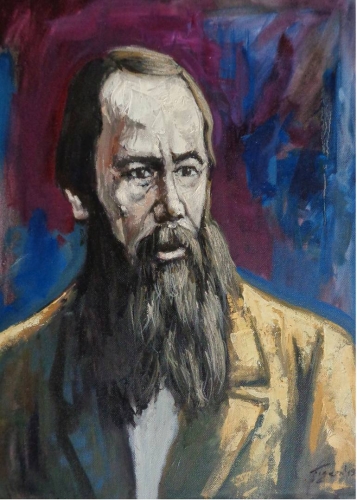
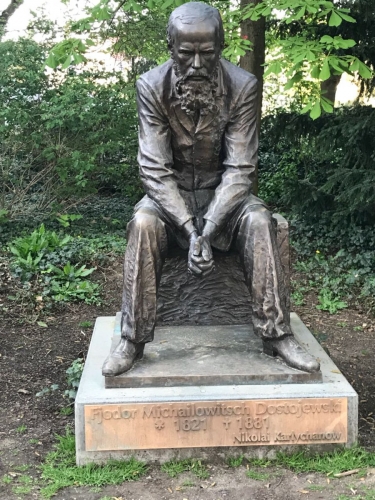
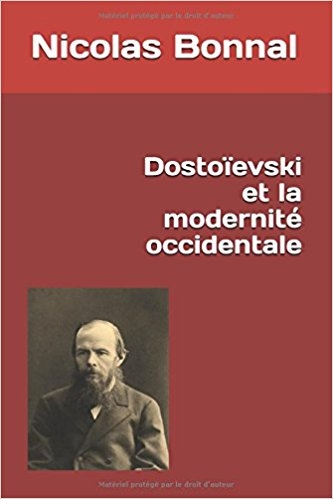 Comme Tocqueville, on prévoit un troupeau bien doux et obéissant :
Comme Tocqueville, on prévoit un troupeau bien doux et obéissant :
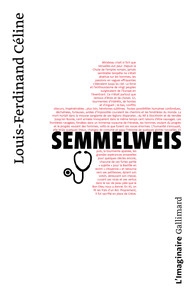 Je n’hésite plus à mettre entre parenthèses tout ce qu’on sait au croit savoir sur l’antisémitisme de Céline, suivant en cela l’exemple de l’homme qui aurait eu le plus de raisons de jeter l’anathème sur lui, George Steiner, un juif bien formé et bien informé qui, au lieu de nier le génie là où il le voyait associé aux passions les plus funestes, s’inclinait devant le mystérieux scandale de leur coexistence dans un même être, sans jamais exclure que, dans les mêmes circonstances , il aurait pu lui-même dériver vers les mêmes excès. Je reviens sur cette question dans un article distinct sur Steiner.
Je n’hésite plus à mettre entre parenthèses tout ce qu’on sait au croit savoir sur l’antisémitisme de Céline, suivant en cela l’exemple de l’homme qui aurait eu le plus de raisons de jeter l’anathème sur lui, George Steiner, un juif bien formé et bien informé qui, au lieu de nier le génie là où il le voyait associé aux passions les plus funestes, s’inclinait devant le mystérieux scandale de leur coexistence dans un même être, sans jamais exclure que, dans les mêmes circonstances , il aurait pu lui-même dériver vers les mêmes excès. Je reviens sur cette question dans un article distinct sur Steiner.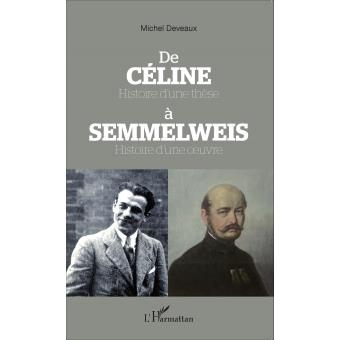 Dans l’hôpital de Vienne où Semmelweis travaillait en tant qu’obstétricien, il y avait deux services de maternité, celui du professeur Bartch et celui du professeur Klin, dont il était l’adjoint. Après avoir éliminé une à une toutes les hypothèses, aussi farfelues les unes que les autres, rassemblées dans la littérature médicale de l’époque, il n’avait plus comme point de départ de son enquête qu’un seul fait : les femmes mouraient plus dans le service de Klin que dans celui de Bartch. Une différence entre les deux sautait aux yeux : dans le pavillon de Bartch le service était rendu par des sages-femmes, dans celui de Klin par des internes. Il a suffi à Semmelweis de signaler ce fait pour se mettre à dos et son patron et bon nombre de ses collègues. Il a en outre exigé avec une insistance incorrecte que les internes se lavent les mains entrant dans le pavillon de Klin; ce dernier, pour qui une telle précaution paraissait dénuée de tout fondement scientifique, le congédia. Les protecteurs de Semmelweis, car il en avait quelques-uns à Vienne, organisèrent pour lui un repos de deux mois à Venise, où il se rendit avec son ami Markusovsky. La merveille ici c’est la façon dont Céline, dans son roman biographique, raconte le séjour de Semmelweis et y voit le prélude à ses découvertes futures.
Dans l’hôpital de Vienne où Semmelweis travaillait en tant qu’obstétricien, il y avait deux services de maternité, celui du professeur Bartch et celui du professeur Klin, dont il était l’adjoint. Après avoir éliminé une à une toutes les hypothèses, aussi farfelues les unes que les autres, rassemblées dans la littérature médicale de l’époque, il n’avait plus comme point de départ de son enquête qu’un seul fait : les femmes mouraient plus dans le service de Klin que dans celui de Bartch. Une différence entre les deux sautait aux yeux : dans le pavillon de Bartch le service était rendu par des sages-femmes, dans celui de Klin par des internes. Il a suffi à Semmelweis de signaler ce fait pour se mettre à dos et son patron et bon nombre de ses collègues. Il a en outre exigé avec une insistance incorrecte que les internes se lavent les mains entrant dans le pavillon de Klin; ce dernier, pour qui une telle précaution paraissait dénuée de tout fondement scientifique, le congédia. Les protecteurs de Semmelweis, car il en avait quelques-uns à Vienne, organisèrent pour lui un repos de deux mois à Venise, où il se rendit avec son ami Markusovsky. La merveille ici c’est la façon dont Céline, dans son roman biographique, raconte le séjour de Semmelweis et y voit le prélude à ses découvertes futures.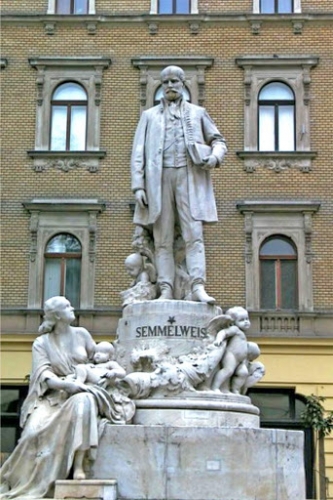

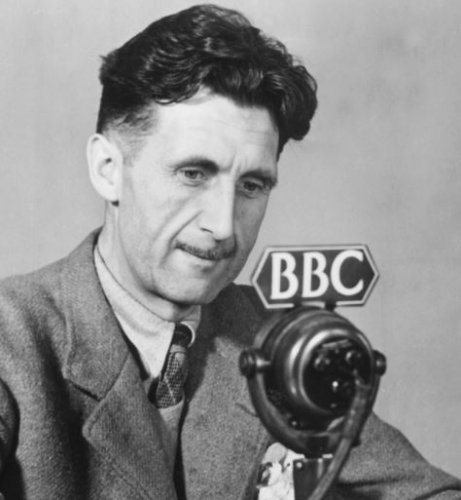
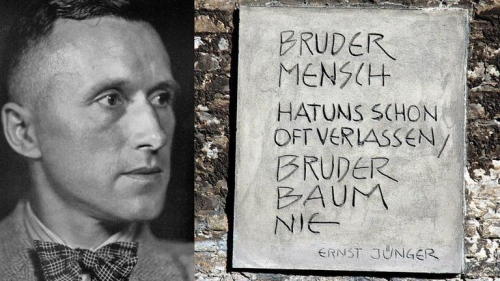

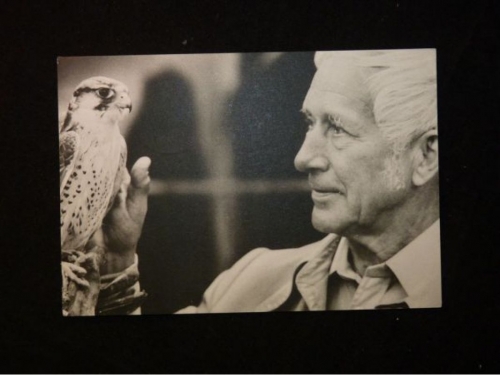
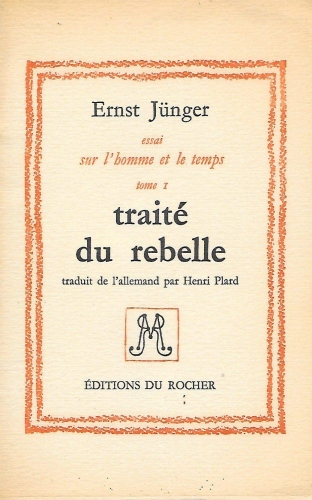 « La peur est l’un des symptômes de notre temps. Elle nous désarme d’autant plus qu’elle succède à une époque de grande liberté individuelle, où la misère même, telle que la décrit Dickens, par exemple, était presque oubliée. »
« La peur est l’un des symptômes de notre temps. Elle nous désarme d’autant plus qu’elle succède à une époque de grande liberté individuelle, où la misère même, telle que la décrit Dickens, par exemple, était presque oubliée. »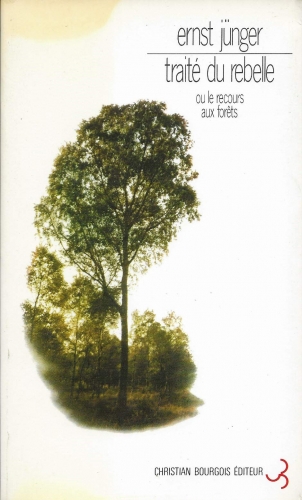 « On assiste à des enchères où l’on dispute s’il vaut mieux fuir, se cacher ou recourir au suicide, et l’on voit des esprits qui, gardant encore toute leur liberté, cherchent déjà par quelles méthodes et quelles ruses ils achèteront la faveur de la crapule, quand elle aura pris le pouvoir. »
« On assiste à des enchères où l’on dispute s’il vaut mieux fuir, se cacher ou recourir au suicide, et l’on voit des esprits qui, gardant encore toute leur liberté, cherchent déjà par quelles méthodes et quelles ruses ils achèteront la faveur de la crapule, quand elle aura pris le pouvoir. »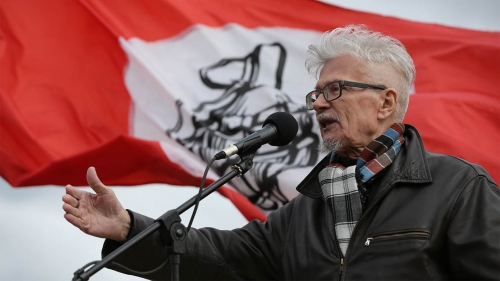
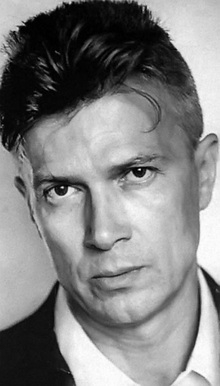 Suite à une affectation paternelle, le garçon grandit dans la ville industrielle de Kharkov aujourd’hui en Ukraine. Ce surdoué fut d’abord « un lecteur assidu, dévorant tout ce qui [lui] tombait sous la main (1) ». Au collège, il joue au garnement insupportable avec des résultats scolaires décevants. À la fin de l’adolescence, il commet des larcins mineurs. Mortifié d’être exempté du service militaire, ce myope ne supporte plus la pesante ambiance sous Khrouchtchev et Brejnev. Incontrôlable et provocateur, il quitte l’Union soviétique en 1974. Quelques plumitifs y ont vu l’indice que derrière une apparente attitude dissidente culturelle et artistique, Limonov aurait été un agent clandestin du KGB au même titre d’ailleurs que l’« arctiviste onanophobe » Piotr Pavlenski…
Suite à une affectation paternelle, le garçon grandit dans la ville industrielle de Kharkov aujourd’hui en Ukraine. Ce surdoué fut d’abord « un lecteur assidu, dévorant tout ce qui [lui] tombait sous la main (1) ». Au collège, il joue au garnement insupportable avec des résultats scolaires décevants. À la fin de l’adolescence, il commet des larcins mineurs. Mortifié d’être exempté du service militaire, ce myope ne supporte plus la pesante ambiance sous Khrouchtchev et Brejnev. Incontrôlable et provocateur, il quitte l’Union soviétique en 1974. Quelques plumitifs y ont vu l’indice que derrière une apparente attitude dissidente culturelle et artistique, Limonov aurait été un agent clandestin du KGB au même titre d’ailleurs que l’« arctiviste onanophobe » Piotr Pavlenski…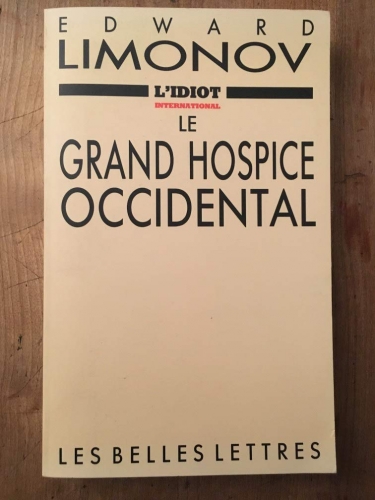
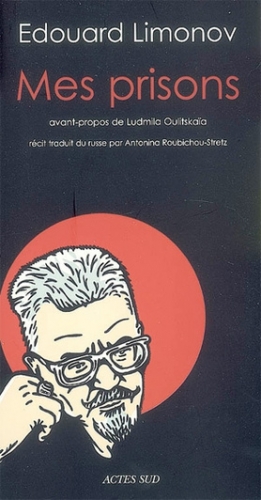 Libéré, Limonov se rapproche de l’opposition libérale anti-Poutine. Il purge alors diverses peines de détention administrative en tant que principal animateur de la contestation en 2010 – 2011. Il se ravise en 2014 et se sépare des libéraux quand le président russe soutient indirectement la révolte de Donetsk et de Lougansk, et annexe la Crimée. Ses livres, Le Vieux (Bartillat, 2015) et Kiev Kaputt, justifient ce surprenant revirement, car « Poutine ne s’est pas réconcilié avec Limonov (9) ». S’il salue la diplomatie du Kremlin, il continue néanmoins à s’opposer au poutinisme intérieur, économique et sociale. Il affirme « être plus radical et plus à droite que le pouvoir dans le domaine de la politique extérieure (10) ». En revanche, « je suis beaucoup plus à gauche que le pouvoir en politique intérieure, poursuit Limonov. J’exige la nationalisation de l’industrie gazière et pétrolière. J’exige la confiscation des biens des grosses fortunes, la privation pour celles-ci de la citoyenneté russe et leur expulsion de Russie (11). »
Libéré, Limonov se rapproche de l’opposition libérale anti-Poutine. Il purge alors diverses peines de détention administrative en tant que principal animateur de la contestation en 2010 – 2011. Il se ravise en 2014 et se sépare des libéraux quand le président russe soutient indirectement la révolte de Donetsk et de Lougansk, et annexe la Crimée. Ses livres, Le Vieux (Bartillat, 2015) et Kiev Kaputt, justifient ce surprenant revirement, car « Poutine ne s’est pas réconcilié avec Limonov (9) ». S’il salue la diplomatie du Kremlin, il continue néanmoins à s’opposer au poutinisme intérieur, économique et sociale. Il affirme « être plus radical et plus à droite que le pouvoir dans le domaine de la politique extérieure (10) ». En revanche, « je suis beaucoup plus à gauche que le pouvoir en politique intérieure, poursuit Limonov. J’exige la nationalisation de l’industrie gazière et pétrolière. J’exige la confiscation des biens des grosses fortunes, la privation pour celles-ci de la citoyenneté russe et leur expulsion de Russie (11). »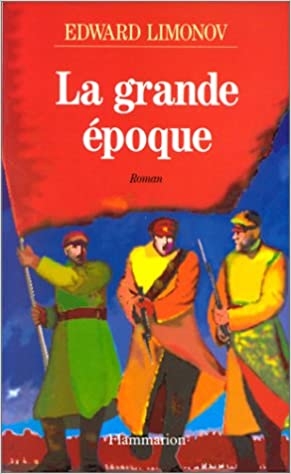 Il confirme à Axel Glydén qu’« en Occident, vous êtes vieux, archaïques et vous allez tous mourir, au sens intellectuel du mot. À force de ressasser le passé, vos cerveaux sont encombrés d’interdits. Et vous allez faire du surplace pendant des siècles. Les intellectuels français sont manichéens. Hantés par le passé, ils sont enfermés dans des dogmes (14) ». Ayant connu la « stagnation » brejnévienne du début des années 1970, Édouard Limonov perçoit une stagnation mortifère qui imprègne à son tour l’Occident.
Il confirme à Axel Glydén qu’« en Occident, vous êtes vieux, archaïques et vous allez tous mourir, au sens intellectuel du mot. À force de ressasser le passé, vos cerveaux sont encombrés d’interdits. Et vous allez faire du surplace pendant des siècles. Les intellectuels français sont manichéens. Hantés par le passé, ils sont enfermés dans des dogmes (14) ». Ayant connu la « stagnation » brejnévienne du début des années 1970, Édouard Limonov perçoit une stagnation mortifère qui imprègne à son tour l’Occident.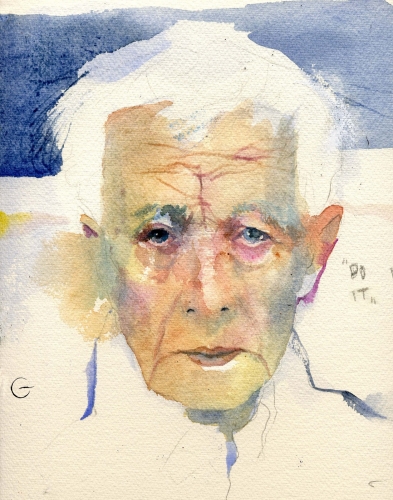
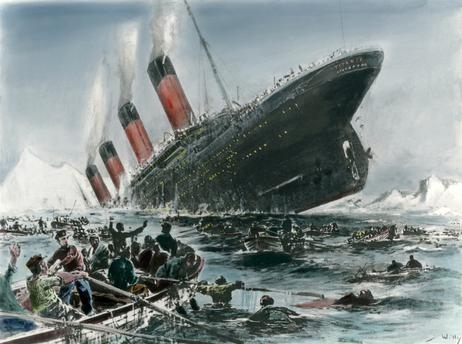
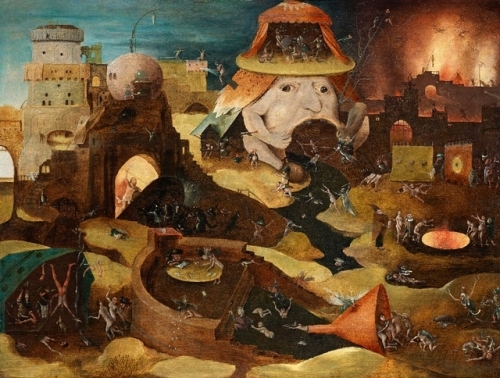
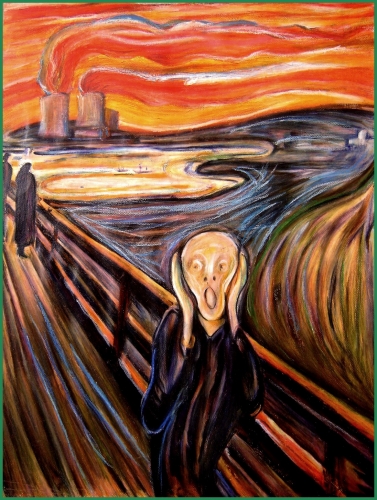
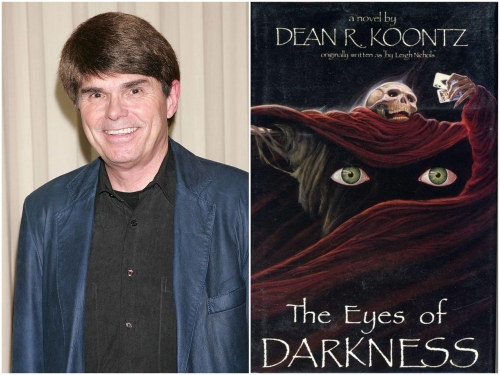
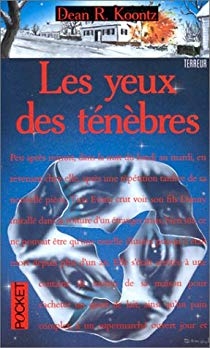 La Chine accuse les États-Unis ! Nous avions déjà la crise sanitaire et la crise économique, voici peut-être une nouvelle crise diplomatique majeure puisqu’un porte-parole du ministère chinois des Affaires étrangères suggère que l’épidémie n’est pas nécessairement accidentelle…et qu’elle provient d’Amérique !
La Chine accuse les États-Unis ! Nous avions déjà la crise sanitaire et la crise économique, voici peut-être une nouvelle crise diplomatique majeure puisqu’un porte-parole du ministère chinois des Affaires étrangères suggère que l’épidémie n’est pas nécessairement accidentelle…et qu’elle provient d’Amérique !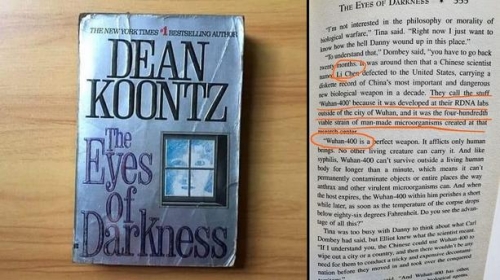
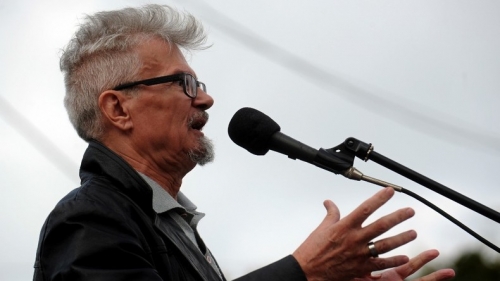
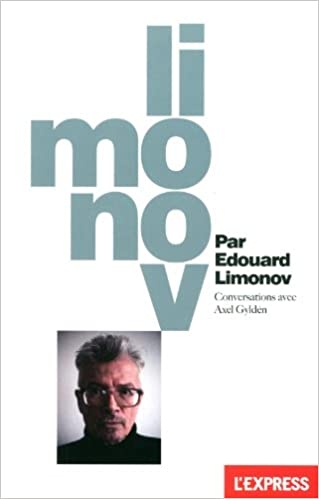 D'une poignée de main ferme, il accueillait les visiteurs sans manières dans son appartement de 100 mètres carrés à la déco minimaliste: quelques chaises, un bureau en formica, un fauteuil en skaï et, sur les murs gris, trois ou quatre photos où l'on reconnaissait le maître des lieux, pour la plupart des clichés pris à Paris, dans le Marais, où il avait vécu au début des années 1980, et devant Notre-Dame.
D'une poignée de main ferme, il accueillait les visiteurs sans manières dans son appartement de 100 mètres carrés à la déco minimaliste: quelques chaises, un bureau en formica, un fauteuil en skaï et, sur les murs gris, trois ou quatre photos où l'on reconnaissait le maître des lieux, pour la plupart des clichés pris à Paris, dans le Marais, où il avait vécu au début des années 1980, et devant Notre-Dame. 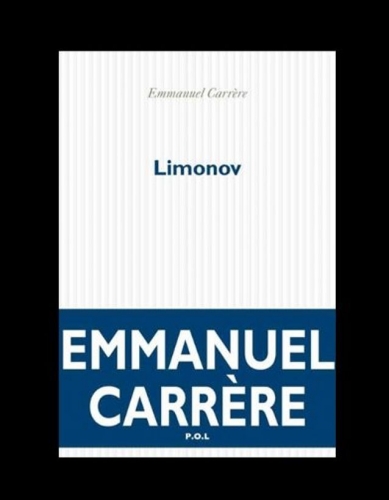 Cette manière de parler peut être déstabilisante. Elle est aussi rafraîchissante. Car, au moins les propos de Limonov procédaient-ils d'une pensée réellement personnelle, hors sol et hors cadre, qui a le mérite d'interroger les certitudes. Tout en l'écoutant énoncer ses vérités dégoupillées, il fallait toujours se demander si elles étaient à prendre au second ou au troisième degré. Tout bien réfléchi, c'était au premier.
Cette manière de parler peut être déstabilisante. Elle est aussi rafraîchissante. Car, au moins les propos de Limonov procédaient-ils d'une pensée réellement personnelle, hors sol et hors cadre, qui a le mérite d'interroger les certitudes. Tout en l'écoutant énoncer ses vérités dégoupillées, il fallait toujours se demander si elles étaient à prendre au second ou au troisième degré. Tout bien réfléchi, c'était au premier. 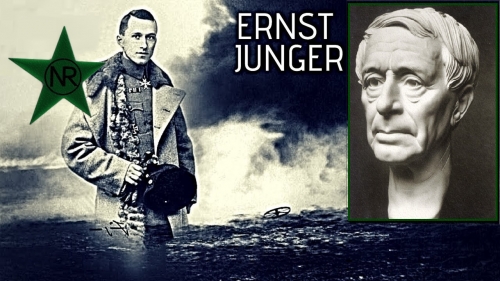
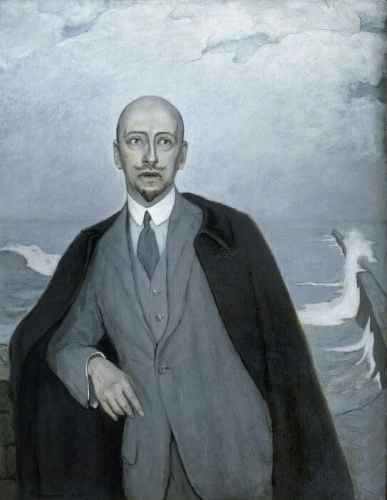
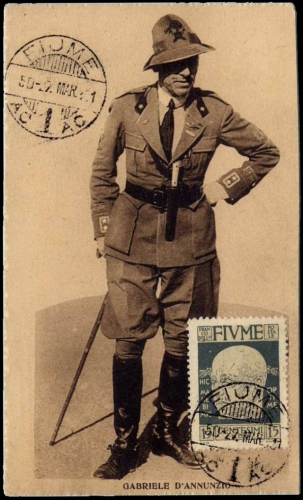
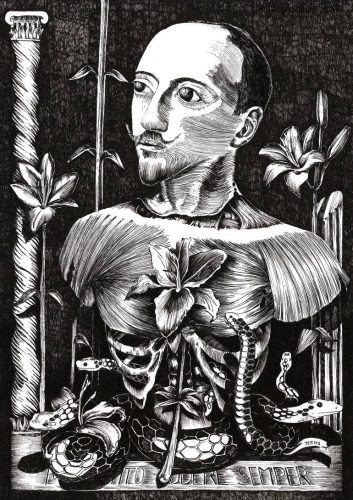
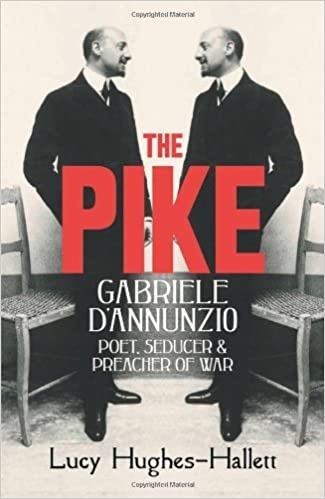 In her 2013 biography of d’Annunzio,
In her 2013 biography of d’Annunzio, 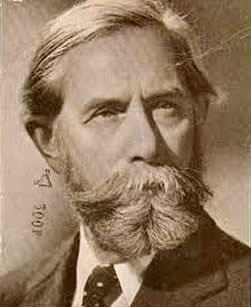
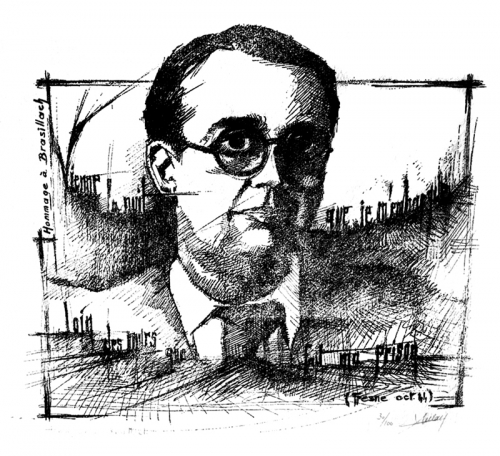
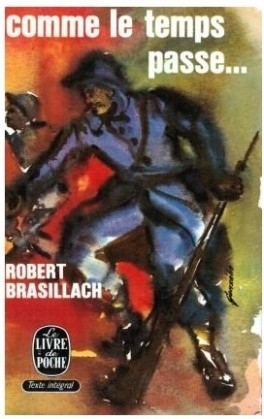
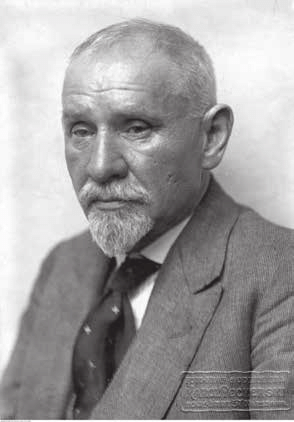
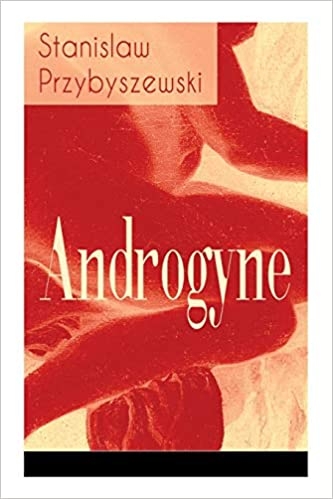 He earned fame in Berlin, where he became a hero of the international artistic community. It was in Berlin that he published his resonant essay "Zur Psychologie des Individuums. I - Chopin und Nietzsche. II - Ola Hansson" 1892 as well as poems Totenmesse, 1895 (Polish version: Requiem aeternam, 1904), Vigilien, 1895 (Polish version: Z cyklu wigilii, 1899), De profundis, 1895 (Polish version 1900), Androgyne, 1900. They introduced themes which would be central to all of his work: individualism, the metaphysical and social status of creative individuals, fate of geniuses, the sense of such attributes of genius as "degeneration" and "illness". He continued to present his philosophical views in essays published in a number of magazines and later collected in the volumes "Auf den Wegen der Seele" 1897 ("Na drogach duszy" [On the Paths of the Soul], 1900), "Szlakiem duszy polskiej" [On the Paths of the Polish Soul], 1917, "Ekspresjonizm, Słowacki i Genesis z ducha" [Expressionism, Slowacki and Genesis from the Spirit], 1918.
He earned fame in Berlin, where he became a hero of the international artistic community. It was in Berlin that he published his resonant essay "Zur Psychologie des Individuums. I - Chopin und Nietzsche. II - Ola Hansson" 1892 as well as poems Totenmesse, 1895 (Polish version: Requiem aeternam, 1904), Vigilien, 1895 (Polish version: Z cyklu wigilii, 1899), De profundis, 1895 (Polish version 1900), Androgyne, 1900. They introduced themes which would be central to all of his work: individualism, the metaphysical and social status of creative individuals, fate of geniuses, the sense of such attributes of genius as "degeneration" and "illness". He continued to present his philosophical views in essays published in a number of magazines and later collected in the volumes "Auf den Wegen der Seele" 1897 ("Na drogach duszy" [On the Paths of the Soul], 1900), "Szlakiem duszy polskiej" [On the Paths of the Polish Soul], 1917, "Ekspresjonizm, Słowacki i Genesis z ducha" [Expressionism, Slowacki and Genesis from the Spirit], 1918.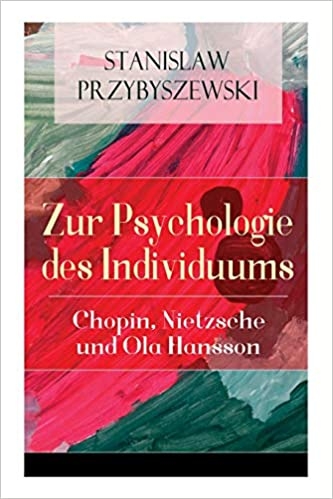 Przybyszewski translated the philosophical issues raised in his essays and narrative poems into the language of literary prose and drama. A very prolific writer, he published many novels, all of them trilogies, in German and Polish, notably Homo Sapiens, German edition 1895-96, Polish edition. 1901; Satans Kinder, 1897; Synowie ziemi [Sons of the Earth], 1904-11; Dzieci nędzy [Children of Poverty], 1913-14; Krzyk [The Cry], 1917; Il Regno Doloroso, 1924. All of his novels had basically the same type of protagonists, i.e. outstanding individuals destroyed by the social world and by their internal demons. These doomed characters were presented in extreme, frequently pathological, emotional states of alcoholism, jealousy, destructive love. The plots were weak and served as a pretext to analyze the characters' internal states. This new type of the protagonist required appropriate narration techniques that were different from those used in realistic novels. Przybyszewski made innovative use of (seemingly) indirect speech and of internal monologue.
Przybyszewski translated the philosophical issues raised in his essays and narrative poems into the language of literary prose and drama. A very prolific writer, he published many novels, all of them trilogies, in German and Polish, notably Homo Sapiens, German edition 1895-96, Polish edition. 1901; Satans Kinder, 1897; Synowie ziemi [Sons of the Earth], 1904-11; Dzieci nędzy [Children of Poverty], 1913-14; Krzyk [The Cry], 1917; Il Regno Doloroso, 1924. All of his novels had basically the same type of protagonists, i.e. outstanding individuals destroyed by the social world and by their internal demons. These doomed characters were presented in extreme, frequently pathological, emotional states of alcoholism, jealousy, destructive love. The plots were weak and served as a pretext to analyze the characters' internal states. This new type of the protagonist required appropriate narration techniques that were different from those used in realistic novels. Przybyszewski made innovative use of (seemingly) indirect speech and of internal monologue.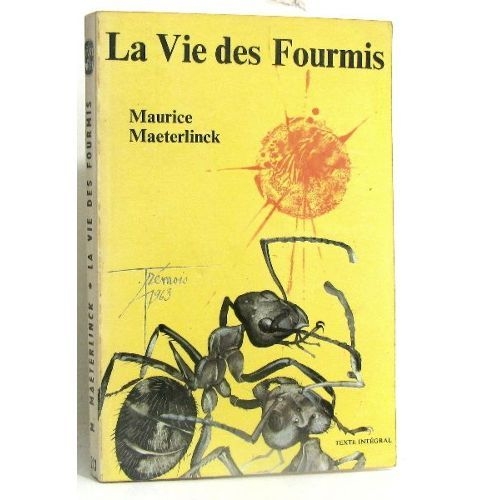
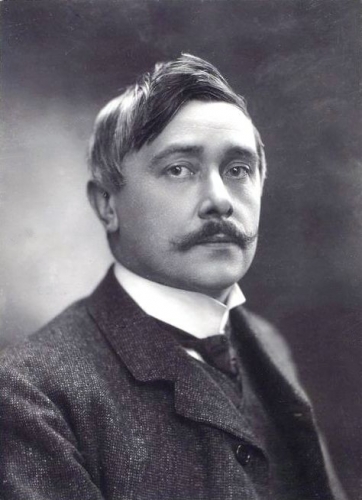 La fourmilière est peuplée par des reines, des femelles fécondées, vivant une douzaine d’années, d’innombrables cohortes d’ouvriers (ou ouvrières ) asexués vivant trois ou quatre ans et de quelques centaines de mâles qui disparaissent au bout de cinq à six semaines. Dans une fourmilière peuvent cohabiter plusieurs colonies avec plusieurs reines et même parfois différentes espèces en plus ou moins bonne harmonie. La fourmilière héberge aussi une quantité de parasites, l’auteur écrit qu’on en comptait, au moment de la rédaction de son ouvrage, « plus de deux milles espèces, et d’incessantes découvertes accroissent journellement ce nombre ». Je n’ai pas eu la curiosité de vérifier cette donnée auprès d’autres sources, la vie et l’histoire de ce monde en miniature sont pourtant fascinantes et permettent de formuler moult élucubrations plus ou moins fantaisistes mais, pour certaines, tout à fait plausibles. L’auteur s’est penché sur cette vie grouillante et pourtant très organisée qui peut évoquer l’humanité à une échelle réduite et peut-être même dotée d’une intelligence au moins comparable. C’est là un vaste champ d’investigation, de réflexion, d’imagination et de recherche qui ne sera sans doute jamais exploré jusqu’à ses ultimes limites.
La fourmilière est peuplée par des reines, des femelles fécondées, vivant une douzaine d’années, d’innombrables cohortes d’ouvriers (ou ouvrières ) asexués vivant trois ou quatre ans et de quelques centaines de mâles qui disparaissent au bout de cinq à six semaines. Dans une fourmilière peuvent cohabiter plusieurs colonies avec plusieurs reines et même parfois différentes espèces en plus ou moins bonne harmonie. La fourmilière héberge aussi une quantité de parasites, l’auteur écrit qu’on en comptait, au moment de la rédaction de son ouvrage, « plus de deux milles espèces, et d’incessantes découvertes accroissent journellement ce nombre ». Je n’ai pas eu la curiosité de vérifier cette donnée auprès d’autres sources, la vie et l’histoire de ce monde en miniature sont pourtant fascinantes et permettent de formuler moult élucubrations plus ou moins fantaisistes mais, pour certaines, tout à fait plausibles. L’auteur s’est penché sur cette vie grouillante et pourtant très organisée qui peut évoquer l’humanité à une échelle réduite et peut-être même dotée d’une intelligence au moins comparable. C’est là un vaste champ d’investigation, de réflexion, d’imagination et de recherche qui ne sera sans doute jamais exploré jusqu’à ses ultimes limites.
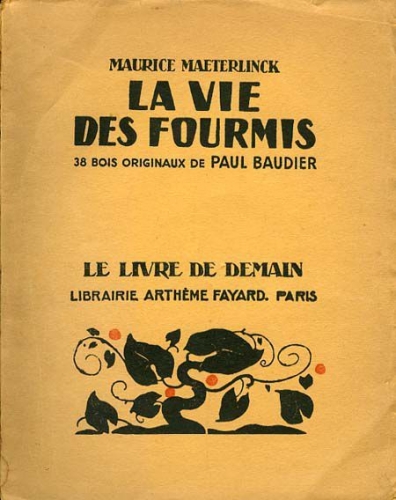
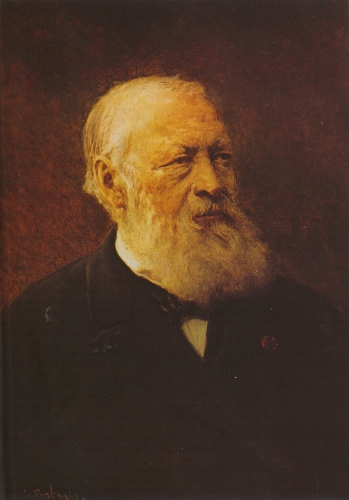
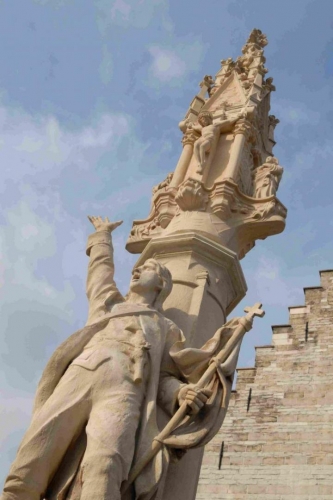
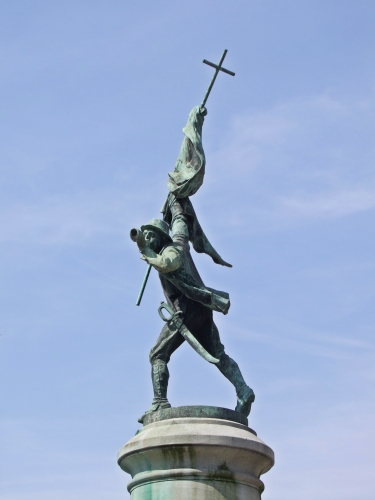
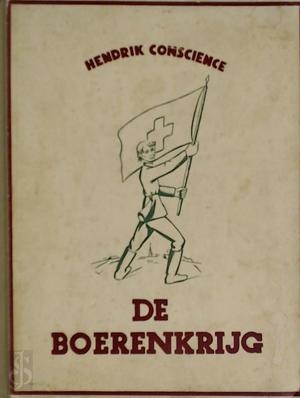 Ceci posé, le lecteur du récit ne peut manquer d’être frappé par le soin qui y a été mis à casser les stéréotypes et autres images d’Epinal. Le meneur de l’insurrection à Waldeghem, Bruno Halinx, n’a rien du fruste campagnard qu’on serait tenté de se représenter dans ce rôle. Fils du notaire de la localité, il a pu bénéficier d’un enseignement de qualité à l’école latine des augustins d’Anvers. Le futur héros est raffiné, quelque peu efféminé même, au point que le début de l’œuvre ressemble à un roman d’apprentissage, où la force des circonstances transforme un homme peu viril en chef intrépide.
Ceci posé, le lecteur du récit ne peut manquer d’être frappé par le soin qui y a été mis à casser les stéréotypes et autres images d’Epinal. Le meneur de l’insurrection à Waldeghem, Bruno Halinx, n’a rien du fruste campagnard qu’on serait tenté de se représenter dans ce rôle. Fils du notaire de la localité, il a pu bénéficier d’un enseignement de qualité à l’école latine des augustins d’Anvers. Le futur héros est raffiné, quelque peu efféminé même, au point que le début de l’œuvre ressemble à un roman d’apprentissage, où la force des circonstances transforme un homme peu viril en chef intrépide. 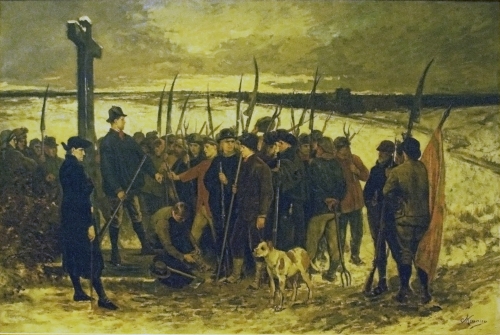
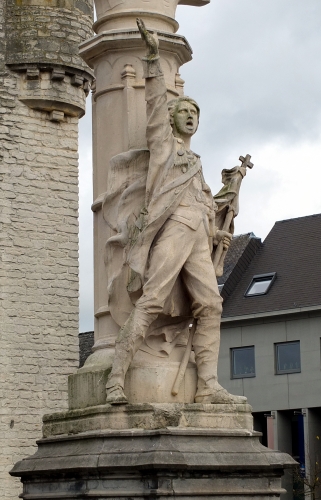
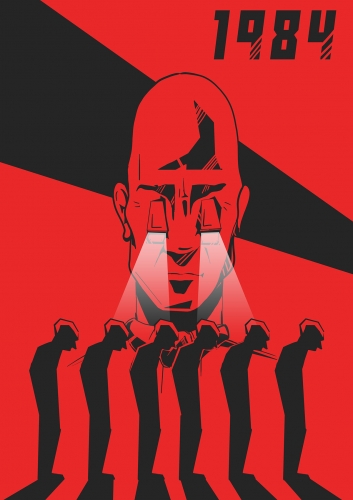
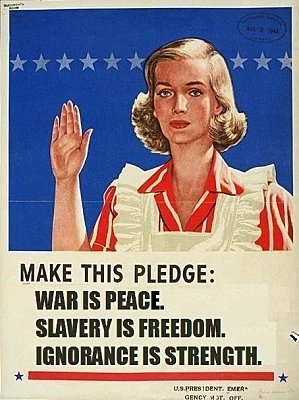 La Novlangue
La Novlangue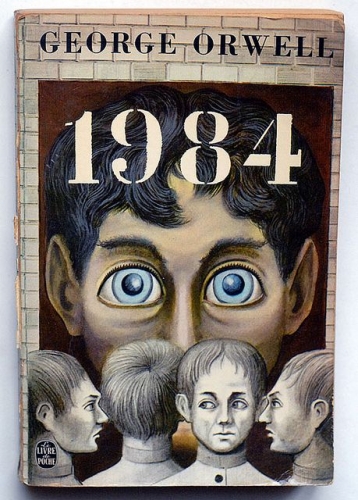
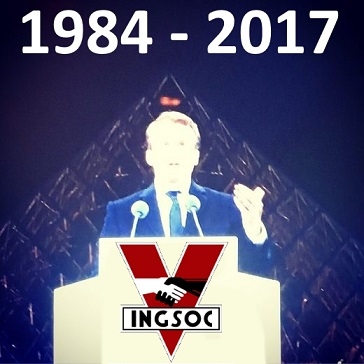
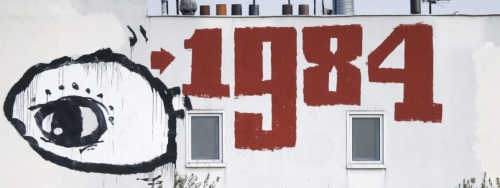
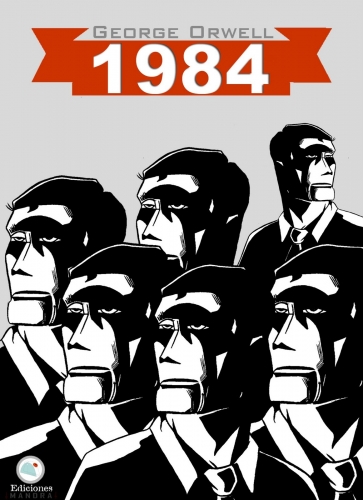 Conclusion
Conclusion